Earlhamite
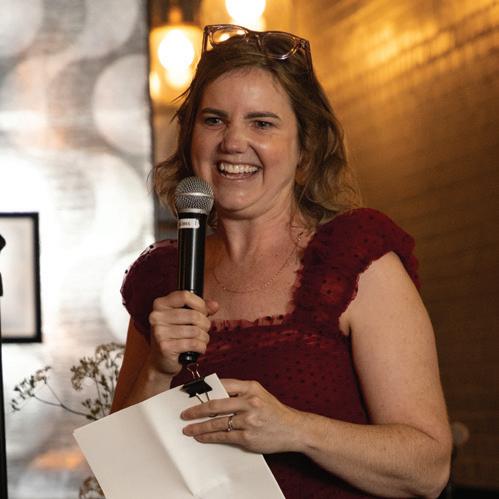

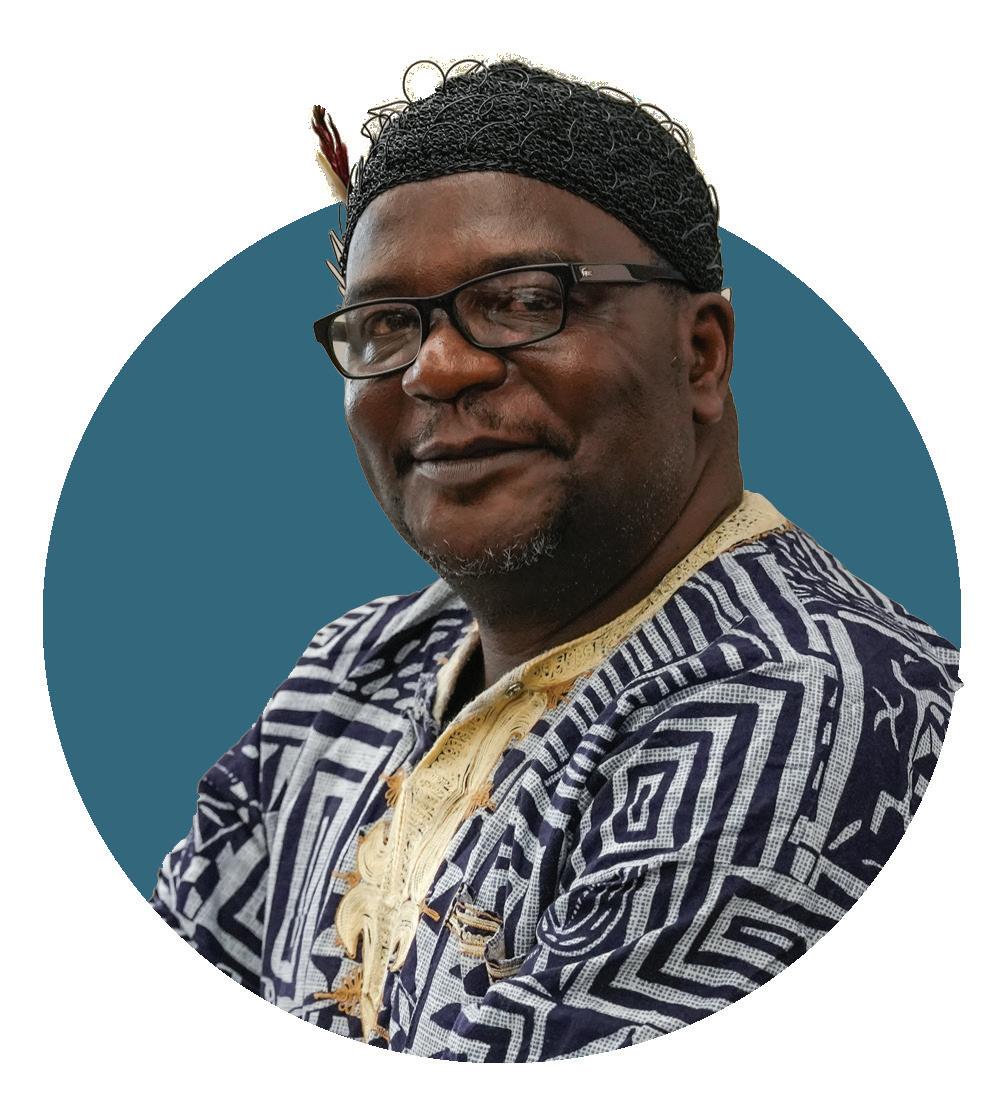
ROOTED IN EXCELLENCE
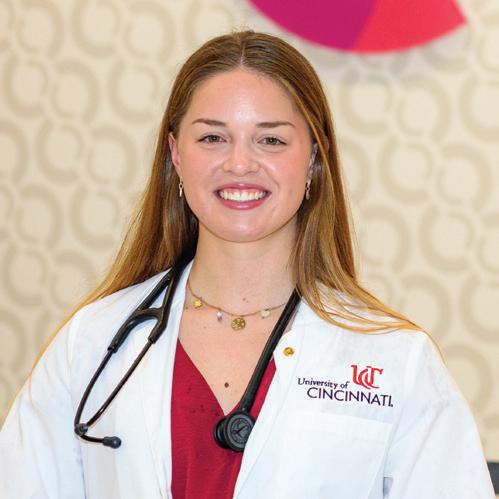
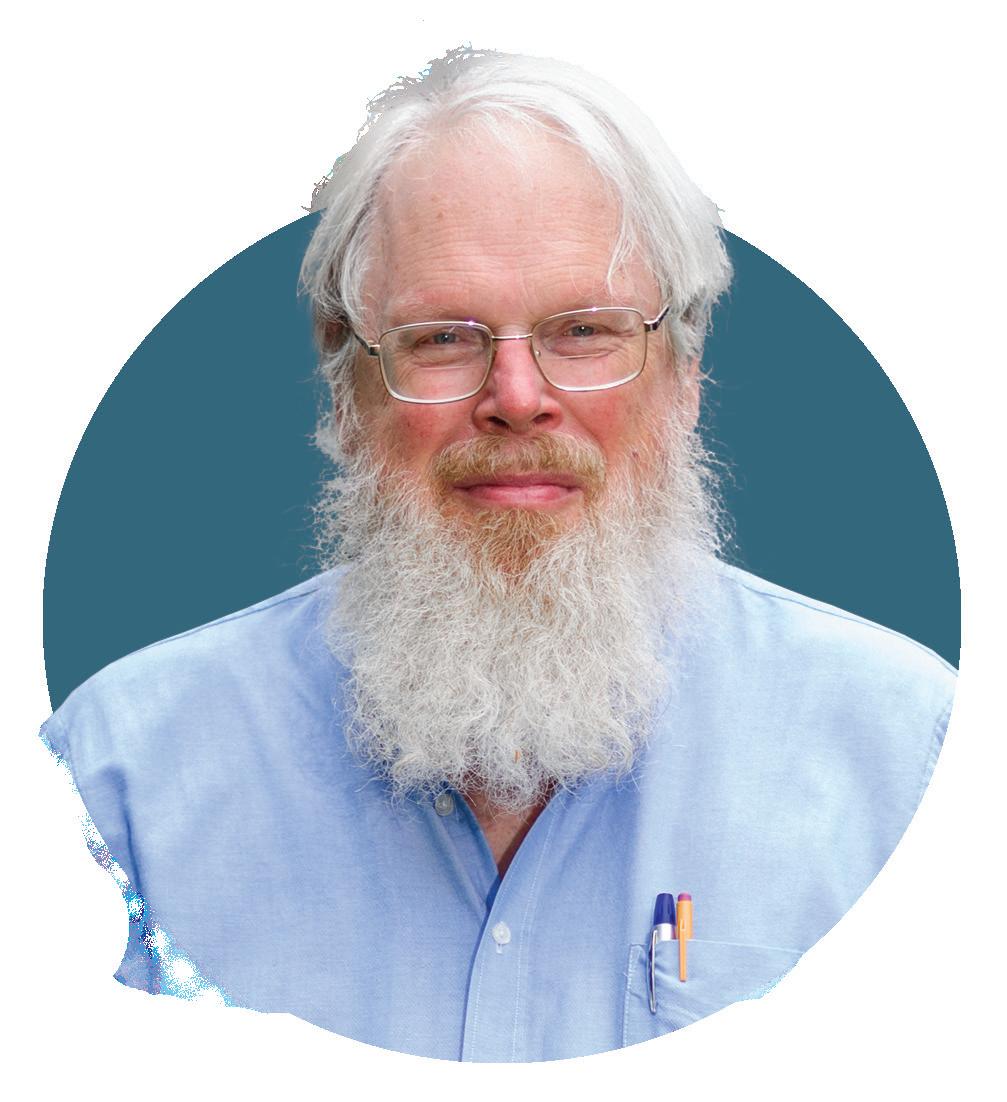
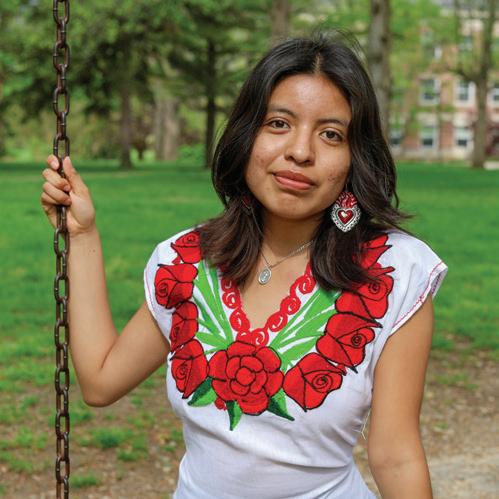


Trés bien!
Immersion in French led Olivia Ramsey ’00 to become an educator and community leader.
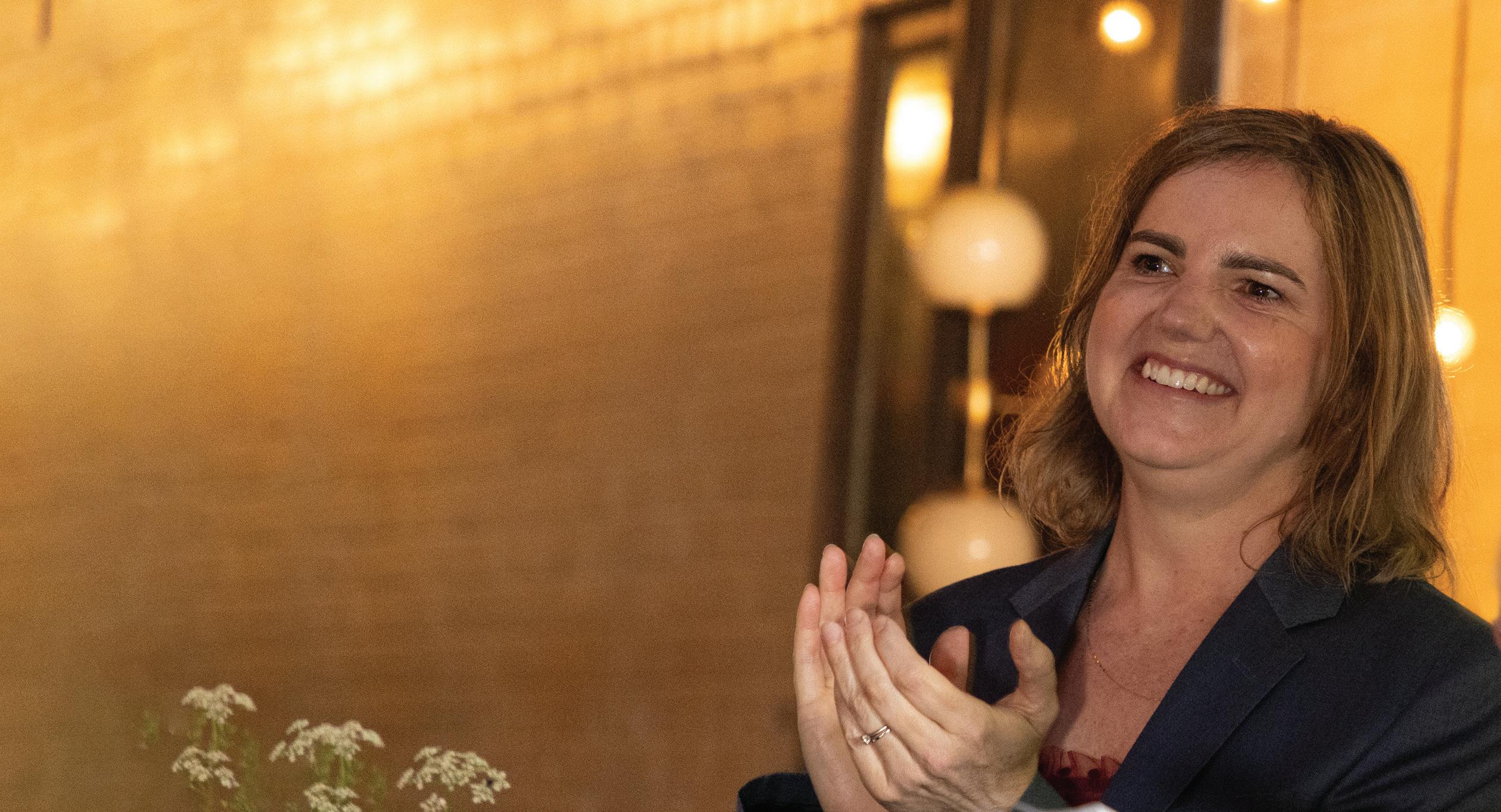
Top of the class
Four Earlham faculty members lead the way to academic excellence.
“I consistently and persistently nurture my students towards finding their own voice during their academic sojourn at Earlham College. This is particularly the case for those intending to pursue an academic career, where finding and sustaining a niche requires passion in the context of other major determining factors.”
— Womai Song, director and associate professor of the African and African American Studies Program
High ranking
For generations, Earlham College has stood out as one of the nation’s truly distinctive institutions — and the experts agree.
“Earlham students graduate ready to take on the world, thanks to the school’s cooperative, can-do spirit, international perspective and caring student/faculty community — and its commitment to a values-oriented education.”
— Excerpt from the Fiske Guide to Colleges, 2025 edition
Pre-med matters
Find out why Earlham’s acceptance rate for medical school is nearly twice the national average.
“We want to create health professionals who are people centered and have taken advantage of the liberal arts education, who understand empathy and compassion, and what it takes to interact with people who are unlike them in different ways.”
— Peter Blair, biology professor and Center for Global Health director
Earlhamite
The magazine of Earlham College
EDITOR
Alicia Anstead
CLASS NOTES EDITOR
Cooper Cox
DESIGNERS
Liz Johnson
Sara Misak
MANAGING EDITOR
Brian Zimmerman
WRITERS
Jay Kibble
Kelsey Mackey
VICE PRESIDENT FOR ENROLLMENT MANAGEMENT, MARKETING, AND COMMUNICATIONS
Jeffrey Perkins ‘94
Read the latest alumni profiles, submit class notes, check out upcoming events and more at earlham.edu/alumni.
Earlhamite magazine is the oldest college alumni magazine in continuous publication in the United States. Today it is published twice yearly and continues to follow the statement of purpose that has guided it since its 1873 founding: “a regular messenger going out and bearing tidings of prosperity and vicissitudes of Earlham to its friends and supporters, and bringing all associated here into communication with one another.”
Opinions expressed in the magazine are those of its contributors and do not necessarily represent the views of the editors or the official position of Earlham College.
Send story ideas to earlhamite@earlham.edu
Send class notes, obituaries and address changes to alums@earlham.edu
Please recycle after reading. Paper for the Earlhamite is printed from 10% recycled fiber and is FSC and PEFC certified.
©2025 Earlham College.
PRESIDENT’S MESSAGE
Decades ago, when I was a violin teacher, I would sometimes spend an entire one-hour lesson with a student on how to practice and perfect playing a three-octave scale — a standard daily exercise for an advanced violinist. I tried to pass on the lessons I had been told by my own teachers about excellent scale-playing: every note should be perfectly centered in tone, perfectly in tune, exactly the same volume and exactly the same duration; shifts of the bow across the four strings should be seen but not heard; shifts of the left hand up and down the fingerboard should be smooth, quick and not detectable by the listener. All this amounts to an almost unattainable ideal (believe me, I know!) but striving for it daily enables beauty in performance.
Though excellence in other human endeavors may not always be so easy to define, we tend to know it when we see it. Excellence is the basis for our confidence when an outstanding physician takes care of us, our excitement when we watch great actors, musicians and athletes perform, our sense of anticipation when we open a book that has received rave reviews. Trust in excellence undergirds our belief that cherished institutions such as universities, colleges and charitable foundations are serving the greater good of the world.
Here at Earlham, we are known for the distinctive excellence of our teaching and for our Quaker-based dedication to collectively cultivating the “teacher within.” Earlham’s academic rigor prepares our students for lives of achievement in demanding and rewarding careers. For example, the acceptance rate of Earlham appli-

cants to medical school is nearly twice the national average. But an Earlham education is far more. The humane teacher within who is awakened at Earlham graduates and goes out into the world to help others learn and grow, to build community and to make a better life for all.
In this issue of Earlhamite, we celebrate the excellence of our graduates and the well-earned distinction they bring to Earlham. You’ll meet faculty who help students expand their thinking and chart bold paths, as well as aspiring health professionals shaped by world-class mentors and a supportive network of alums.
I hope these stories remind you — as they do me — of the deep wellspring of excellence that defines this community. It is an honor to be part of a place where such excellence is pursued with purpose and shared generously with the world.
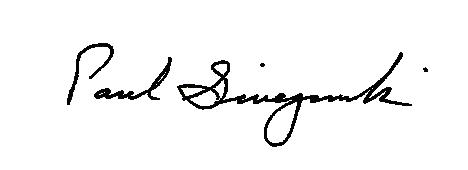
Paul Sniegowski President, Earlham College and Earlham School of Religion
National grant elevates scientific research
Lexie Kuzmishin Nagy, assistant professor of biochemistry at Earlham, is using a $458,575 National Science Foundation grant this year to elevate student research and scientific discovery. Her lab explores how bacteria sense and respond to their environment — work with real-world applications in antibiotics, agriculture and biosecurity. The grant enhances Earlham’s research infrastructure with new equipment such as a shaking incubator, allowing students to simulate natural environments and explore bacterial behavior under various conditions. Four undergraduates will conduct research over three summers and present findings at the prestigious Rustbelt RNA Meeting, gaining the type of hands-on experience that can shape scientific careers.
This is one of two major research projects supported by Kuzmishin Nagy during the summer of 2025. Under Kuzmishin Nagy’s mentorship, a second group of students is piloting a new experimental setup using E. coli — a lab-friendly stand-in for Rhodopseudomonas palustris, a complex soil-dwelling bacterium — that will inform the work of the NSF research team next summer. That research is supported by the college’s summer collaborative research program and the Gerald Bakker Collaborative Research Endowment Fund.
Beyond the lab, Kuzmishin Nagy is collaborating with Earlham’s Joseph Moore Museum to create interactive exhibits and escape rooms that translate complex research into engaging community learning. Her work is expanding the college’s scientific capacity while giving students the tools, mentorship and exposure to grow as researchers and future leaders in science. ■
Photo by Josh Smith
Acknowledgment: Lexie Kuzmishin Nagy’s research is supported by the U.S. National Science Foundation through a Building Research Capacity in New Faculty in Biology Award, No. 2437568.
Disclaimer: Any opinions, findings and conclusions or recommendations expressed in this material are those of the author(s) and do not necessarily reflect the views of the National Science Foundation.

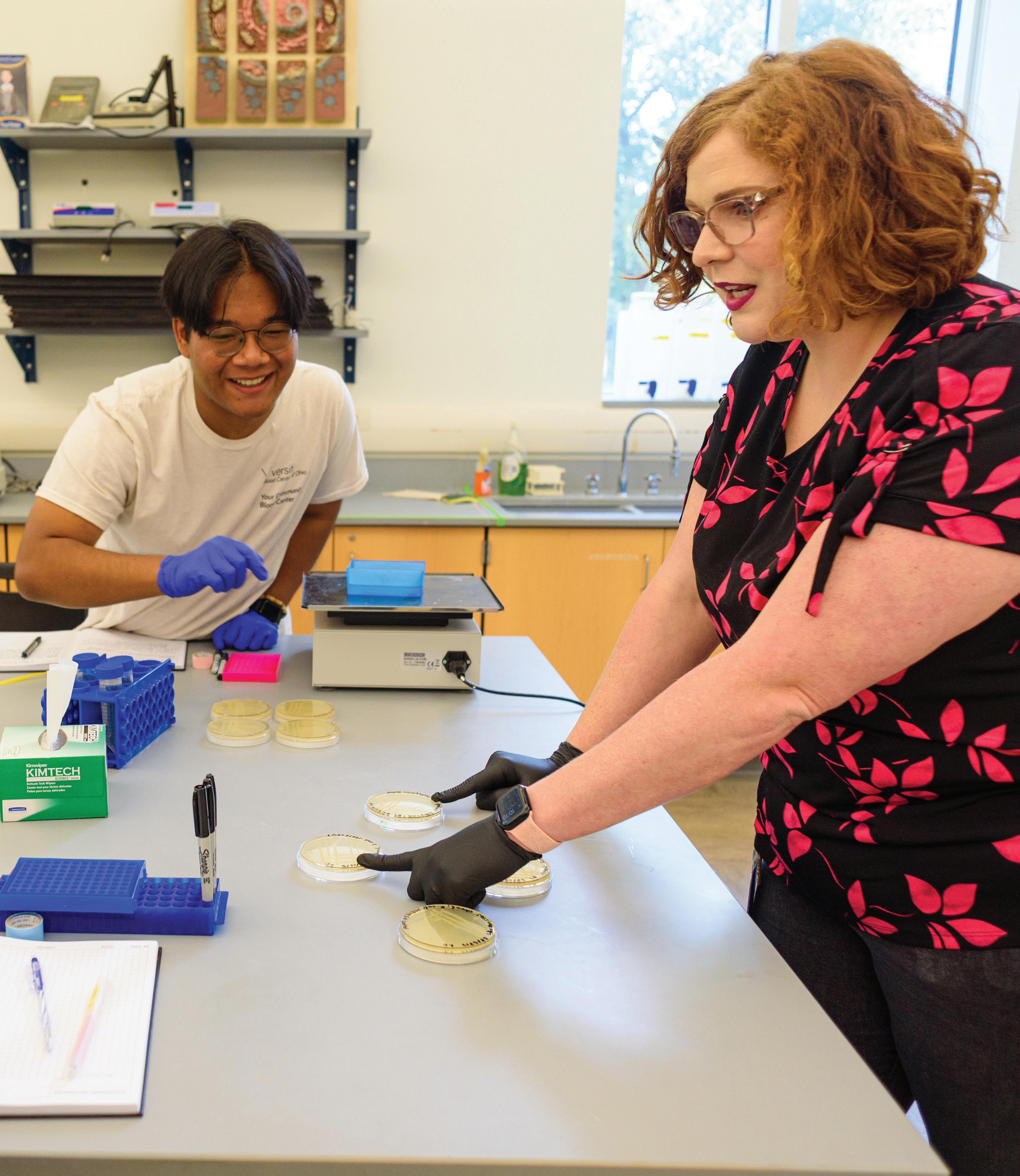
Professor Lexie Kuzmishin Nagy, right, works in the lab with students Dawt Sang, center, and Vy Nguyen, to grow bacteria as part of a summer collaborative research project on campus. Their work is contributing to a multi-year National Science Foundation grant awarded to Kuzmishin Nagy earlier this year.
Revitalizing Runyan: A Gift Rooted in the 1970s
Jeff May ’75 and Karen Crossen ’76 made a $1 million gift to Earlham to restore the vibrancy of Runyan Center — the same space where their shared Earlham experience began more than 50 years ago.
Their gift will transform Runyan’s courtyard, entryways and add a new outdoor deck providing more opportunities for students to gather and connect. The renovations aim to recapture the energy of the 1970s, when Runyan served as a social hub for campus life.
“Runyan was the center of our non-academic lives on campus,” May said. “You’d share a meal, stop by the mailroom, go bowling in the basement, hang out at the coffee shop or catch a movie or student performance at Wilkinson Theater. There was always something going on. There was so much energy — it brought people together.”
“First impressions matter,” Crossen said. “When students and parents walk into Runyan, we want them to feel welcome — like this is a place full of life, opportunity and connection.”
Construction began this summer and is expected to be complete this fall. The updates will offer more seating, shade and new landscaping, all designed to make Runyan a more welcoming and dynamic campus space.
The couple previously funded the May-Crossen Student Commons and endowed scholarships in 2015. This latest gift is another expression of their gratitude to Earlham — and their belief in the importance of creating community spaces where students can thrive. ■
Story by Brian Zimmerman Portrait courtesy of Jeff May and Karen Crossen.
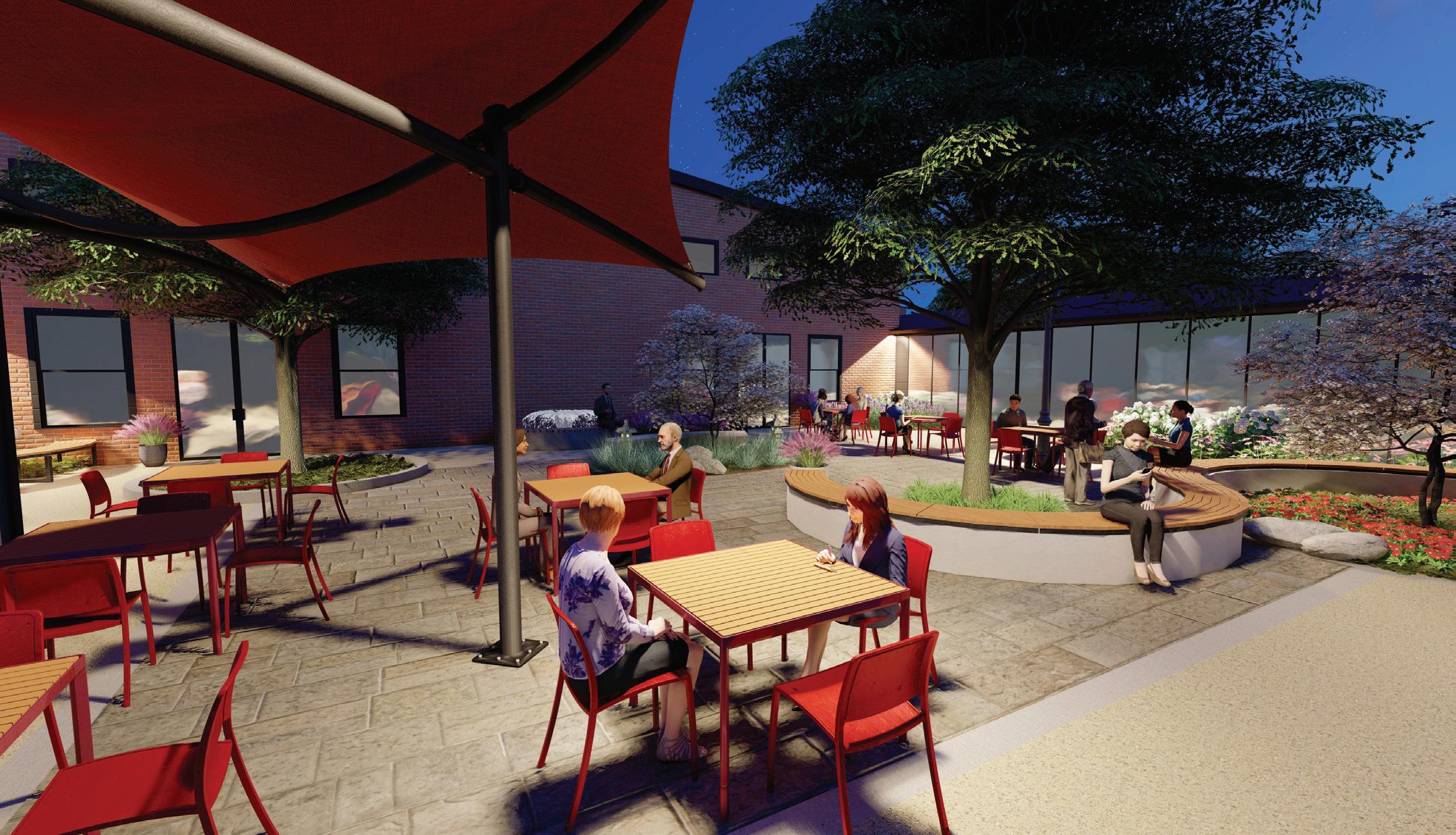
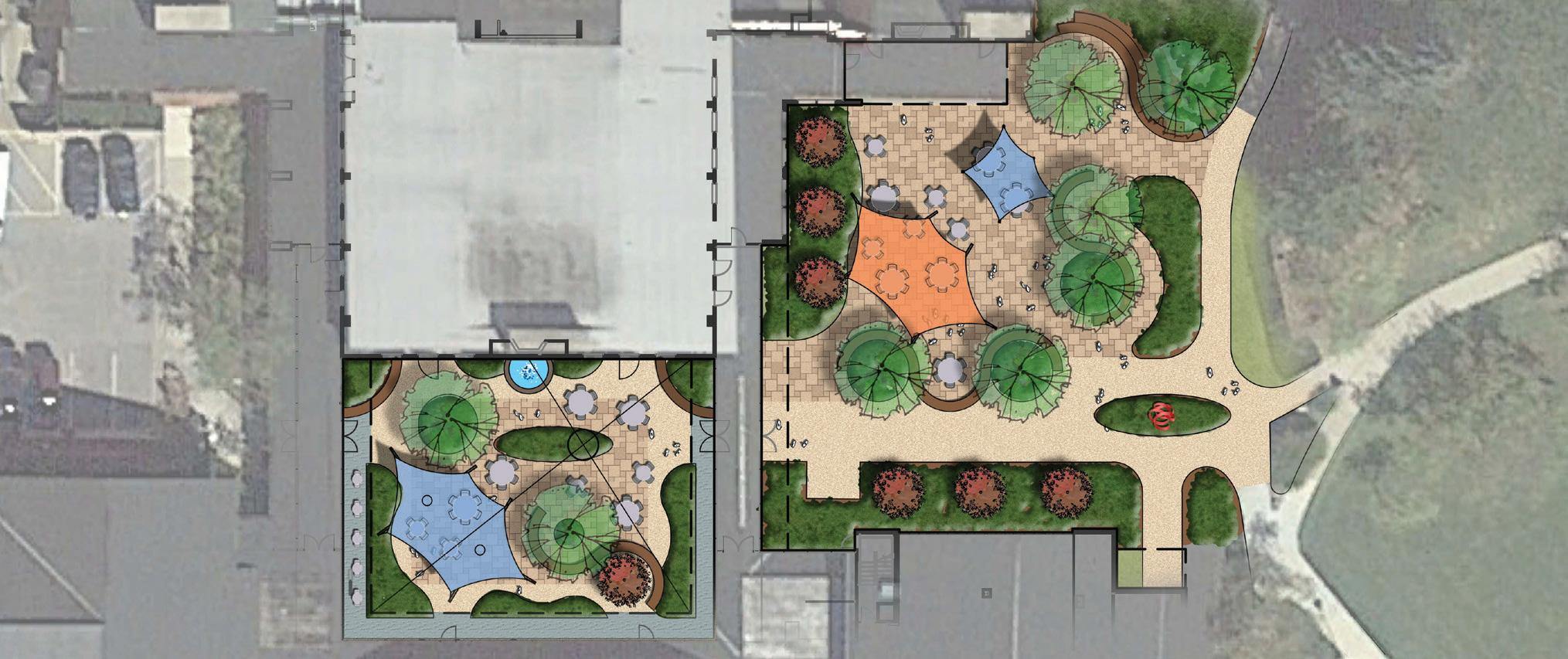
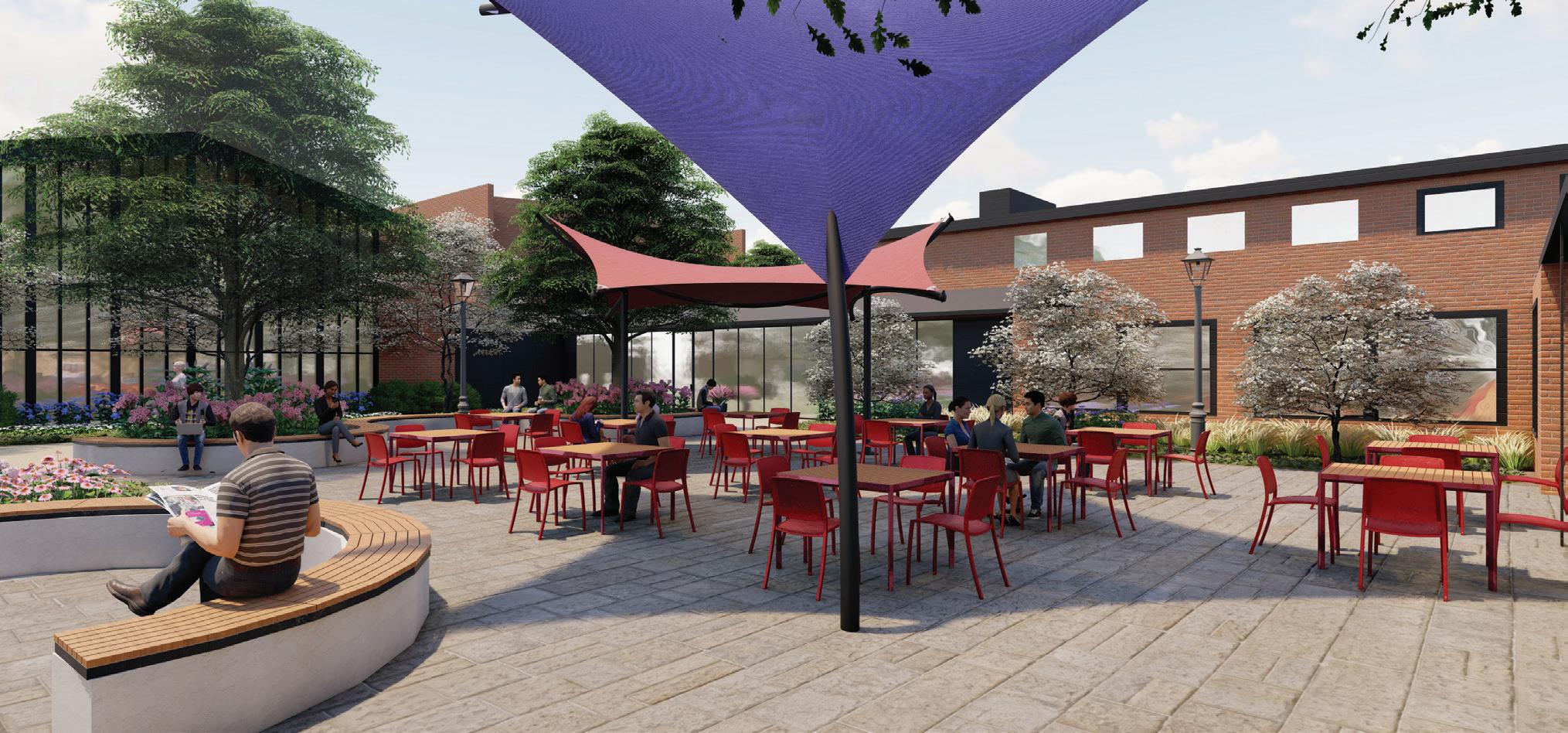
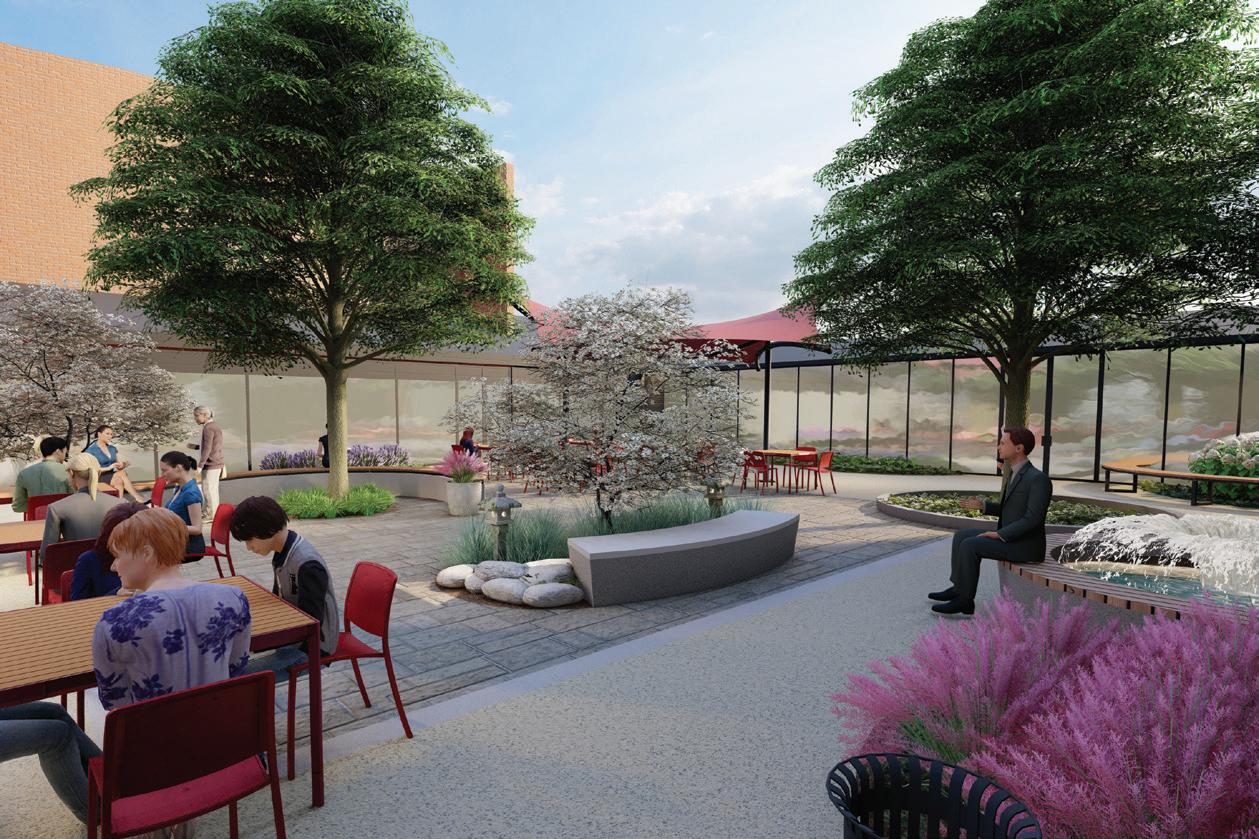
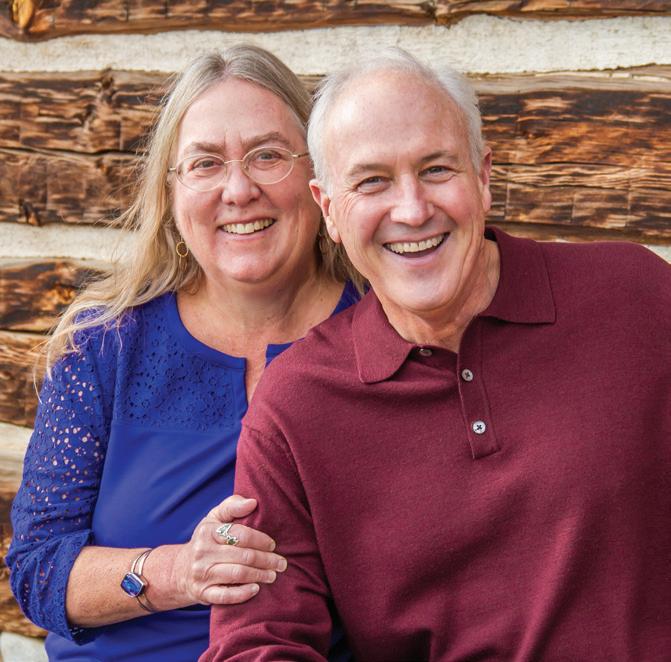
“When students and parents walk into Runyan, we want them to feel welcome — like this is a place full of life, opportunity and connection.”
— JEFF MAY ’75
Rohin Ullberg ‘86 funding student-led innovations in environmental research
Earlham students Momoko Nakata ’26 and Jenny Yakarta Perez Alejandres ’28 were named the first recipients of the Earlham-Ullberg Prize for Environmental Innovation, a new $12,000 award supporting socially driven, globally focused environmental research.
Nakata and Alejandres each spent at least eight weeks abroad in summer 2025 pursuing hands-on projects that challenged global inequities in food systems and fashion.
Inspired by her Japanese heritage and the colonial histories embedded in food culture, Nakata traveled to Thailand and Japan to explore traditional East Asian food systems and their potential to inform more sustainable, equitable models.
Alejandres, whose passion for fashion began with a challenge to turn a thrifted dress into a prom gown, studied biodegradable textiles and Indigenous design practices in Colombia. Her long-term vision includes launching a sustainable clothing brand that uplifts garment workers and honors ancestral knowledge through eco-conscious design.
Jenny ta Perez Alejand
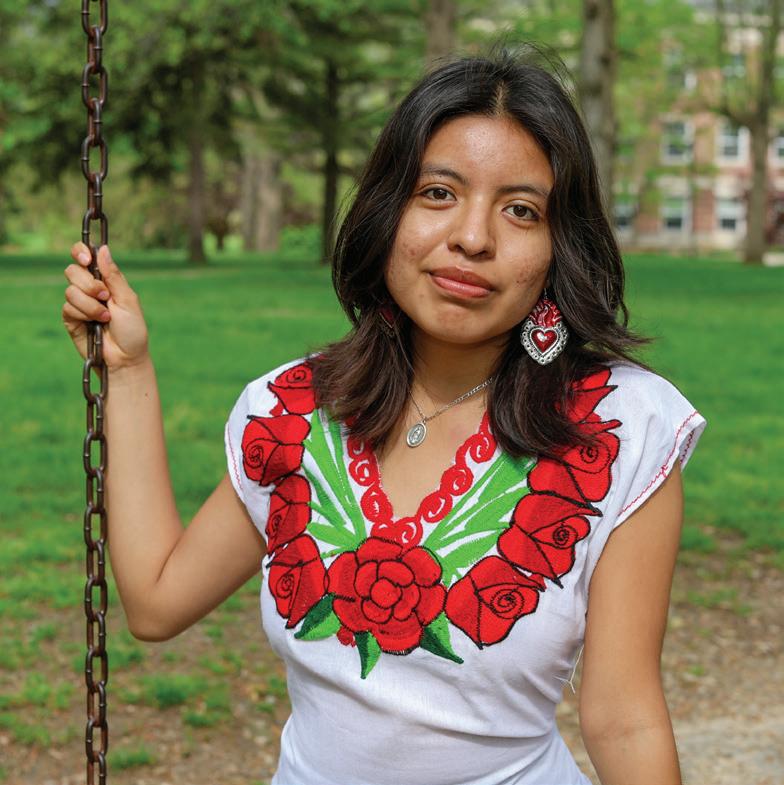
oko Nakata ’26

The Earlham-Ullberg Prize was established in 2024 by Rohin Ullberg ’87 in memory of his father Alan Duane Ullberg, whose career spanned NASA and the Smithsonian Institution. Alan played a pivotal role in launching an environmental research center on the Chesapeake Bay, helping to secure land and build partnerships in support of environmental science. His lifelong commitment to public service and environmental stewardship inspired this new initiative.
“We want to encourage creativity and leverage social entrepreneurship for the greater good to address existential issues,” Rohin Ullberg said.
Modeled after the Watson Fellowship, the prize is a collaboration between Earlham’s Center for Environmental Leadership and Center for Entrepreneurship, Innovation and Creativity. Open to all majors, it empowers students to apply entrepreneurial thinking to urgent environmental challenges. ■
Story
by Jay Kibble/Photos by Tsitsi Makufa

Earlhamite selected for prestigious scholarship to support graduate study in philosophy
Jimmy Freiberger ’26 has been selected for the prestigious Beinecke Scholarship, the College’s first since 1994. As a Beinecke Scholar, Freiberger will have access to up to $5,000 over the next year for costs associated with visiting graduate schools. He will also have $30,000 towards his chosen graduate program. This fall, the Beinecke Scholar national director will visit Earlham to meet Freiberger and run an in-person info session on the program.
“When I applied for this scholarship, I didn’t expect to win,” says Freiberger. “So receiving this was a surprise, and I’m just excited.”
Freiberger plans to pursue a Ph.D. in philosophy, building on his undergraduate studies at Earlham where he is double-majoring in peace and global studies and philosophy. In addition to his Beinecke accomplishment,
Freiberger was also inducted this year into Earlham’s chapter of Phi Betta Kappa, the oldest and most prestigious academic honor society in the U.S. While most students are inducted as seniors, some chapters elect a limited number of outstanding juniors.
Frieberger was the only junior from Earlham this year.
Freiberger ultimately wants to create a new social understanding of homelessness, to encompass everyone for whom a home or living situation has been disrupted.
“Given the opportunities I’ve had at Earlham, I feel almost obligated, as someone with my background, to pursue a Ph.D.,” he says. “Folks with my background don’t always get to experience what I’ve experienced. I feel privileged.” ■ Story by Jay Kibble/Photo by Tsitsi Makufa
Imagining a new future for regenerative agriculture
A new study started on campus is helping shape the future of regenerative agriculture and laying the foundation for a new agribusiness innovation hub to support next-generation farmers.
Led by Jaime Coon, assistant professor of biology and environmental sustainability, and Mary Jo (MJ) Easley ’24, the four-year research project examined motivations and barriers faced by early adopters of regenerative practices in Indiana and Ohio. Their findings, recently published in the journal Agriculture and Human Values, highlight both enthusiasm for soil-healthy, community-centered practices and the systemic obstacles farmers face.
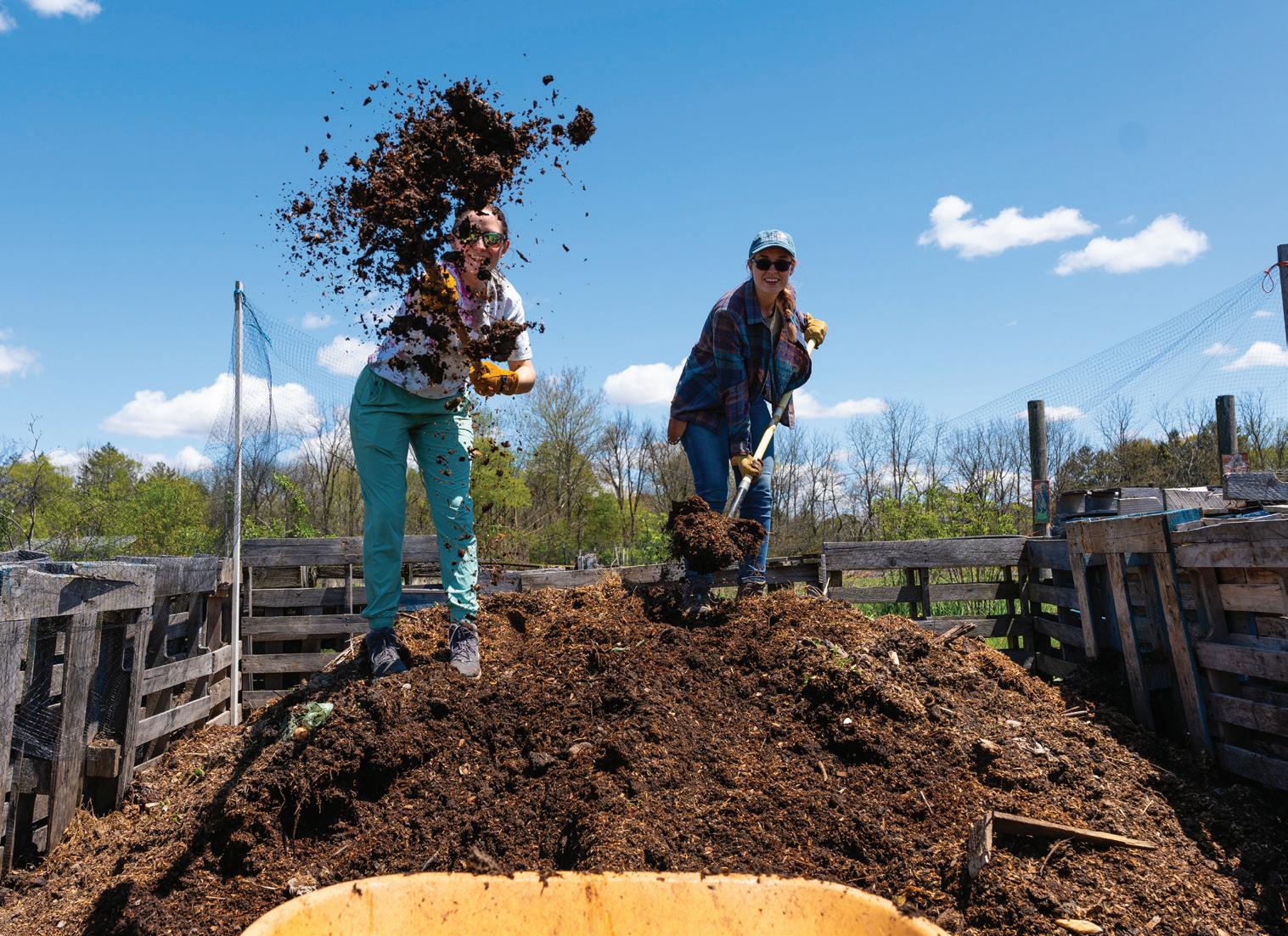
The project was supported by additional Earlham collaborators, including Gene Hambrick ’73, senior executive director of the Center for Entrepreneurship, Innovation, and Creativity, and Jenny Williams, office manager and administrative assistant for the Epic Centers CoLab.
“For farmers in our area, there’s a gap between how beneficial these practices are seen as and how common they are on the landscape,” Coon said. “So, the motivation is there. But farmers say they need help getting started with grant programs, community support and opportunities to learn from each other.”
“For me, this work is about recentralizing the farmers in the regenerative agriculture conversation,” Easley said. “Too often, it’s top-down — big corporations leading the dialogue. But farmers know their land. There’s real value in what they’re already doing and they know what they need to be doing more of.”

Gene Hambrick, Earlham’s senior executive director of entrepreneurship, innovation, and creativity, visits a chicken farm in Fayette County, Indiana.
This research has already helped catalyze a broader initiative, where Hambrick is now leading an effort to launch the agribusiness innovation hub initiative. Drawing on lessons from the research project, the initiative seeks to create a sustainable business model that supports young farmers and rural communities in adopting regenerative practices.
“This all started with a question about agribusiness and rural internet,” Hambrick said. “But with Jaime’s guidance, we pivoted toward regenerative farming. What we learned was that it’s not enough to talk about ideals — we have to talk about culture, communication and yield. You need a value proposition that makes sense to the farmers of today.”
The agribusiness innovation hub initiative is in development, with plans to secure grant support, refine its business model and formally launch in the current academic year.
The research was funded and made publicly available as an open-source document courtesy of a startup established by Coon and a discretionary fund managed by Earlham’s Center for Entrepreneurship, Innovation, and Creativity. ■ Story by Brian Zimmerman
Photo of Jaime Coon and Mary Jo Easley by Kate Young. Photo of Gene Hambrick courtesy of Gene Hambrick.
Welcome back, Jeffrey Perkins ’94
Jeffrey Perkins ’94 has been appointed Earlham’s first vice president for enrollment management, marketing, and communications.
The newly created position unites Earlham’s enrollment, marketing, and communications operations, a strategic move designed to foster greater alignment and collaboration in advancing the college’s enrollment goals and reputation.
Perkins most recently served as vice president and associate vice president of communications and marketing at Bennington College in Vermont, where he helped implement a similar integrated structure across departments. His previous leadership roles span institutions such as the Harvard Graduate School of Education, the School of Visual Arts in New York City and Otis College of Art and Design in Los Angeles.
“This is a full-circle moment for me,” Perkins said. “Earlham shaped so much of who I am, and I’m honored to return to serve the College at such an important time. I’ve been inspired by the dedication of students, faculty and staff I’ve met on campus and during the hiring process. It’s clear that the values that shaped me as a student continue to be core to Earlham’s identity. I’m excited to help spread the word about the power of an Earlham education to transform lives.”
At Earlham, Perkins majored in peace and global studies and politics, and graduated with honors. He has remained connected to the College as an alum council representative and class chair.
Perkins later earned a Master of Arts in American Studies from the University of Massachusetts Boston, a Master of Fine Arts in Writing and Literature from Bennington and a certificate in screenwriting from the University of California Los Angeles.
He is the author of Kingdom (2020) and the co-author of You Have the Power: Choosing Courage in a Culture of Fear (2005), which he wrote with Frances Moore Lappé ’66. ■ Story by Brian Zimmerman.
Photo by David Morelos Zaragoza Laguera
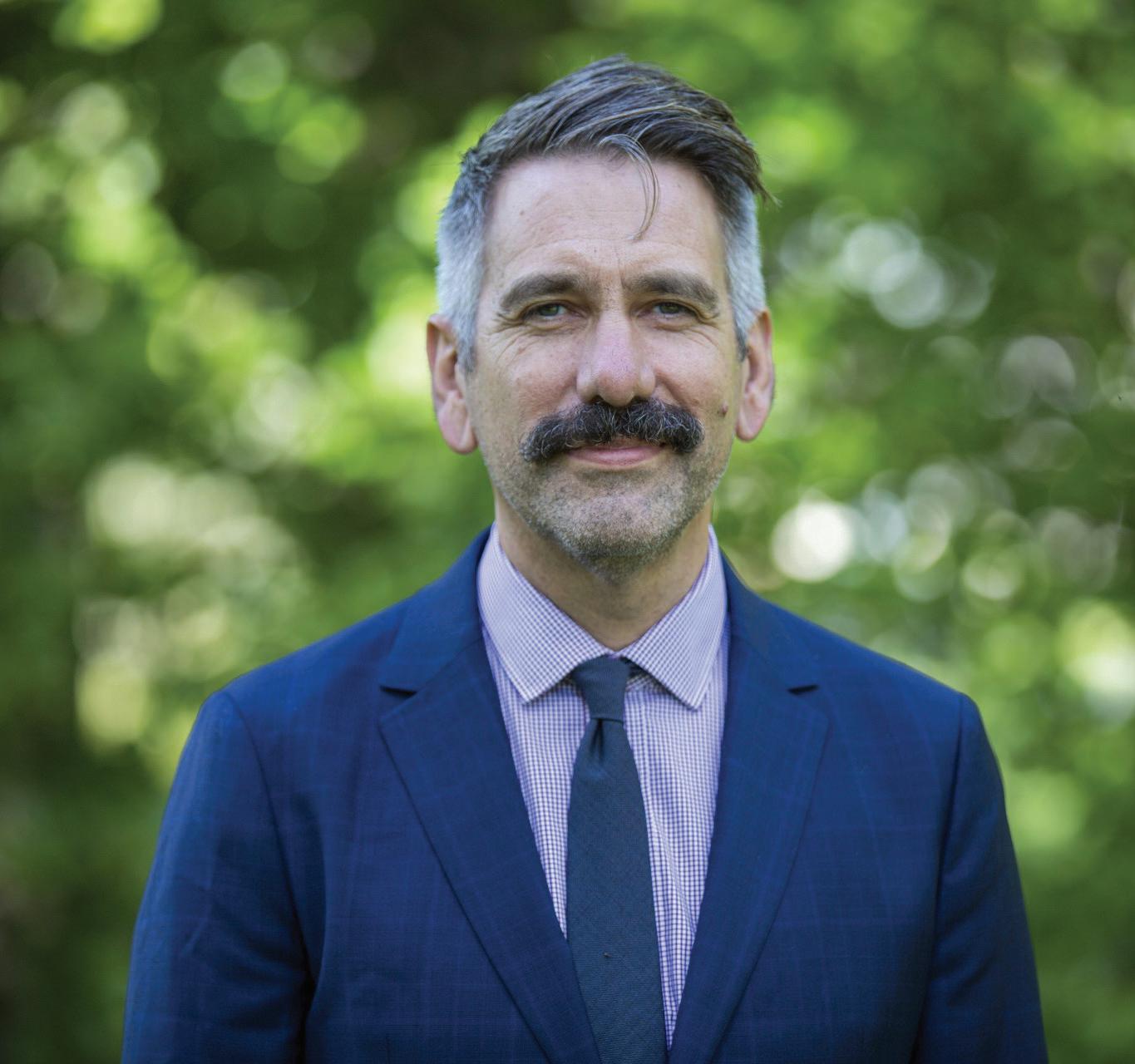
“It’s clear that the values that shaped me as a student continue to be core to Earlham’s identity. I’m excited to help spread the word about the power of an Earlham education to transform lives.” – Jeffrey Perkins ‘94
Black alums celebration set for Homecoming
Earlhamites can look forward to a celebration of Black excellence and Black alums at the 2025 Homecoming and Reunion Weekend from Oct. 9-12. The celebration is hosted by Earlham’s African American Advisory Board.
“It’s a very exciting time for us as we celebrate our Black alums not just here in Richmond but across the nation,” said Shenita Bolton ’05 M.Ed. ’11 who is serving as chair of the effort. Bolton is the chief of family and community engagement and school success at Fort Wayne Community Schools in Fort Wayne, Indiana. “We’re excited to have this celebration and bring alumni across the various decades and generations together. Earlham has made an impact on us, and us on it, and we want to celebrate that.”
Alums will be honored throughout Homecoming and Reunion Weekend with various events and speakers. There will be a special event Friday, Oct. 10 at the Forest Hills Country Club, a celebratory gathering with appetizers, drinks and recognition of alums’ talents and
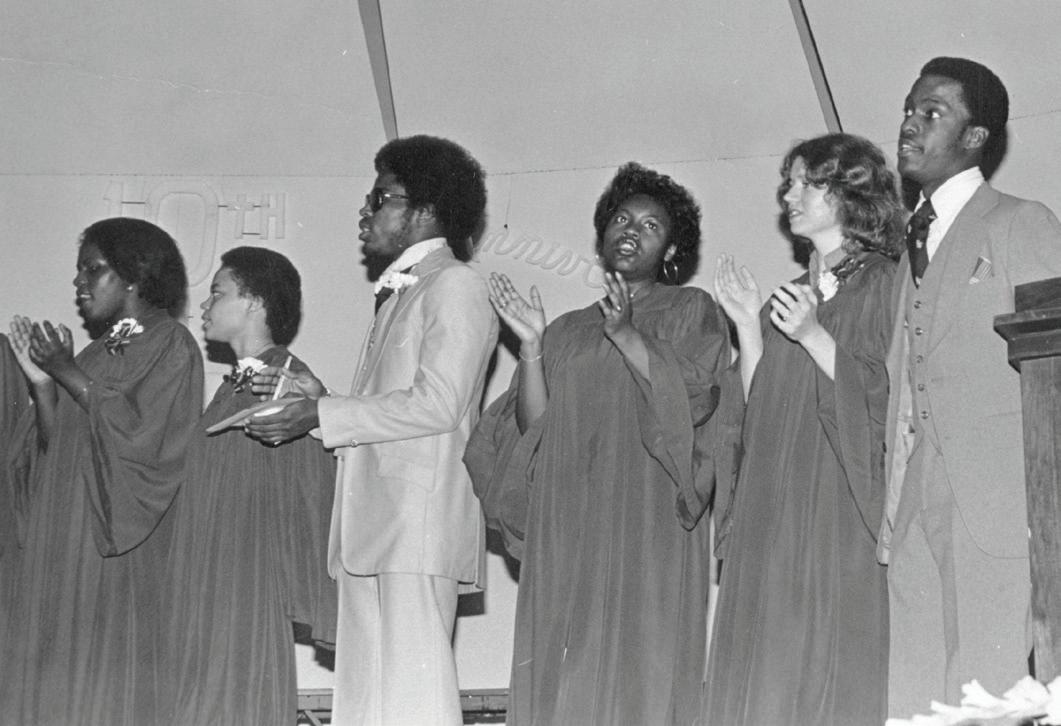

achievements both during and after their time at Earlham.
There will also be a planned reunion of the Gospel Revelations Choir and a reunion performance.
“Gospel Revs started a little over 60 years ago with some individuals who came together and decided they wanted to form a choir,” said Bolton. It was a handful of individuals, “but grew throughout the decades to be a very diverse group of individuals and we’d perform locally and regionally.”
The group plans to sing popular songs such as “Blessed” by Paul Morton, among others.
“This is for any and every alum who’s been involved with Gospel Revs,” said Bolton. “We encourage anyone and everyone who’s been a part of Gospel Revs or who is a Black alum to show up for this event. We want this to be the biggest alumni celebration ever.” ■ Story by Jay Kibble
Earlham School of Religion receives $2M gift
Earlham School of Religion has received a transformative $2 million gift from Patricia Thomas ’90, to establish the Patricia Thomas Lonnie Valentine Peace and Justice Endowed Chair.
This new endowed faculty position honors the legacy of Lonnie Valentine ’83, a longtime ESR faculty member known for his unwavering dedication to peace, justice, and integrity. The inaugural holder of the chair is Colleen Wessel-McCoy, assistant professor of peace and justice studies and director of the Master of Arts in Peace and Social Transformation program.
Thomas graduated from ESR with a Master of Ministry after what she describes as an unexpected, but life-changing call to ministry. She is a lifelong Quaker, who has pastored at Chester Friends Meeting — an historic congregation known for its role in the Underground Railroad — and served as the campus minister at Wilmington College. She was a member of the ESR Board of Advisors for 19 years holding the role of clerk for one term. She serves as clerk of Wilmington Yearly Meeting and is active in the meeting on the campus at Wilmington College. She lives in Wilmington, Ohio, with her husband Douglas Woodmansee, a retired biology professor. And she is also the author of the Pastor and Professor Quaker Mystery series.
Thomas’ philanthropy reflects her family’s commitment to education and the testimonies of peace, equality and integrity. Inspired by her father, a conscientious objector during World War II, and her mother’s work in fair housing in Ann Arbor, Michigan, Thomas underscores their values by endowing an academic chair.
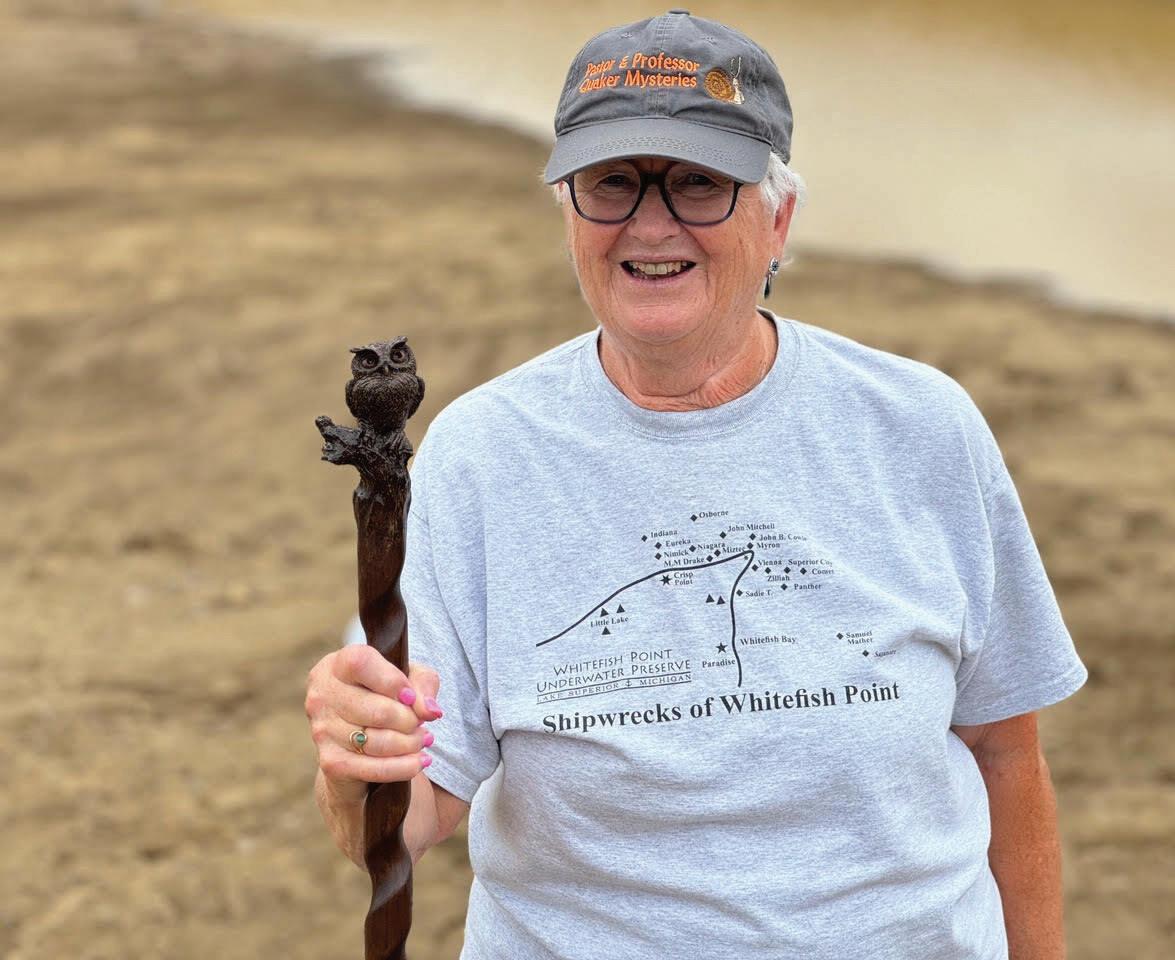
Including this recent gift, Thomas has contributed more than $2.3 million to Earlham College and ESR over the years. She also recently endowed the campus minister position at Wilmington College.
“I always dreamed of endowing a chair,” said Thomas, “but I never thought it would be possible. It feels like a dream come true — to support institutions I love and believe in. I wanted to make sure that this chair not only honored Lonnie Valentine’s legacy, but also ensured that the peace testimony — so central to Quaker faith and practice — remains alive and well in our world.” ■ Story by Brian Zimmerman. Photo courtesy of Patricia Thomas.
Author David Brooks and former U.S. Secretary of Transportation Pete Buttigieg to speak on campus
Two of the nation’s most influential voices will visit campus during the 2025-26 academic year as part of its signature lecture series programs this academic year.
David Brooks, bestselling author and widely respected commentator, will speak on Thursday, Nov. 20, 2025, at Goddard Auditorium in Carpenter Hall. A longtime op-ed columnist for The New York Times and regular contributor to PBS NewsHour, Brooks is known for his thoughtful analysis of American culture, politics and character. His latest bestseller How to Know a Person explores the art of understanding others and forming deeper connections. Brooks is the author of six books, a member of the American Academy of Arts and Sciences and the recipient of more than 30 honorary degrees. His talk is part of Earlham’s Artist and Lecture Series.
On Wednesday, Feb. 18, 2026, former U.S. Secretary of Transportation Pete Buttigieg will deliver the third Presidential Lecture at Earlham. A Rhodes Scholar and Afghanistan veteran, Buttigieg served as the 19th Secretary of Transportation and made history as the first openly gay U.S. Cabinet member. He previously gained national attention as mayor of South Bend, Indiana, and as a presidential candidate.
Buttigieg follows Van Jones and Nikole Hannah-Jones in the Presidential Lecture Series, which is made possible by the Hawkins Just Society Lecture Fund, the Artist and Lecture Series and the President’s Discretionary Fund. The Hawkins Fund, created by Neil and Annmarie Hawkins and their daughter Rachel Hawkins ’10, honors the legacy of Neil’s parents Julian and Kazue Fukada Hawkins.
Ticket information for both events will be announced later this year. Visit earlham.edu/events for updates.
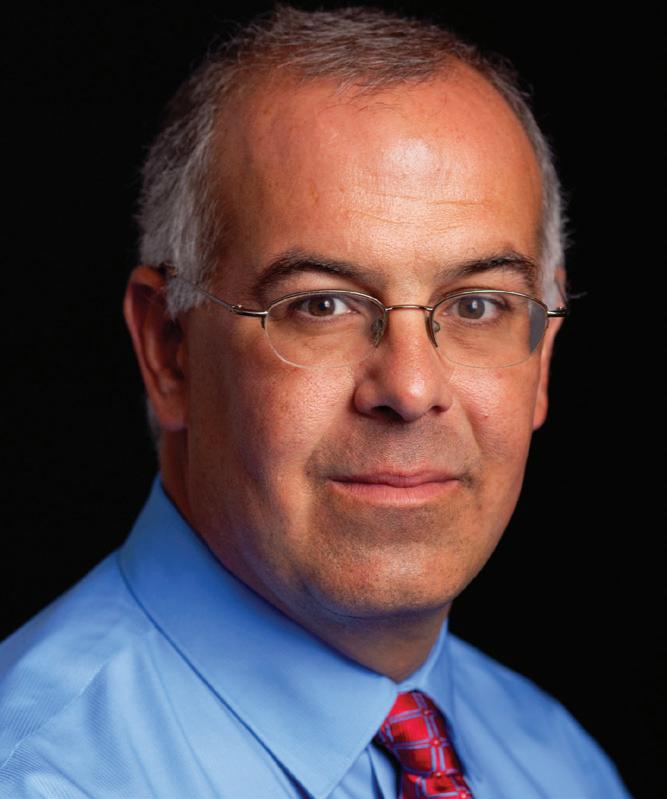
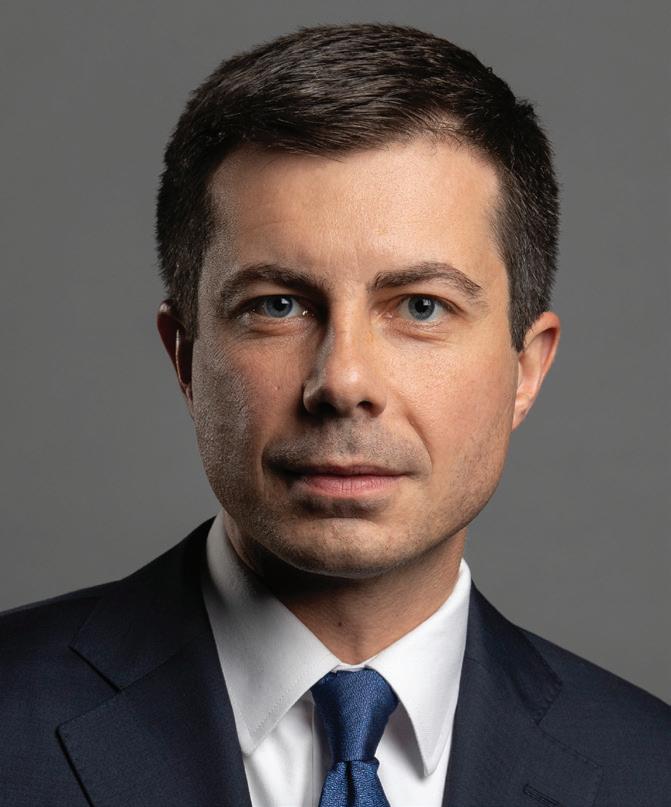

Ready to get started? Scan the QR code to learn more, or visit earlham.edu/alumni.
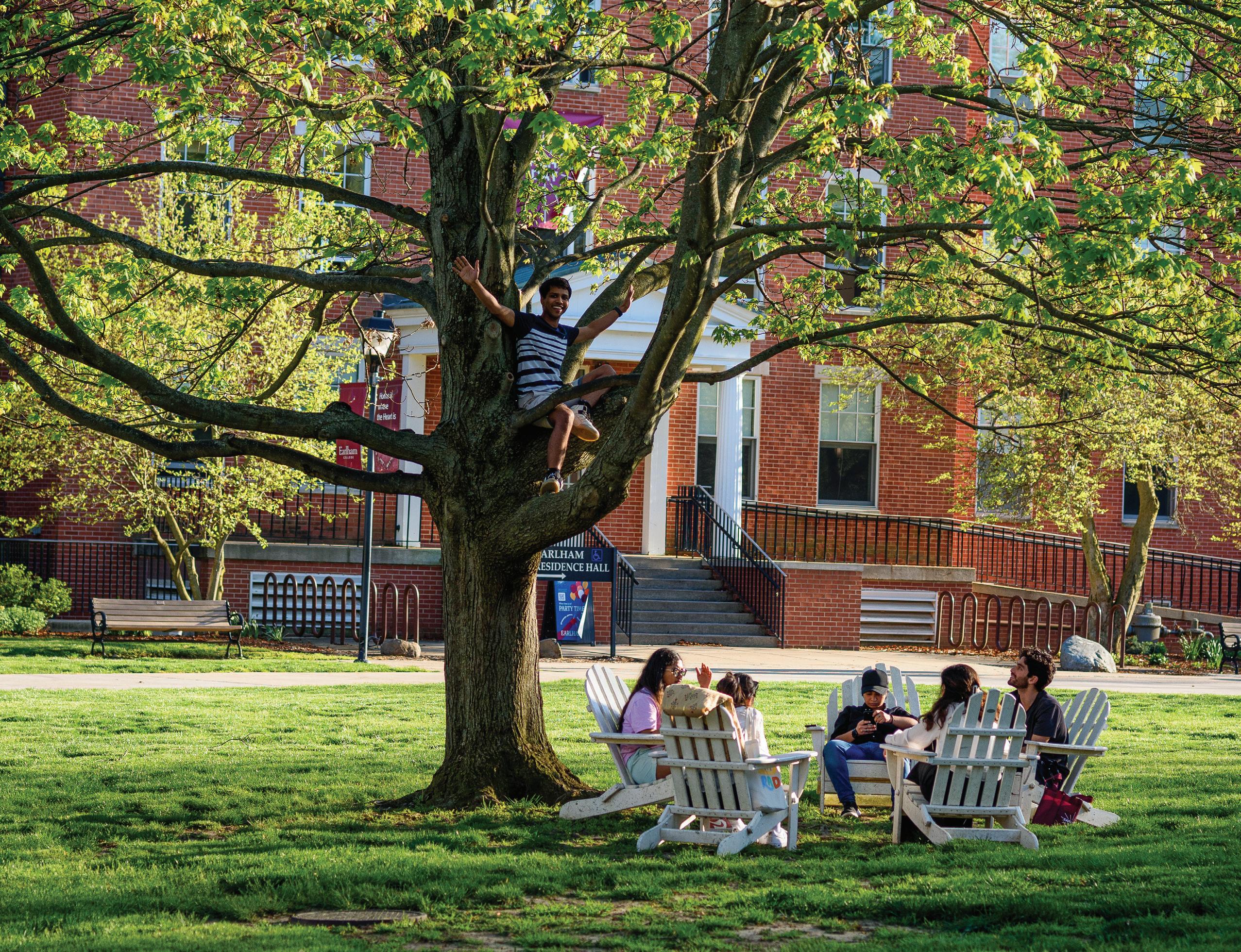
Your support helps us grow
Four ways you can make an impact today!
Alumni support is invaluable. Here are a few ways you can help Earlham thrive right now :
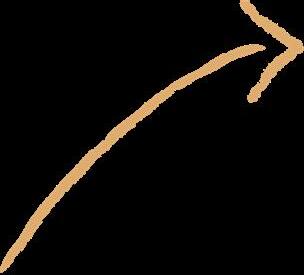
• Nominate a future Earlhamite. Know a student who would love Earlham? Help them experience their own Epic Journey by referring them for the Alumni Referral Scholarship and unlock a $1,000/year scholarship.
• Engage on social media. Follow, like and share Earlham’s posts to help the spread the word about our community.
• Give back, change lives. No matter the size, your gift will change the world — one Earlhamite at a time — for generations to come.
• Become a volunteer. Share your journey with prospective students, mentor current students, or help build community by serving on your reunion committee or planning a local event. Your lived experience is one of Earlham’s most powerful stories.
Margaret Hamilton ’58, a pioneering software engineer whose groundbreaking work helped land the Apollo 11 mission on the moon, was awarded an honorary Doctor of Science degree (honoris causa) during the ceremony. The degree was awarded in absentia. Hamilton earned her degree in mathematics with a minor in philosophy at Earlham, laying the foundation for a distinguished career at the forefront of innovation. As director of the Apollo Flight Computer Programming team at MIT’s Draper Lab, she led a team of young programmers at a time when computer science was still an emerging field. She later coined the term “software engineering” to help define and legitimize the discipline she helped create. Over her celebrated career, Hamilton has received numerous honors, including NASA’s Exceptional Space Act Award, Earlham’s Outstanding Alumni Award — and the Presidential Medal of Freedom — the nation’s highest civilian honor.

Earlham Celebrates 178th Commencement Ceremony
On Saturday, May 17, 2025, Earlham College celebrated its 178th Commencement in the Druley Performance Gymnasium, located in the Athletics and Wellness Center. The ceremony honored the achievements of the Class of 2025 with joy, tradition, and inspiration.
more online
Find more commencement photos at earlham.edu/commencement.
Photos by Tsitsi Makufa and Josh Smith
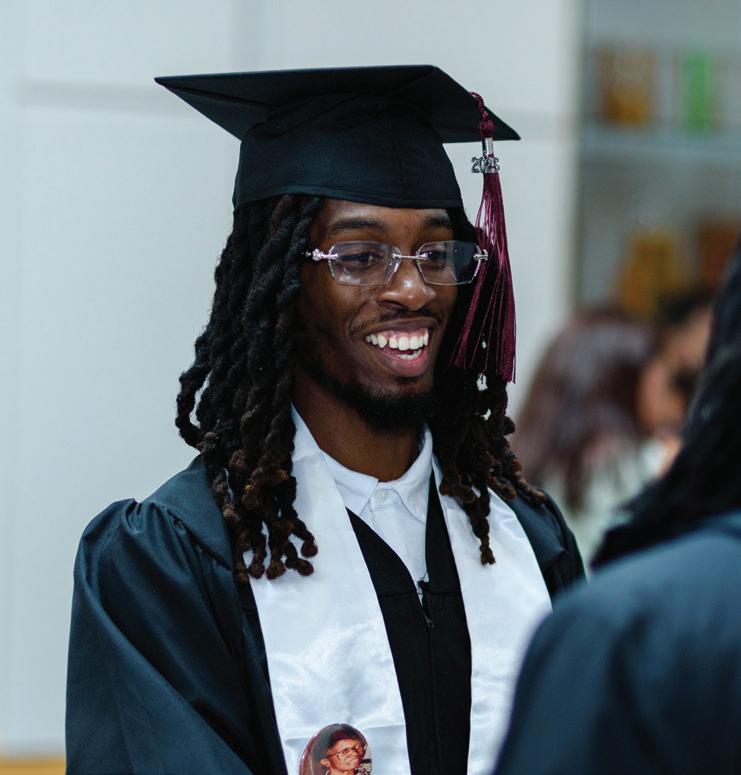
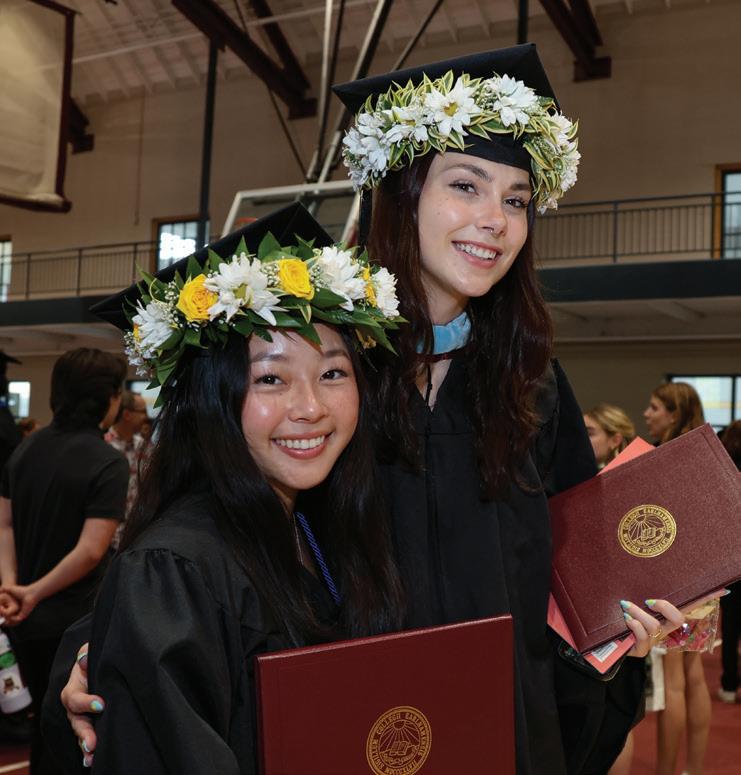

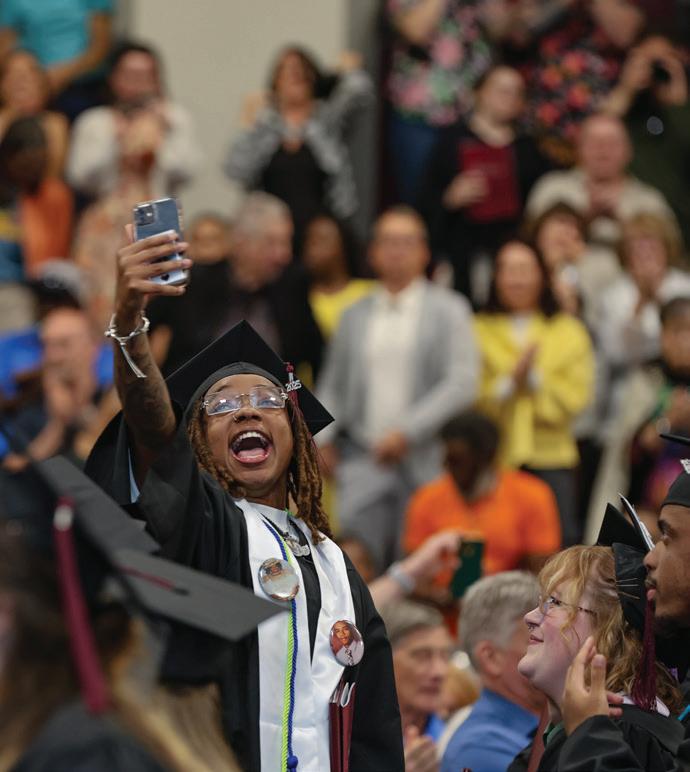
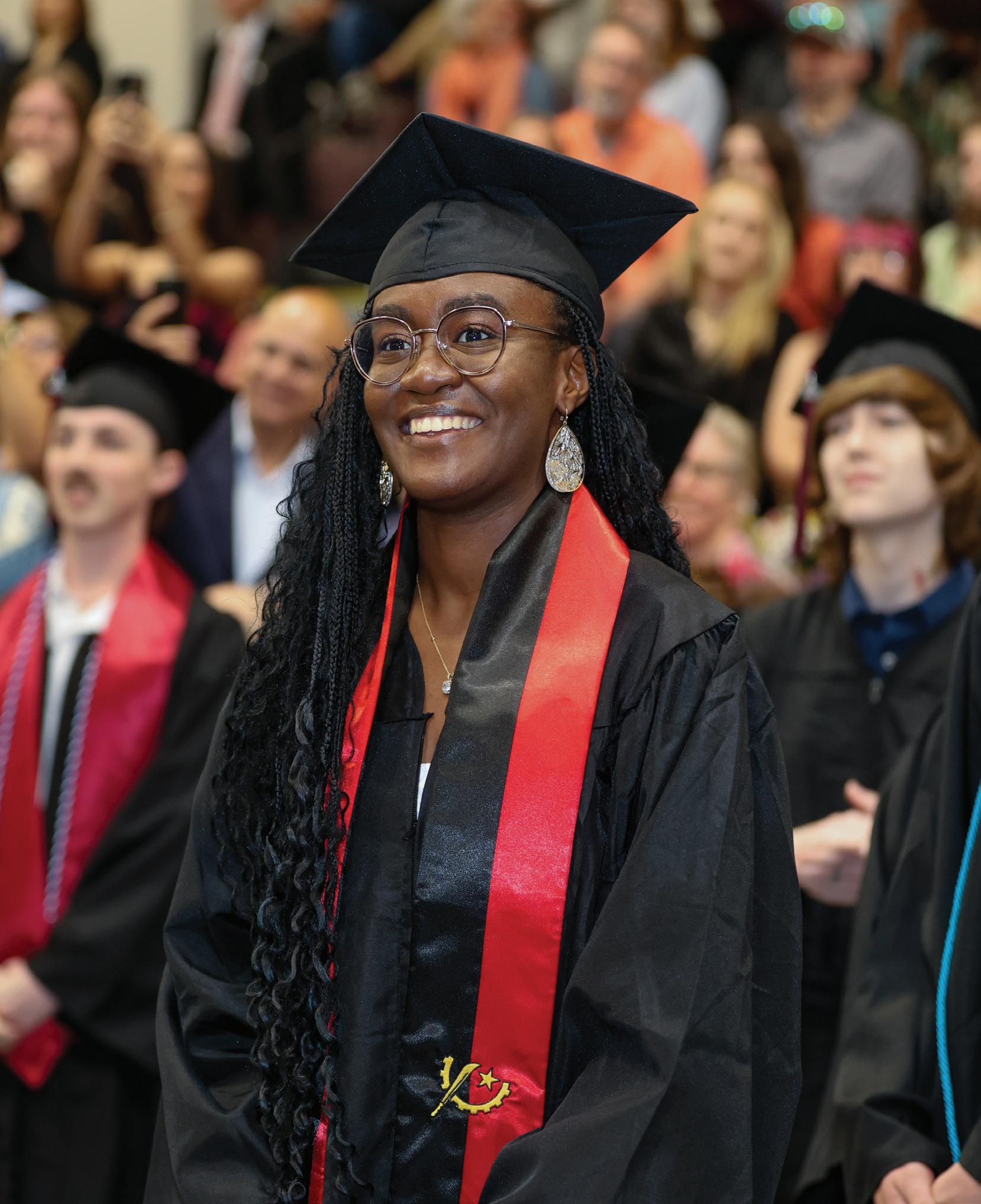
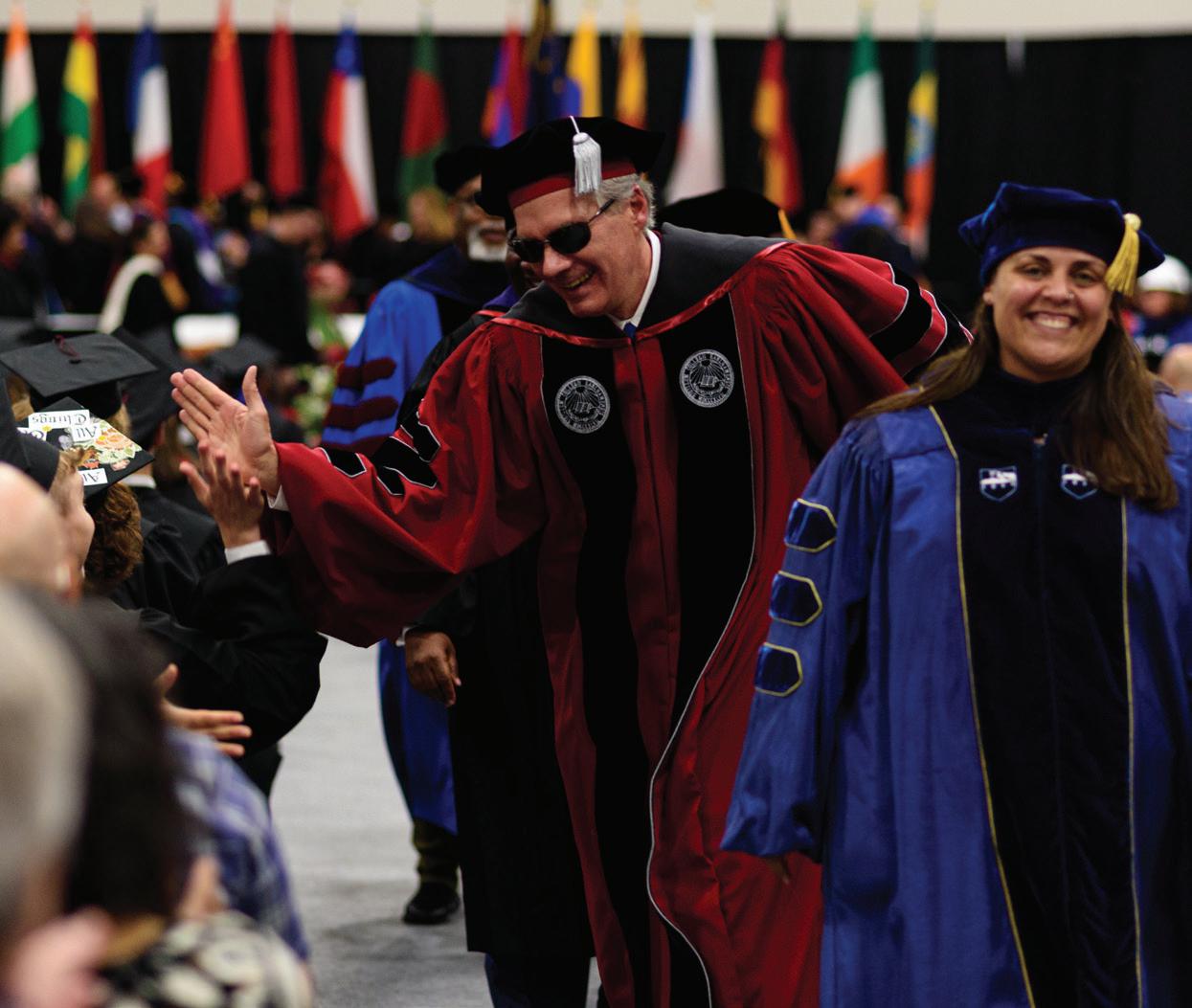
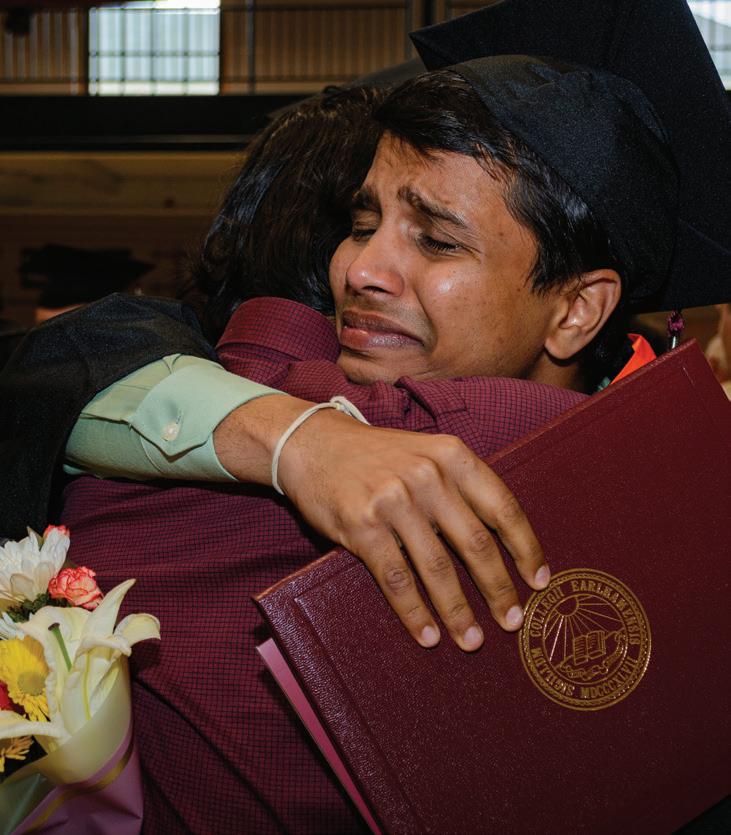
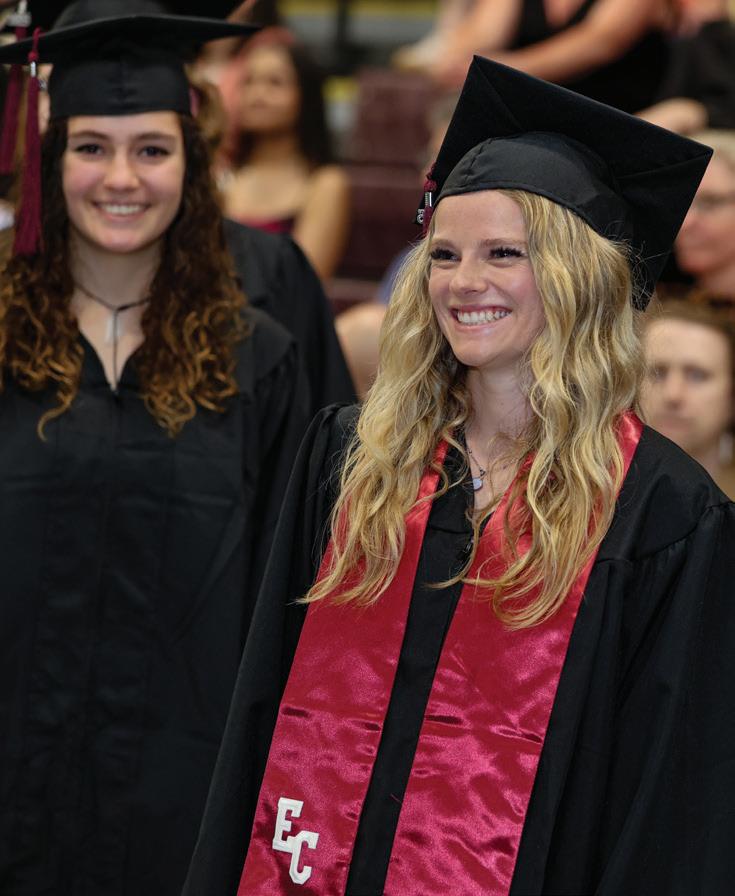
This year’s Commencement also marked a special moment for six legacy graduates — students whose parents are also Earlham alums — underscoring the deep, multigenerational connections within the College’s community. Those graduates included:
Mary Asch (Bill Asch ’93 and Emily Asch ’94)
Emma Shelton (Susanna Shelton ’94)
Sylvan Gilkey (Tristan Milton-Gilkey ’06 and Mary Gilkey ’00)
Nathan Lasersohn (Peter Lasersohn ’81 and Sharon Haworth ’86)
Nathan Brophy (Ben Brophy ’94 and Lisa Downing)
Oliver Stratton Treadway (Nathan Stratton Treadway ’92 and Catherine Stratton Treadway ’95)
Top of the class
Four professors discuss their research, ideas and how they contribute to Earlham’s legacy of teaching
By Laura Leavitt
You only have to go so far as annual rankings in U.S. News & World Report and The Princeton Review to see that excellence in teaching is one of the hallmarks of the Earlham experience. The college has consistently ranked in the top liberal arts institutions in the nation — and that it offers one of the nation’s best classroom experiences. It’s no secret that the path to these rankings and to the esteem in which the college is held leads back to the dedicated, engaged and scholarly faculty.
In addition to teaching excellence, many of the teaching faculty members have made their research a living, evolving component of academic work. As community develops within a classroom or major, faculty members bring ongoing research to the table and enlist Earlham students to participate and learn from the work as it happens. These
excellence
faculty document modern history as religious communities evolve, center new voices in the complex legacy of colonialism in nations in sub-Saharan Africa and beyond, challenge notions of what is worthy of serious study in Japanese literature and equip students with critical historical lenses that help them ask and answer important questions about their own futures.
Scholarship happens at Earlham where a faculty member’s deep interest meets a discipline’s rigorous standards for inquiry. This combination enriches the available course offerings at Earlham to the point that some courses on campus are investigations into subjects covered nowhere else in the world with such specificity and depth.
This work is done across campus in the offices, labs and classrooms led by preeminent scholars such as the four whose research and teaching are highlighted on the following pages.

Researching cooperation
Elana Passman’s research drills deep into a particular historical era and area of the world, but also asks the bigger questions about cooperation, conflict and how we imagine others outside our personal groups.
In February 2025, the history professor’s book The French-German Dynamic in an Age of Conflict, 1925-1963 was published by Routledge and offers an in-depth case study of a radical transformation in international relations that is instructive for other contexts where ongoing conflict and a need for peace and cooperation exist.
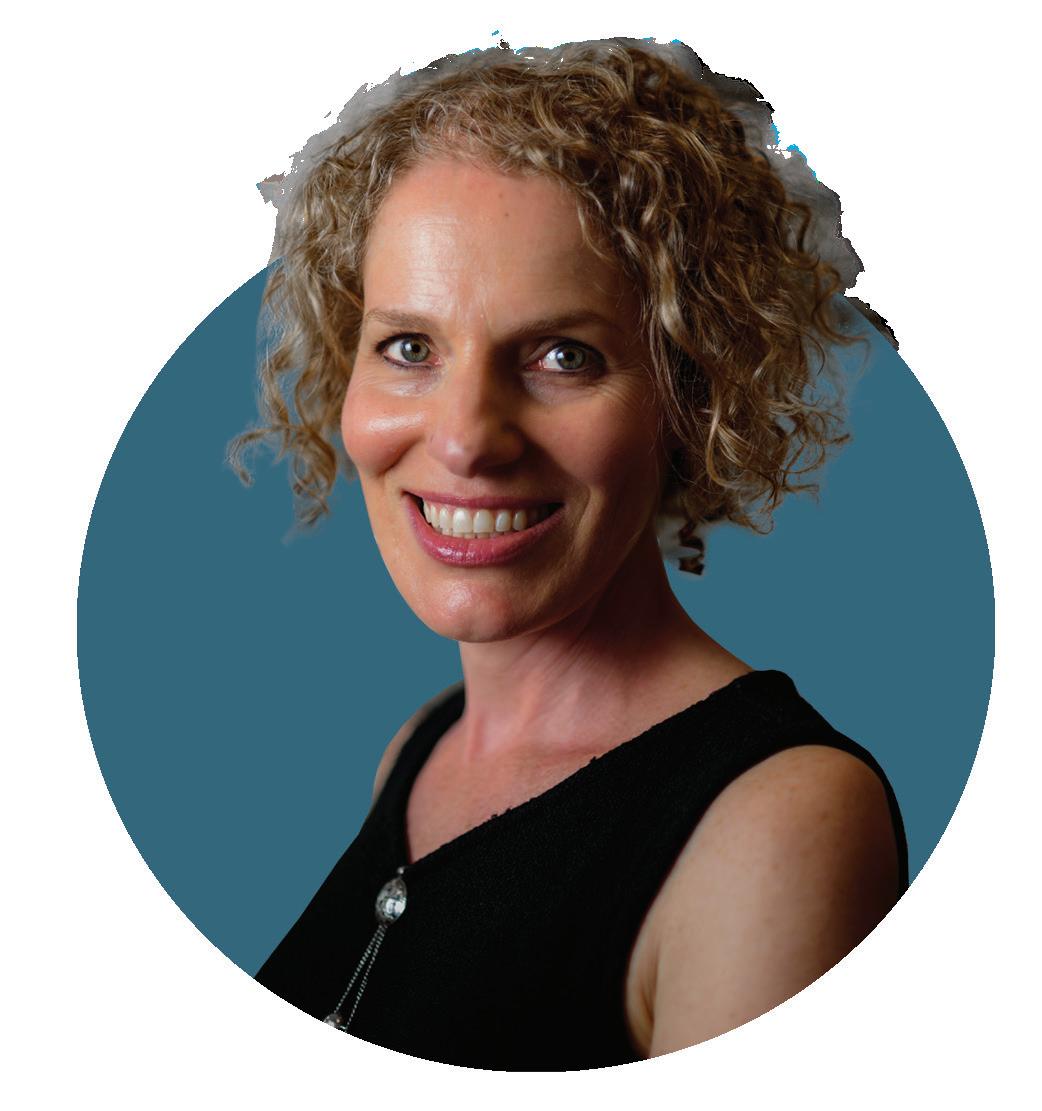
“Earlham students are such original thinkers that they sometimes have trouble deciding among different fabulous ideas.”
– Elana Passman
“An idea took hold that the French and Germans had always been enemies, a hereditary enmity, a primordial hatred going back to the Middle Ages,” says Passman. “I wanted to flip the script and think about how, throughout this tremendous conflict, some people worked to bridge seemingly insurmountable divides.”
Passman’s research in the archives informed her book project, but her teaching and work in the Earlham community also cross-pollinated the work. She has taught coursework on cooperation and internationalism across wider contexts with her
own research as a valuable focal point for her students to consider. Earlham students are eager to bring their own wisdom to important questions such as how cooperation happens.
Passman has taught the capstone course for the history major many times, and throughout that inquiry process, she helps students find the intersections between their own interests and the existing conversations in historical study.
“I encourage them to follow their passions. Then we work to figure out how to shape that passion,” says Passman.
Passman also advises the Fulbright applicants at Earlham, drawing on her own experiences using research grants and funding that build space for deep study, long-term engagement with archives or the opportunity to teach English in a different country and gain valuable cultural exposure. She helps them clarify their ideas, but, she says, Earlham students consistently shine in the application process. Under her leadership, Earlham has been recognized as one of the nation’s top Fulbright-producing institutions on multiple occasions.

“Something I find marvelous is how Earlham students are such original thinkers that they sometimes have trouble deciding among different fabulous ideas,” says Passman.
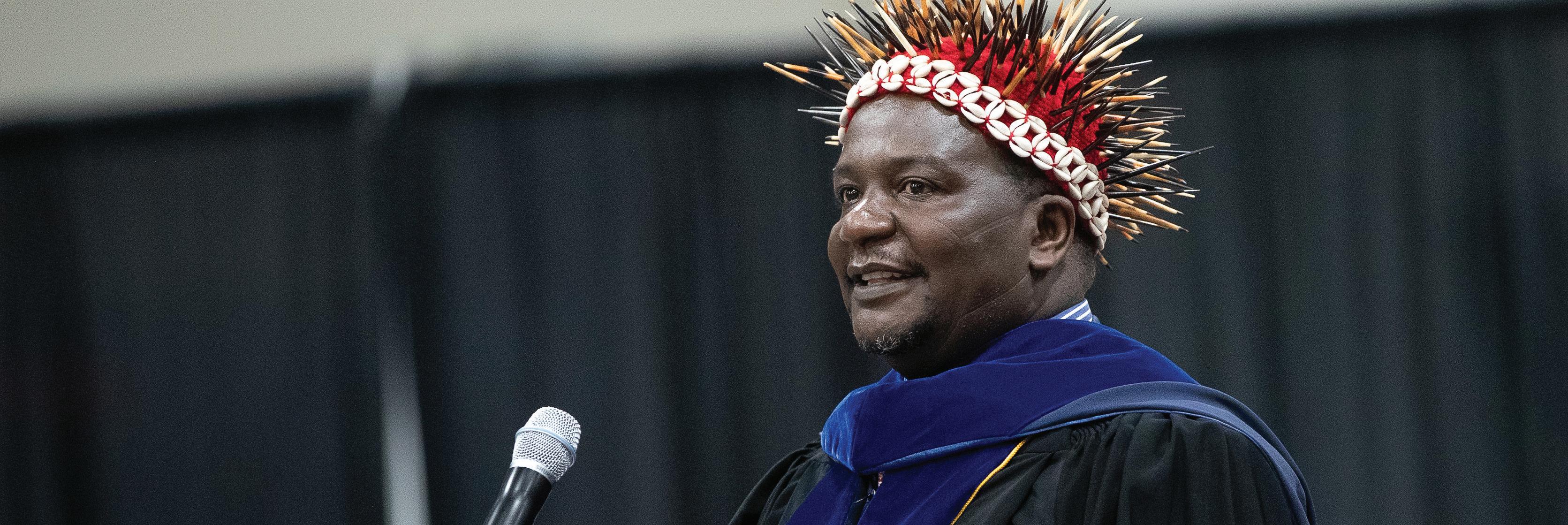
Shaping history
Earlham’s student body and faculty hail from all over the world, which enriches both the research environment and classroom discussions. Womai Song, director and associate professor of the African and African American Studies Program, as well as associate professor of history, was born and raised in Cameroon, with his lived experiences informing his long-term investigation into the colonial and post-colonial experiences of sub-Saharan African communities.
The manuscript for Song’s upcoming monograph is under review by Indiana University Press and is tentatively titled In the Eye of the Storm: Auguste Ngom Jua and Anglophone Cameroon Nationalism. His work has been in development as he teaches many of the crucial courses in AAAS, history, and peace and global studies at Earlham. Song’s courses and the book project help inform each other.
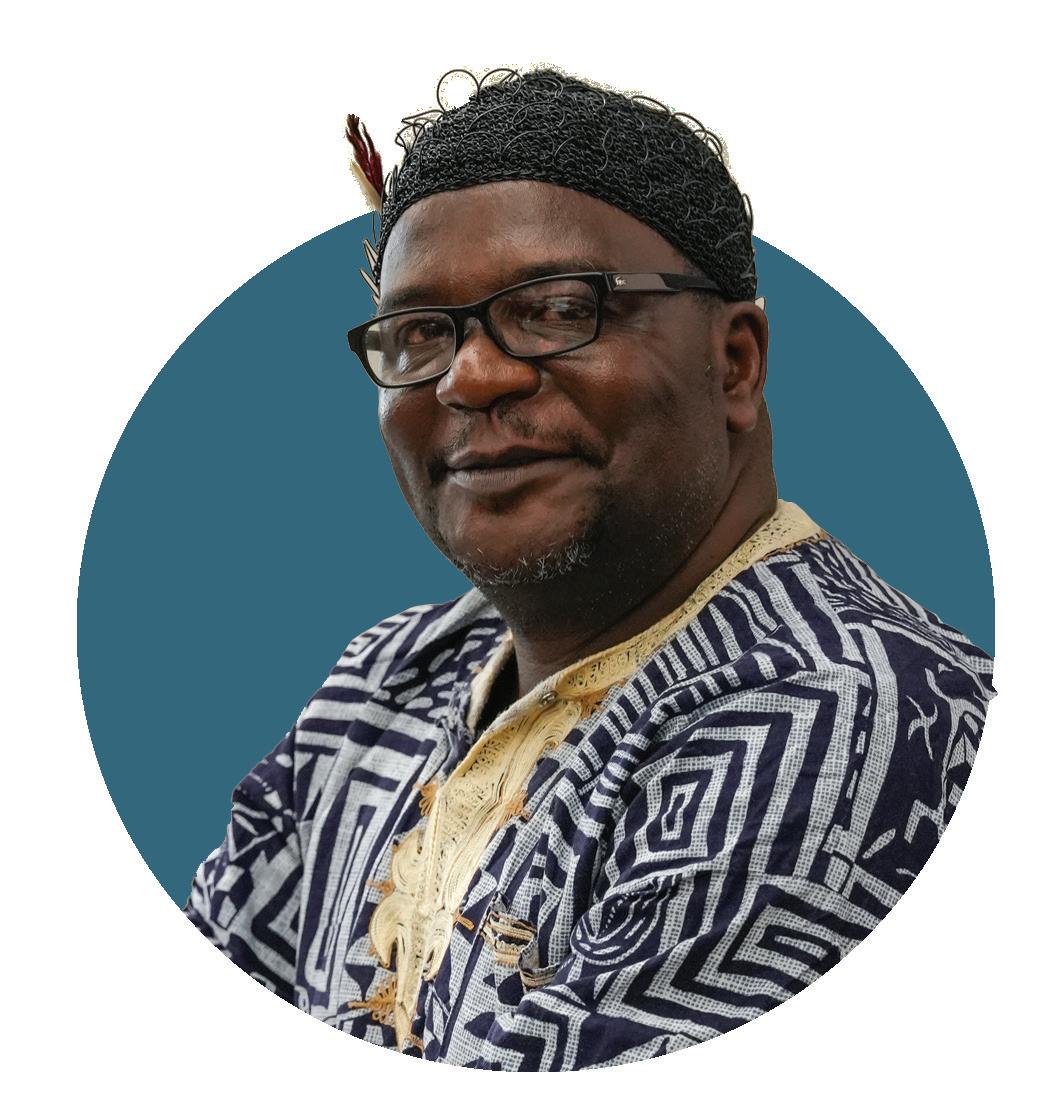
Song’s research has uncovered histories that haven’t been widely told and archival documents that bring important voices to the forefront as world politics grapple with the enduring impacts of enslavement/colonialism in sub-Saharan Africa and the reality of epistemic violence — the extermination or annulment of knowledge — in the Pan-African experience.
“I intentionally challenge the students to center Black folk in the analysis of their historical and contemporary experiences,” says Song. “I learn every day from my students. Over the years they have pushed me to be more intentional in centering the contributions especially of Black women, who are often marginalized in historical analysis.”
“I consistently and persistently nurture my students towards finding their own voice during their academic sojourn at Earlham College.”
“This project partly interrogates the themes of neo-colonialism, decolonization and Pan-Africanism in the shaping of Juaism in post-colonial Cameroonian experience,” says Song. “Discernment from archival sources and analysis from secondary literature have greatly informed my teaching in some of my courses, including Neo-colonialism, Pan-Africanism, History of Southern Africa, Introduction to African and African American Studies, and African History Since 1880.”
– Womai Song
Song sees the opportunity to bring his own longstanding research and his students’ passions and concerns together, forwarding the next generation of scholars even as his own work contributes to vital conversations right now.
“I consistently and persistently nurture my students towards finding their own voice during their academic sojourn at Earlham College,” says Song. “This is particularly the case for those intending to pursue an academic career, where finding and sustaining a niche requires passion in the context of other major determining factors.”
Writing collaboratively
Steve Angell ’82 knows the breadth and depth of religious studies research. As the Leatherock professor of Quaker studies at Earlham School of Religion, he has read extensively in the archives that can be decades or hundreds of years old, and written definitive accounts of major changes in the Society of Friends from the last 15 years.
His teaching is dynamically involved in the life of the Religious Society of Friends.
“ESR is really the center of postgraduate Quaker education in the United States, and nearly all of the work I’ve produced in the last 25 years has been on Quaker themes,” says Angell.
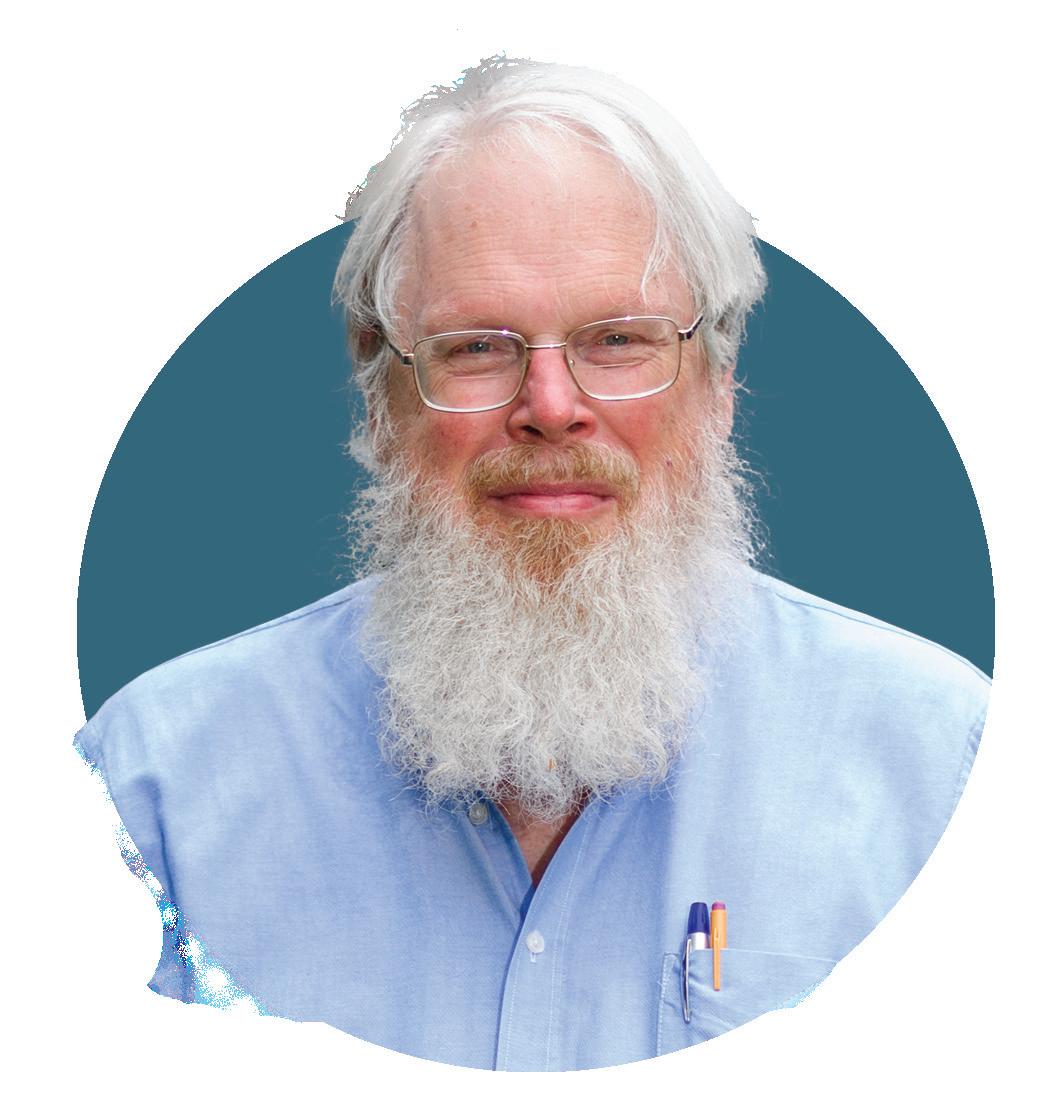
“I’m always informed by my student’s questions, but also by family members, friends and the people I encounter in my travels.”
Angell likes writing collaboratively and has found long-term collaborations with scholars both near and far. His recent three-book series The Separation Generation explores in-depth how various Quaker associations have experienced schisms on important doctrinal points in the past 20 years. He worked with
– Steve Angell ‘82
noted Quaker scholar, author and activist Chuck Fager as well as ESR student Jade Rockwell ’25 (née Souza) on the three books.
Angell is proud of the collaborative spirit within the Quaker studies community, and he helps students consider where their own research might find its best publication home.
“I’m always happy to recommend places to my students and to help them revise for publication,” says Angell. “The students are pretty resourceful though; sometimes, all I have to do is bless them and let them go.”
Angell’s work is inextricable from the discussions that go on in his classroom. He sees this enmeshed version of teaching and research as part of studying religion in community.
“I’m always informed by my student’s questions, but also by family members, friends and the people I encounter in my travels,” he says. “If one is writing about things that are of interest to a religious community as intimate and warm as the Society of Friends, one needs to have one’s ear to the ground, listening to students and everybody. This isn’t a dead religion — not by a long shot.”

Discovering scholarship
Faculty members at Earlham know the benefits of covering topics in both breadth and depth, wearing many hats while also teaching their students the value of sustained engagement with a topic. Tiffany Hong holds both breadth and depth as valuable in her diverse scholarship as an associate professor of Japanese studies at Earlham.
“I find myself being drawn over and over to things that have been called undeserving of scholarly attention,” she says. Her work delves deep on the Japanese tradition of manga, as well as comics more broadly, and also the works of author Haruki Murakami, whose work blurs the line between literary and popular fiction.
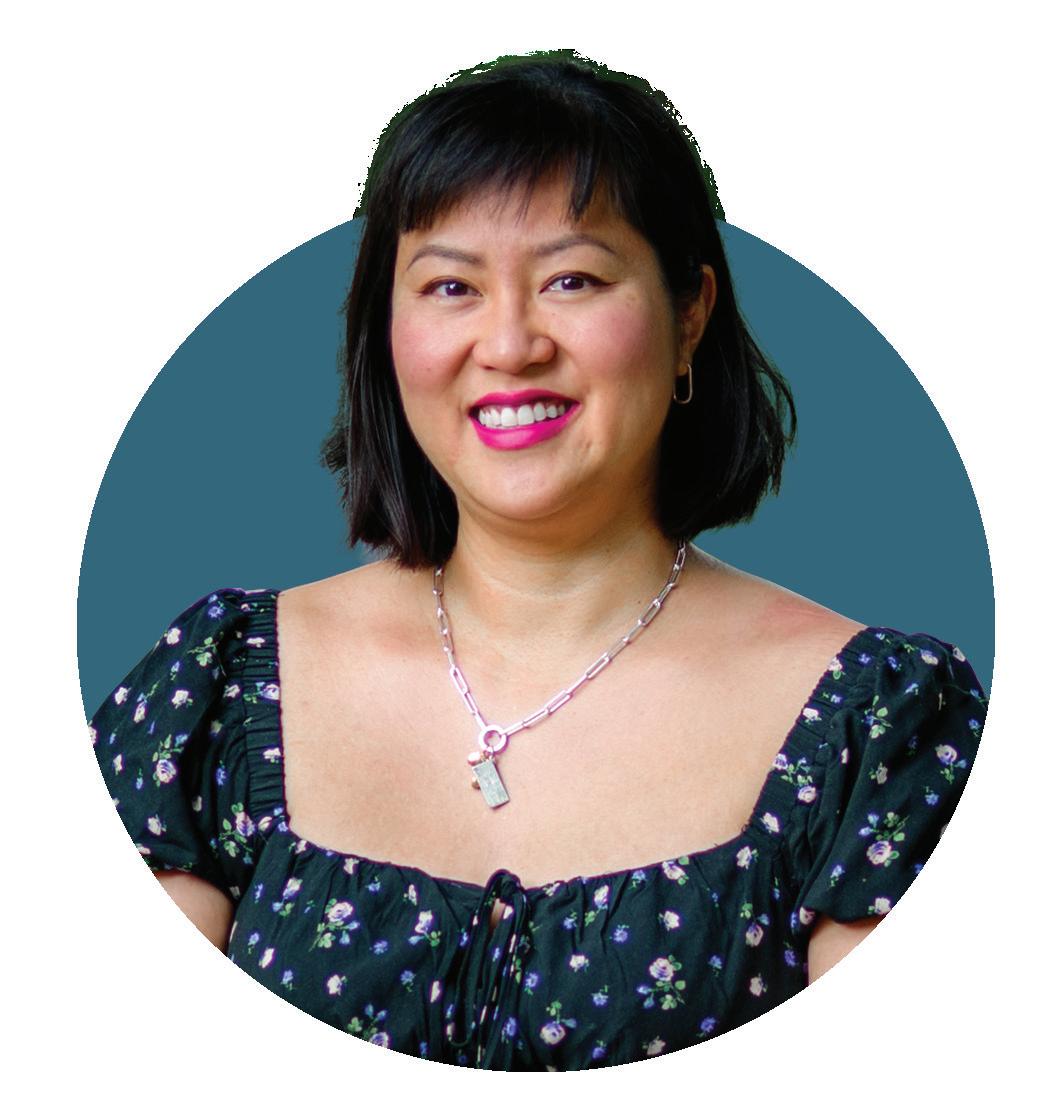
For example, Hong’s recent course War Manga and Comics revealed to her students that the way we consume content about war is changing. “This is the first generation to livestream war, to open an app and see something that would have been censored before,” says Hong. “We also can talk about how picking up a comic may help you engage with a war you don’t know much about, and how the differences between a cartoony style versus photorealistic drawing change how we are impacted by the content.”
“I find myself being drawn over and over to things that have been called undeserving of scholarly attention.”
Hong recently co-headlined as a keynote speaker at a conference on Murakami at Wellesley College, where she and three other of the foremost scholars in the world spoke on the topic of reading Murakami through a feminist lens. Hong’s thoughtful, critical eye on popular literature helps both the readers of her research and her Earlham students realize that very interesting lessons lurk behind even texts that some assume to be surface-level work.
– Tiffany Hong
Hong isn’t afraid to ask important questions about how we’re engaging with popular content, not just literature, in ways that help her students ask nuanced questions about empathy, compassion and cross-cultural communication.
Hong’s coursework also helps students find accessible and very engaging ways to understand Japanese culture in particular, even as they realize that their own areas of interest are worthy of serious inquiry and research. Her message is: What impacts us viscerally is worthy of attention and deep consideration. She encourages her students to follow those leads. ■
Photos by Tsitsi Makufa and Josh Smith

One of nation’s ’ best and most interesting’ Fiske Guide to Colleges
High ranking
For generations, Earlham College has stood out as one of the nation’s truly distinctive institutions — and the experts agree.
by Brian Zimmerman
Ranked among the Top 75 national liberal arts colleges by U.S. News & World Report, Earlham is celebrated not only for academic excellence but also for its longstanding commitment to teaching and value. The Princeton Review ranks Earlham among the nation’s Top 20 for classroom experience and as one of the most LGBTQ-friendly campuses in the country.
As one of the original 40 Colleges That Change Lives, the popular book by the late New York Times editor Loren Pope and a nonprofit organization of the same name that is dedicated to the advancement and support of a student-centered college search process, Earlham continues to embody the ideals that have earned it national distinction.
Top 20
Classroom Experience
Princeton Review
One of
40 original Colleges That Change Lives
“Earlham students graduate ready to take on the world, thanks to the school’s cooperative, can-do spirit, international perspective and caring student/faculty community — and its commitment to a values-oriented education.”
— Excerpt from the Fiske Guide to Colleges, 2025 edition
“Our off-campus programs are deeply integrated into the curriculum and a big part of the culture here. These experiences don’t happen in a vacuum. Our academic advisers often ask students not if, but where are you going. It’s the norm, not an exception.”
— Jennifer Lewis, Earlham senior director of off-campus programs
No. 4 for study abroad participation
Earlham “faculty are ‘extremely available and willing to connect’ to help their students really understand the subjects they ‘are passionate in teaching.’ Those professors are ‘amazing to work with,’ says a student. Another gushes, ‘They are like incredibly knowledgeable friends who have a strong interest in your future and helping you succeed.’”
— excerpt from Princeton Review’s Best 390 Colleges
“If every college and university sharpened young minds and consciences as effectively as Earlham does, this country would approach Utopia.”
— Loren Pope, author of Colleges That Change Lives
“We believe that a transformative education, one shaped by our pursuit of doing good in the world, should be accessible to as many students as possible. With 95 percent of our students receiving financial aid and an average cost that is comparable to many public universities, we deliver a return on investment that is unique in higher education.”
— Paul Sniegowski, President of Earlham College
Trés bien!
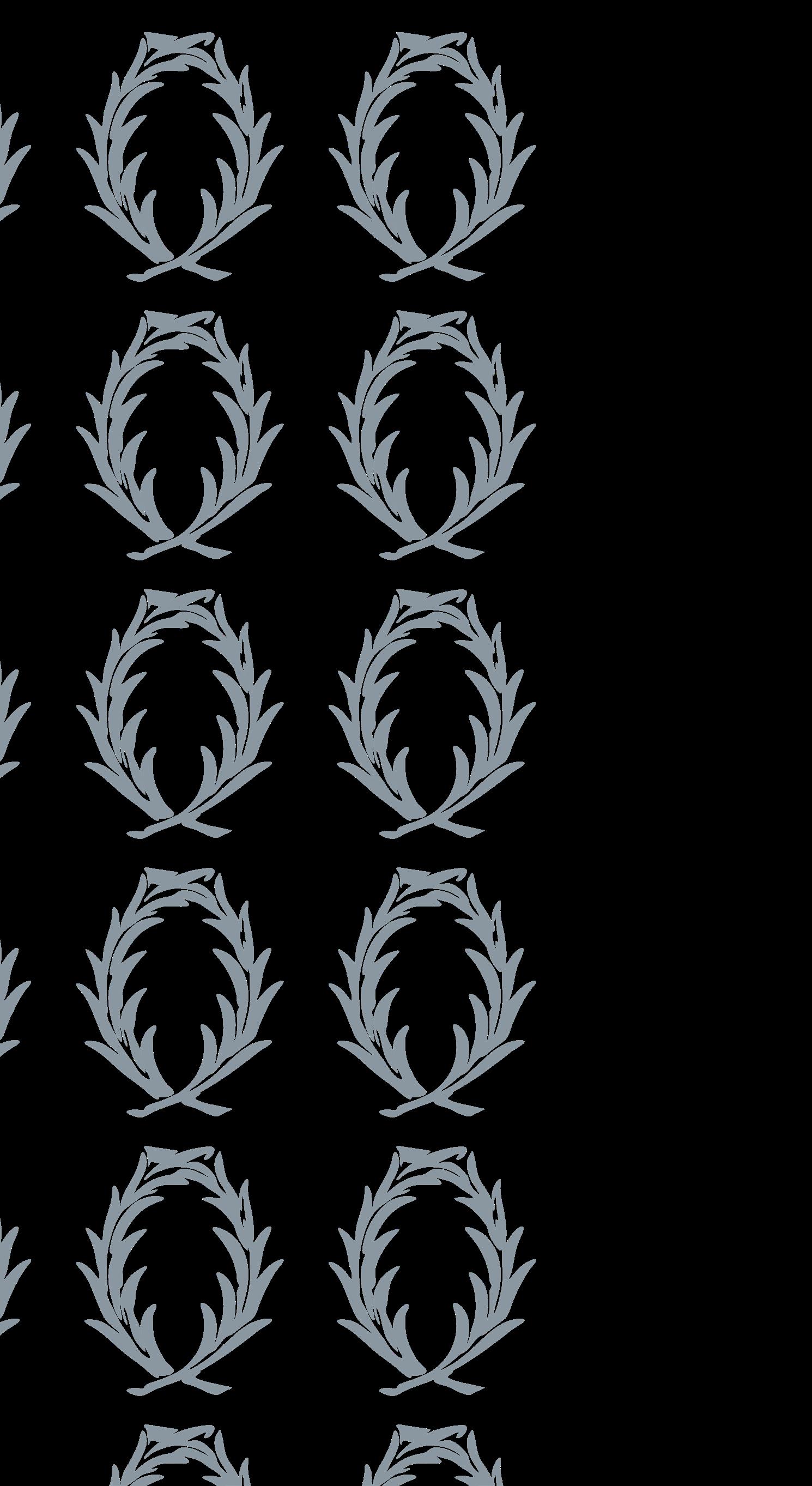
IMMERSION IN FRENCH AT EARLHAM LED OLIVIA RAMSEY TO BE KNIGHTED FOR HER CONTRIBUTIONS AS AN EDUCATOR AND COMMUNITY BUILDER. BY JAY KIBBLE

What do you get when you mix the beauty of multilingual, Francophone culture with an Earlham education?
If you’re Olivia Ramsey ’00, you get a knighthood.
On May 16, 2025, Ramsey received the insignia of Chevalier dans l’ordre des Palmes académiques, knighted by the French government for her efforts to bring Francophone culture to the U.S. through education.
Except this knight isn’t carrying a sword. She’s carrying books of Creole and French plays and has bilingual, curious children following in her wake as she spreads Francophone culture throughout Brooklyn, New York.
The Path of a Knight
At Earlham, Ramsey majored in both French and psychology thinking she would go into environmental law, but she learned quickly that it wasn’t for her. A job opened up at a Montessori school for a French teacher, and she knew immediately that she had found her calling.
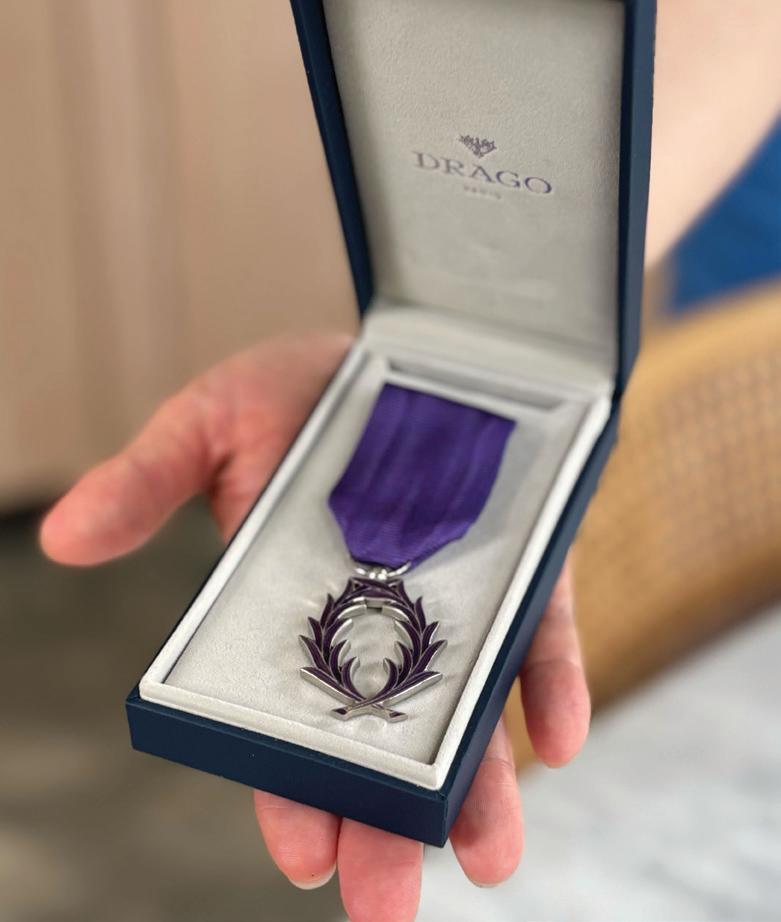
“I could connect with the kids,” she said, “but even more powerfully, I just loved it. It’s the most fulfilling career you could have.”
For her master’s, Ramsey attended New York City’s Bank Street College of Education, which is deeply rooted in the Quaker tradition. The school embraces a developmental-interaction approach to teaching, a philosophy that Ramsey uses in her own work as an educator. It emphasizes that children learn best through active engagement with materials, ideas, and people. Educators who practice this approach focus on the authentic growth of their students rather than standardized testing and outcomes.
“I could connect with the kids, but even more powerfully, I just loved it. It’s the most fulfilling career you could have.”
– Olivia Ramsey ’00
“That approach was such a beautiful continuation of the work and ethos at Earlham,” said Ramsey. “It is such a human approach to learning and child development and the importance of connections and our responsibility to each other, our communities, the planet, and helping children grow into goodness and spread that out into the world.”
After Bank Street, Ramsey worked at a therapeutic nursery school in lower Manhattan, but shortly thereafter was on a study abroad trip with Earlham, leading a French trip to Martinique with the late Annie Bandy, a professor of French and Francophone Studies at Earlham.
“Annie had this amazing ability to connect with artists, dancers, playwrights, actors. We had this incredibly rich experience that ultimately expanded my understanding of Francophone culture,” said Ramsey. “She was an influence as a professor, mentor and guide from the classrooms of Richmond, Indiana, to the streets of Paris, the hills of the Pyrenees and the beaches of Martinique. I was her student, and later her assistant director on the study abroad programs she led, where she taught us not only literature and language, but how to live with curiosity, purpose and joy. Annie opened doors I didn’t even know existed and changed my life in the process.”
A bilingual revolution
Trips with her professor lit a fire for Ramsey. She knew she had to find a way to combine her love of French language and culture with education. Little did she know, however, that she’d contribute to “bilingual revolution,” a grassroots movement chronicled by Fabrice Jaumont, a French scholar and author of Bilingual Revolution: The Future of Education is in Two Languages.
Little did [Ramsey] know that she’d contribute to “bilingual revolution,” a grassroots movement... founded by a French scholar.
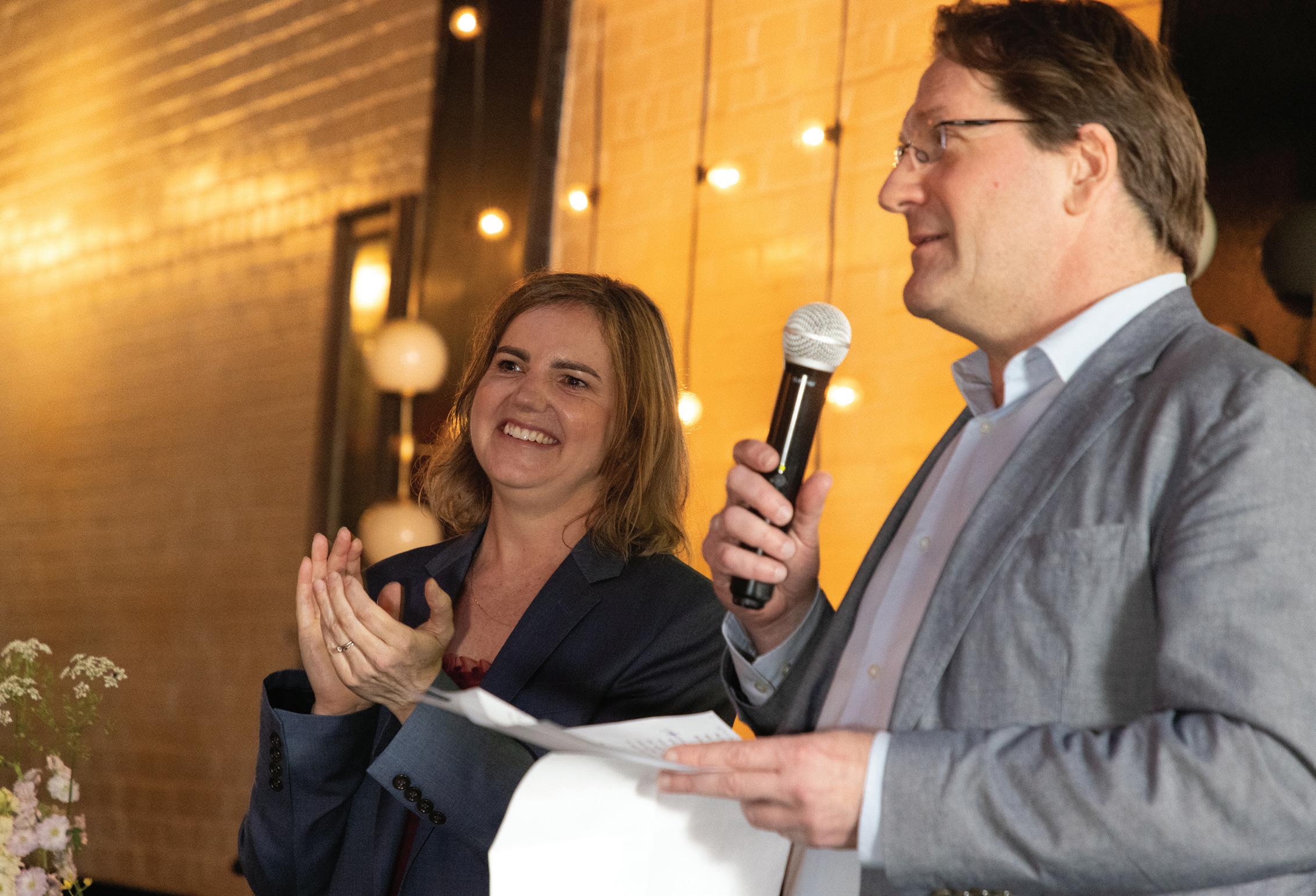
“It is driven by parents, educators and community leaders advocating for dual-language programs in public schools,” said Jaumont. “These efforts began in response to a growing awareness of the cognitive, cultural and social benefits of bilingualism — and a desire to preserve heritage languages, particularly in immigrant and diaspora communities.”
For French speakers and heritage learners, bilingual education offers a means to maintain a vital connection to their linguistic and cultural roots. For many, it’s about more than language; it’s about identity, continuity and inclusion. Families want children to speak the language of their grandparents, to access French literature and history in the original language, and to belong to a broader global francophone community.
“In today’s interconnected world, bilingualism is no longer a luxury,” Jaumont said. “It’s a necessity. Bilingual individuals enjoy cognitive advantages such as improved problem-solving, creativity and mental flexibility. Being bilingual enhances career opportunities, fosters empathy and equips young people to navigate a multicultural world with confidence and respect. Moreover, in a time when linguistic diversity is at risk, promoting bilingualism is a form of cultural preservation. It allows us to honor our roots while building bridges across communities.”
Such was the case for Ramsey, who applied for a position at the private bilingual school Lycée Français de New York, where she taught kindergarten for three years. She eventually was recruited to start the French Dual Language Program at P.S. 58, in partnership with the Cultural Services of the French Embassy in New York. Ramsey worked at P.S. 58 for five years and increased relations with the French Embassy and French government, helping grow the program from a couple kids to several hundred. Six dual language programs are based off of the one from P.S. 58.
Gradually, Ramsey was getting closer to her goals, both professionally and personally. During this time, she and her husband also had two children. To adapt to a family life, she began tutoring.
She started with five kids, but that number quickly grew and more popped up on her waiting list, eager for her teaching.
“I ended up with about 22 students, and I only worked maybe three to four hours a day, but it clearly was filling a need,” she said. “Whether it was academic support or French enrichment or even test prep, folks really wanted a connected and warm nurturing space for their kids to get individualized support.”
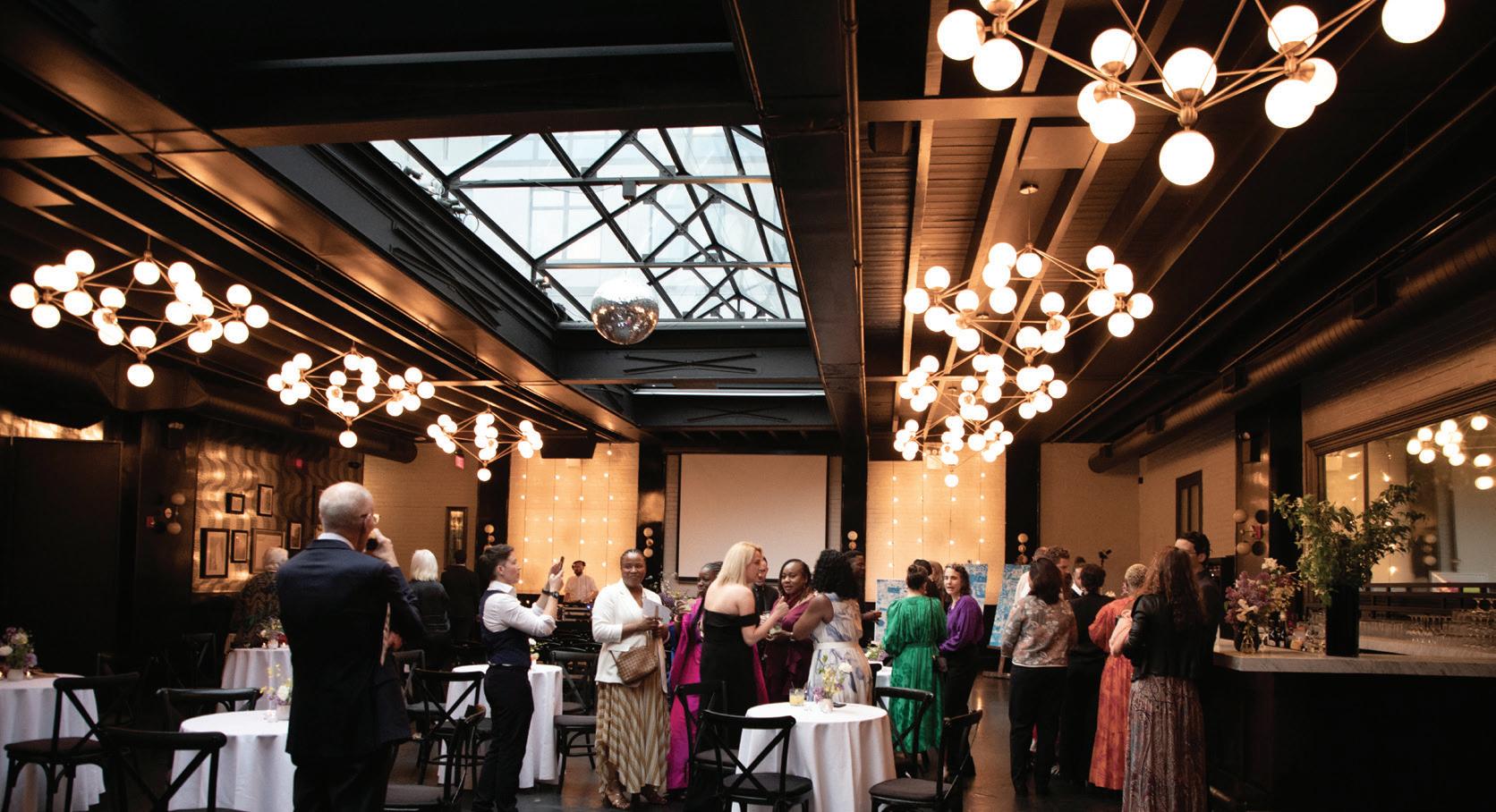

One of the families using Ramsey’s services offered a studio space for her to rent to expand her services and clientele base. This also allowed her to hire a staff of teachers.
Not long after, she established Smith Street Workshop, which led to establishing a formal preschool, Smith Street Maternelle in Brooklyn. Among her students is the daughter of the award-winning picture book author, muralist, and illustrator Katie Yamasaki ’99, who was enrolled from 2020-2022, and continues to attend the school’s summer camp.
Now, Ramsey has two enterprises. Smith Street Workshop includes test prep and tutoring for K-12 students across all subjects with even some casual adult language learning classes. Smith Street Maternelle is under the umbrella of the workshop, and is a special-
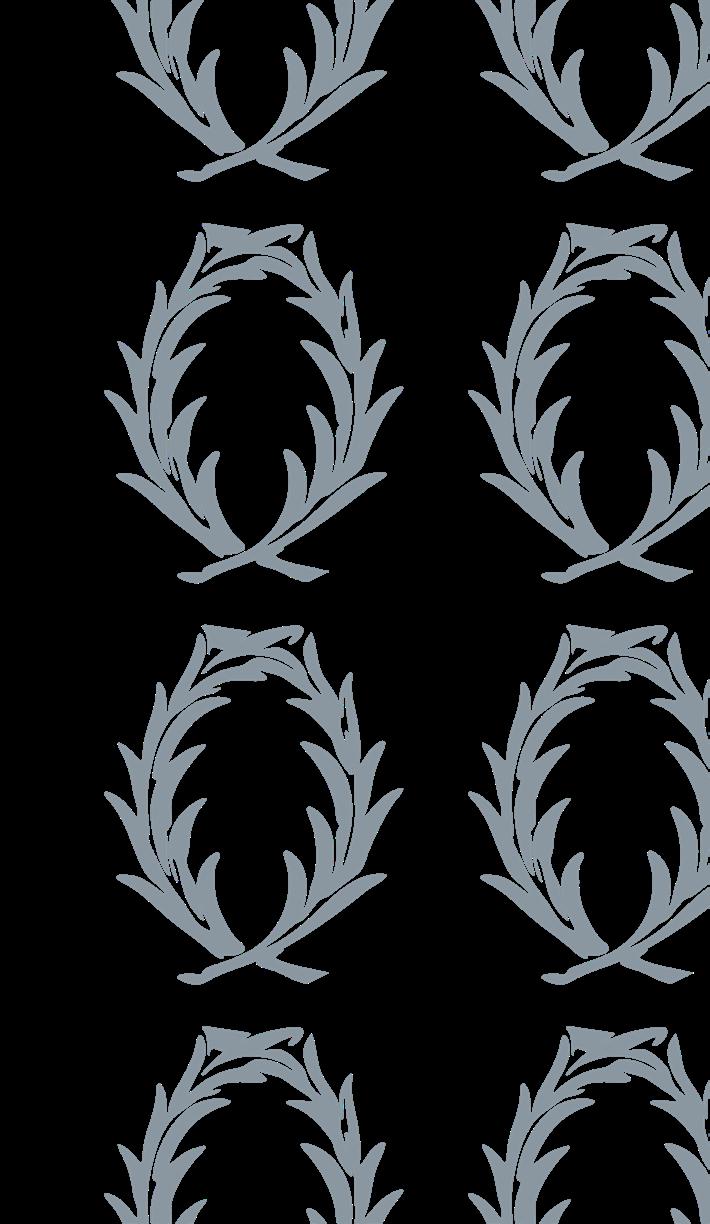
Guests gather during a gala in Brooklyn, New York, recognizing the 10th anniversary of Olivia Ramsey’s school Smith Street Maternelle.
ized bilingual education program for preschoolers. It includes sections for Toute Petite (2-year-olds), Petite (3-year-olds), Moyenne (4-year-olds), and Grande (5-year-olds) that cater to the unique educational needs of those young learners. Graduates of Smith Street Maternelle go on to join public dual language programs, the Lycée Français and other independent French-American schools, the United Nations International School and many of New York City’s most respected independent schools.
French blood
In 1983, when Ramsey was 4 — the same age as the students at Smith Street — her parents moved the family to the south of France for eight months. She remembers the time as magical and memorable: the gardens, the Mediterranean sea, the markets, the cafés, boulangeries, patisseries.
“It was a small town, Boulouris, where we got to know everyone pretty quickly,” she said. “It was unusual for Americans to be in France at the time, so we were the talk of the town. People were so kind, and I got a real feel for the culture, food, history and way of life that was so different from my home state of North Carolina. It felt like a total dream.”
When Ramsey came back to the U.S. with her family, she started kindergarten and always took French classes, through to AP French in high school. Her parents cooked a lot of French food at home, and there was always a family reverence for Francophone culture.
An unexpected test
On the heels of an important expansion of Smith Street Maternelle in 2023, Ramsey found out she had breast cancer.
“We had many families who believed and still believe in our mission and were counting on us, including my one daughter, Ida,” said Ramsey. “In February of 2024, after three surgeries and radiation treatment, it became very clear that the leadership demands of founding and expanding an elementary school were totally incompatible with what it took for me to get better.”
She made the hard decision to close Smith Street Maternelle’s elementary division and worked to place Smith Street students in new schools.
Heartbreaking, definitely — but the right thing to do, she said.
“There was no one else I could have hired to do what I was doing,” she said. “I was working 60 to 70 hours a week, totally stretched. The foundation was not strong enough for me to hand it to someone else at that point. My doctors also advised me to reduce stress as much as humanly possible if I didn’t want the cancer to recur.”
Even while having to pause plans of expansion, Ramsey still made her mark with her persistence and tenacity, and the French government took notice. In May, a soiree celebrated both 10 years of Smith Street Maternelle and the knighting of its Head of School for her efforts to expand French culture in the world. Featured music and cuisine were inspired by the vibrant cultures of the Francophone world — France, the Caribbean, West Africa and beyond.
After the ceremony, guests danced the night away and attended both live and silent auctions benefitting Smith Street Maternelle’s mission to cultivate curious, passionate, multilingual learners. Twinkle lights decorated the gathering room where a captive audience in formalwear watched as student artwork was auctioned, a knight was honored and a community cherished.
Jaumont, who nominated Ramsey, was also in attendance.
“This was already quite an incredible partnership between Olivia and I and the embassy of France, and our work together with me as the education attaché,” he said. “Olivia embodies the spirit of the ‘bilingual revolution.’ Her commitment to bilingual education goes beyond professional duties. She is a tireless advocate, connector and innovator. Through her leadership, she has helped launch programs that serve not only French-speaking communities but also students from diverse backgrounds who benefit from a global, multilingual education. Her efforts have helped children grow up bilingually and biculturally, opening doors to higher achievement and deeper cross-cultural understanding. Olivia’s impact is lasting: she’s helped build programs and partnerships that will empower generations to come. Her knighthood is a recognition of both her personal dedication and her broader contributions to the advancement of the French language and culture abroad.”
Vince Punzo, professor of psychology at Earlham and longtime friend and mentor of Ramsey, agreed that nobody else was more deserving of this award. He was in attendance at the gala alongside Megan Wilson Paris ’00 and other friends and family.
“In these polarizing times, it is easy to become despondent about the possibility for community, connection and respect to override tendencies that propel us toward polarization, conflict and divisiveness,” he said. “But Olivia has shown it can be done. The testimonials at the gala showed that Olivia’s efforts not only led to the education and holistic development of individual children, but also built a strong, vibrant community of people united in a spirit of cooperation, care, respect and civic mindedness.” ■ Photos by Kate Burton
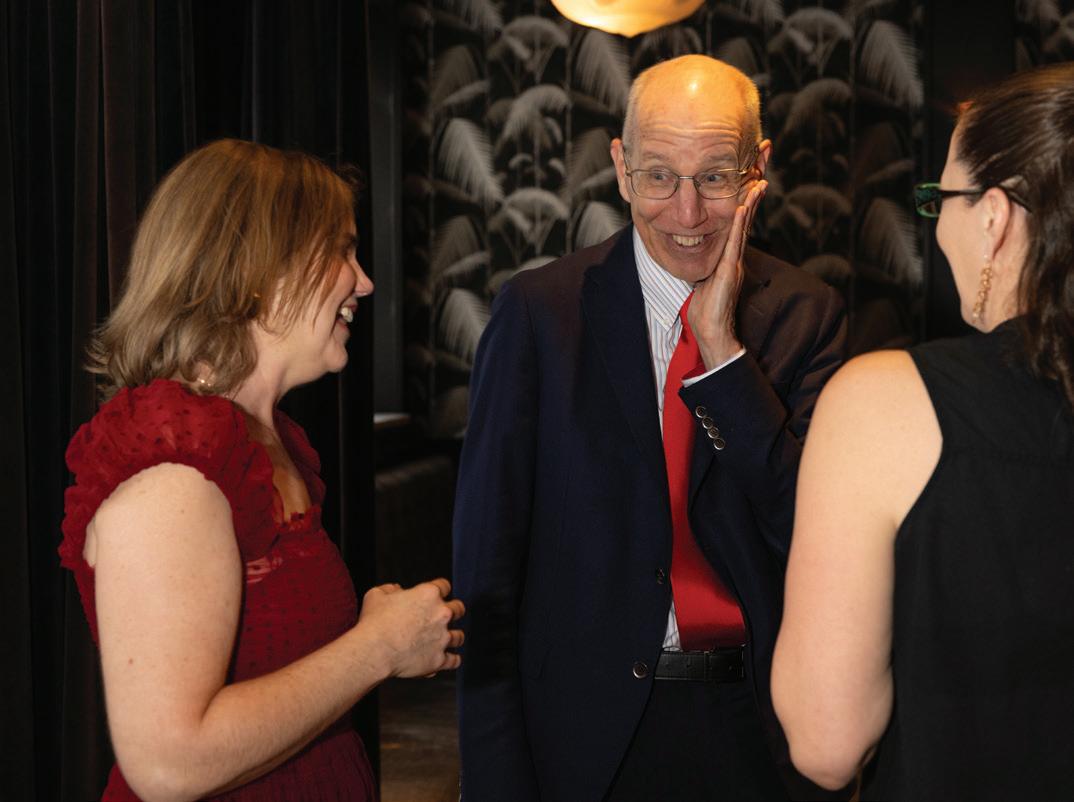
“Olivia’s efforts not only led to the education and holistic development of individual children, but also built a strong, vibrant community of people.”
– Vince Punzo
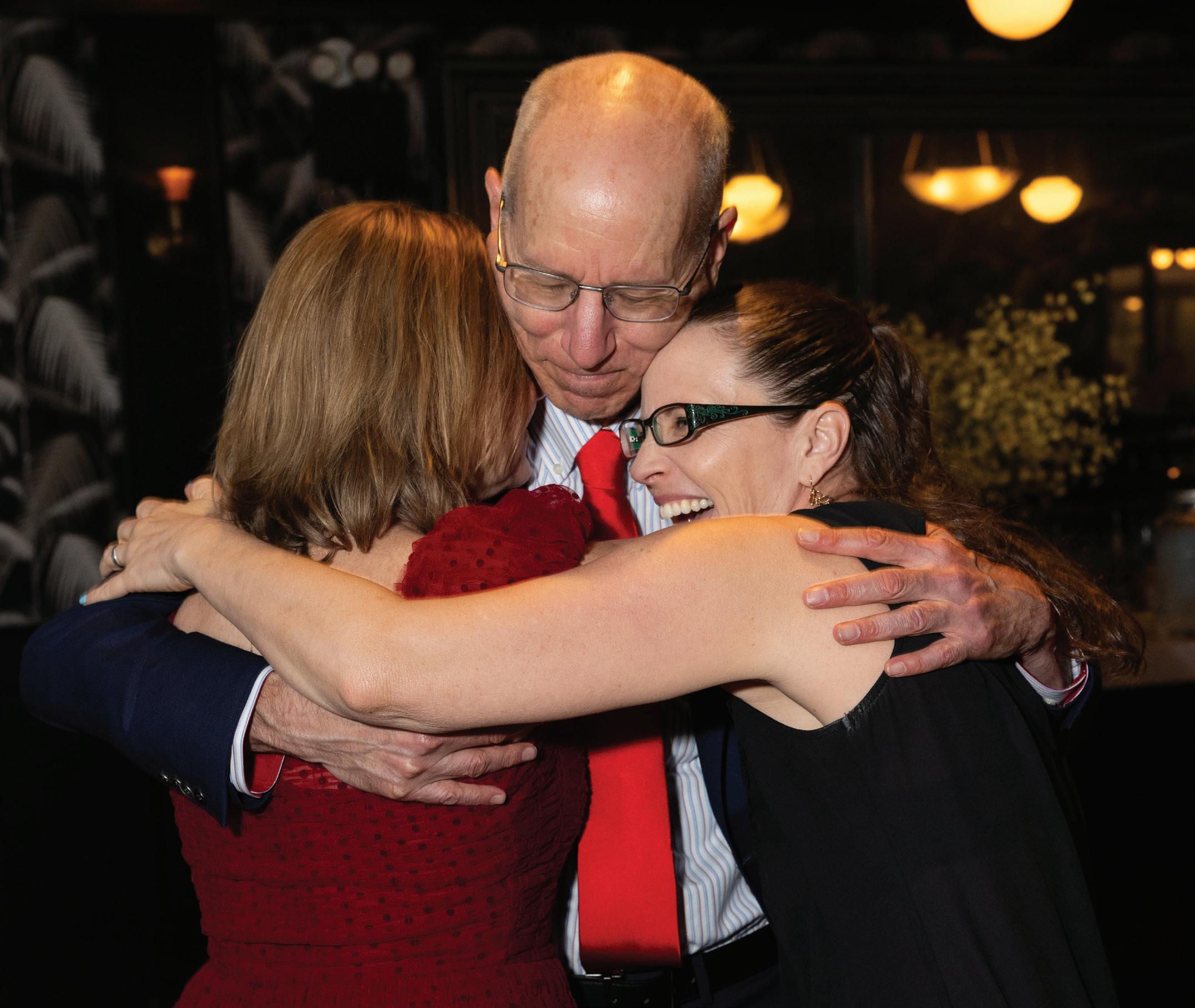


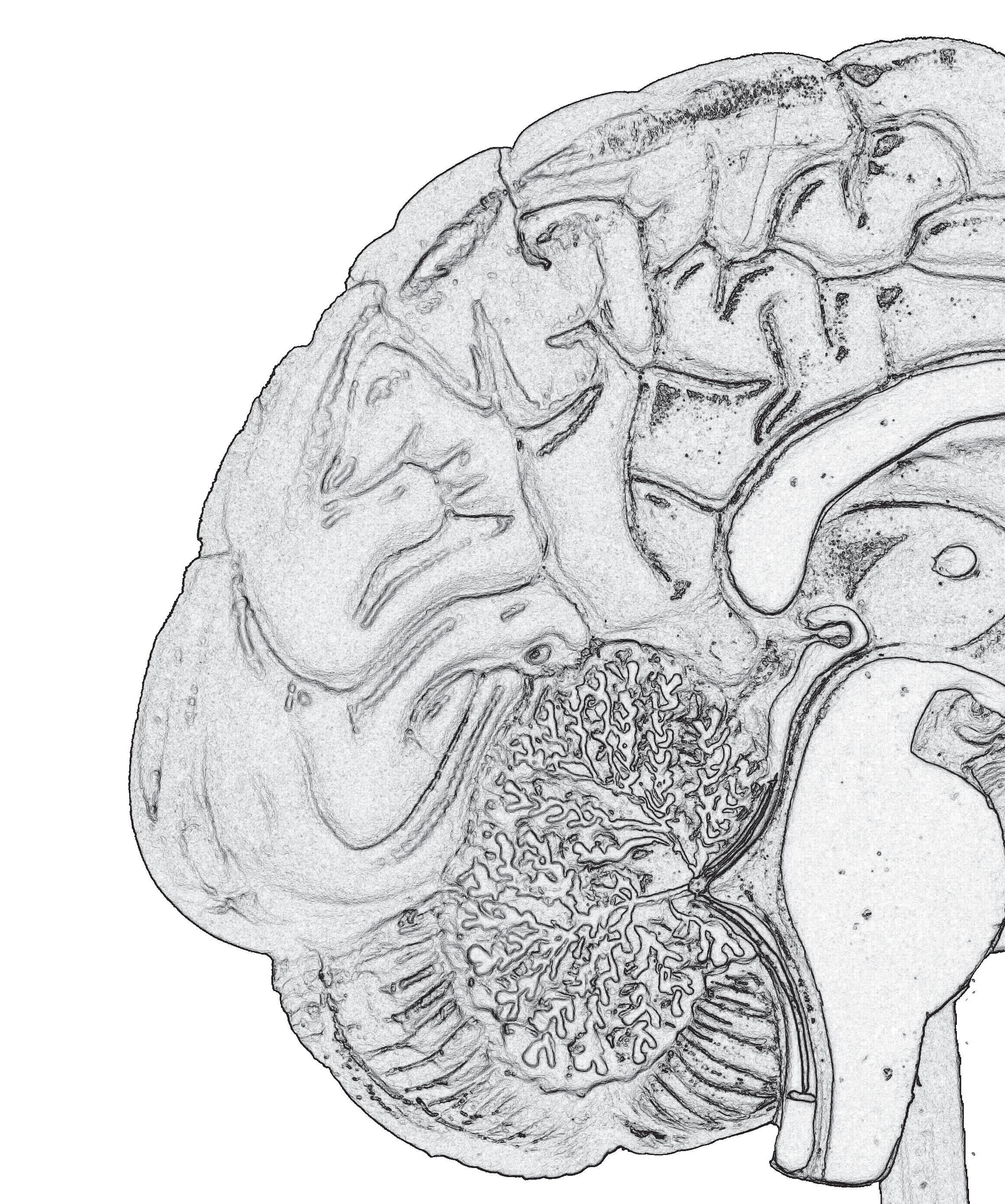


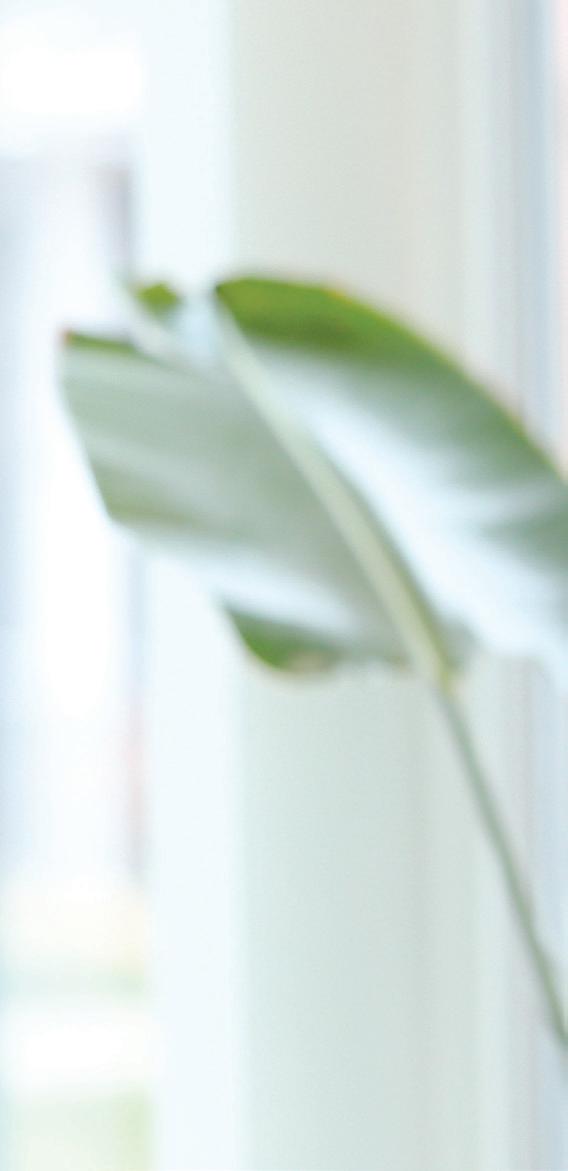

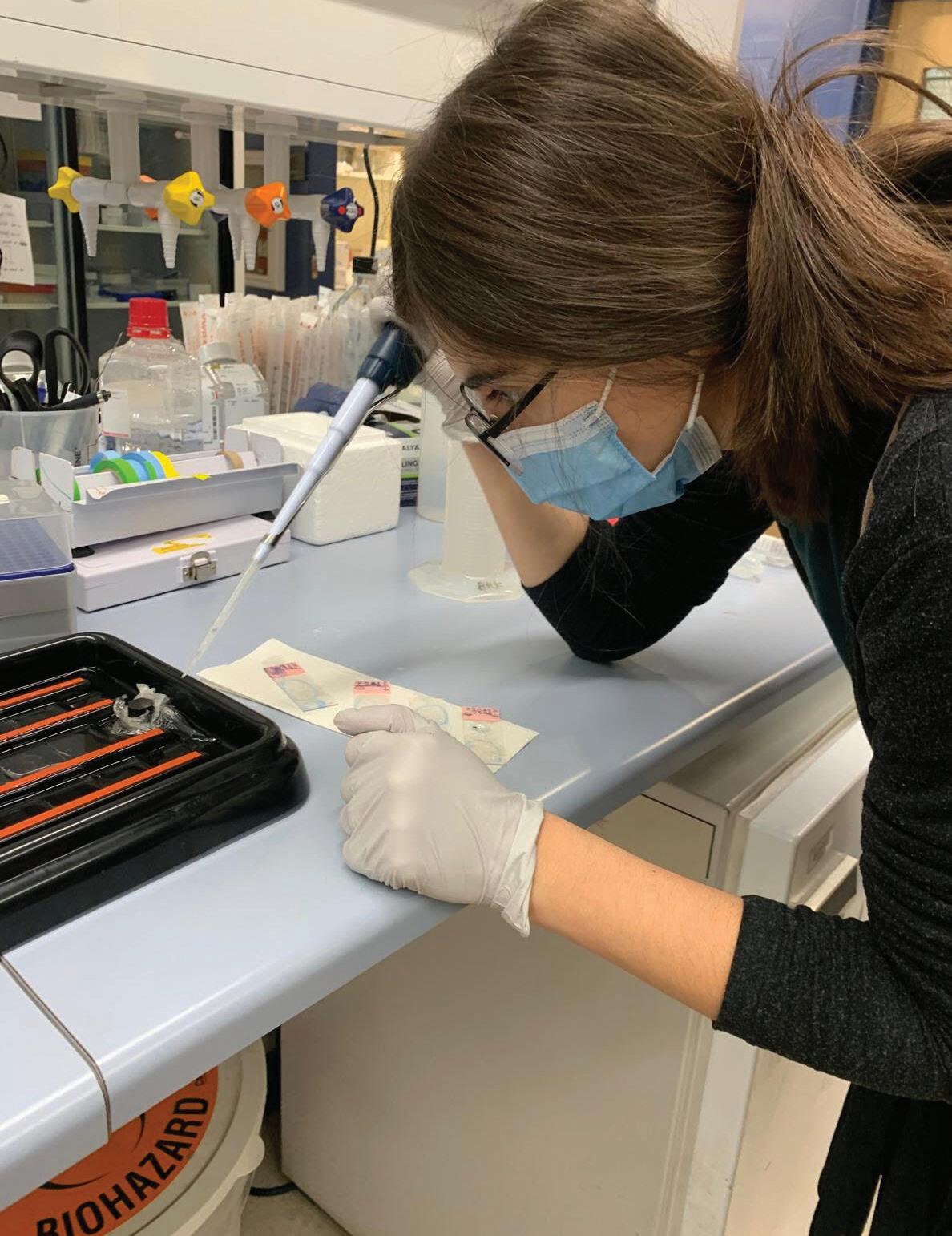
MATTERS
Earlham’s acceptance rate for medical school is nearly twice the national average. Here’s why.
By Abigail Curtis
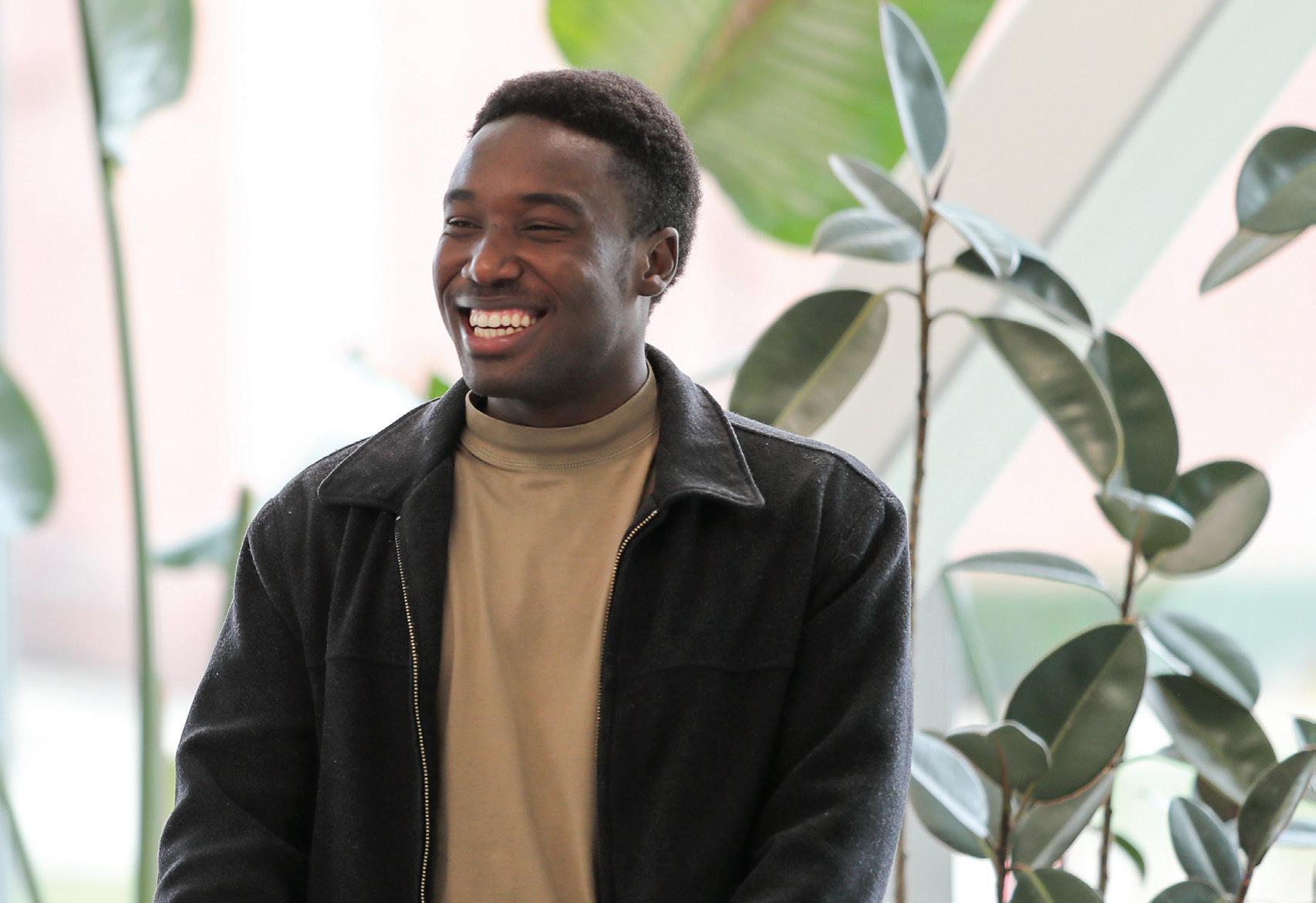
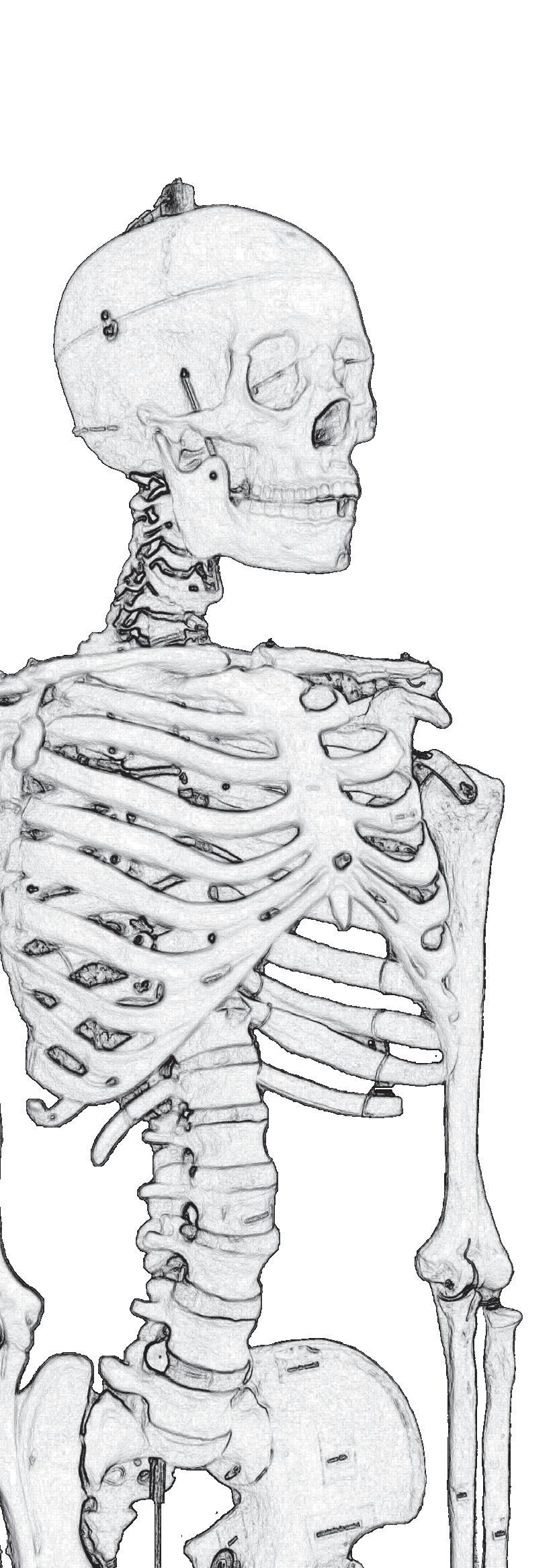

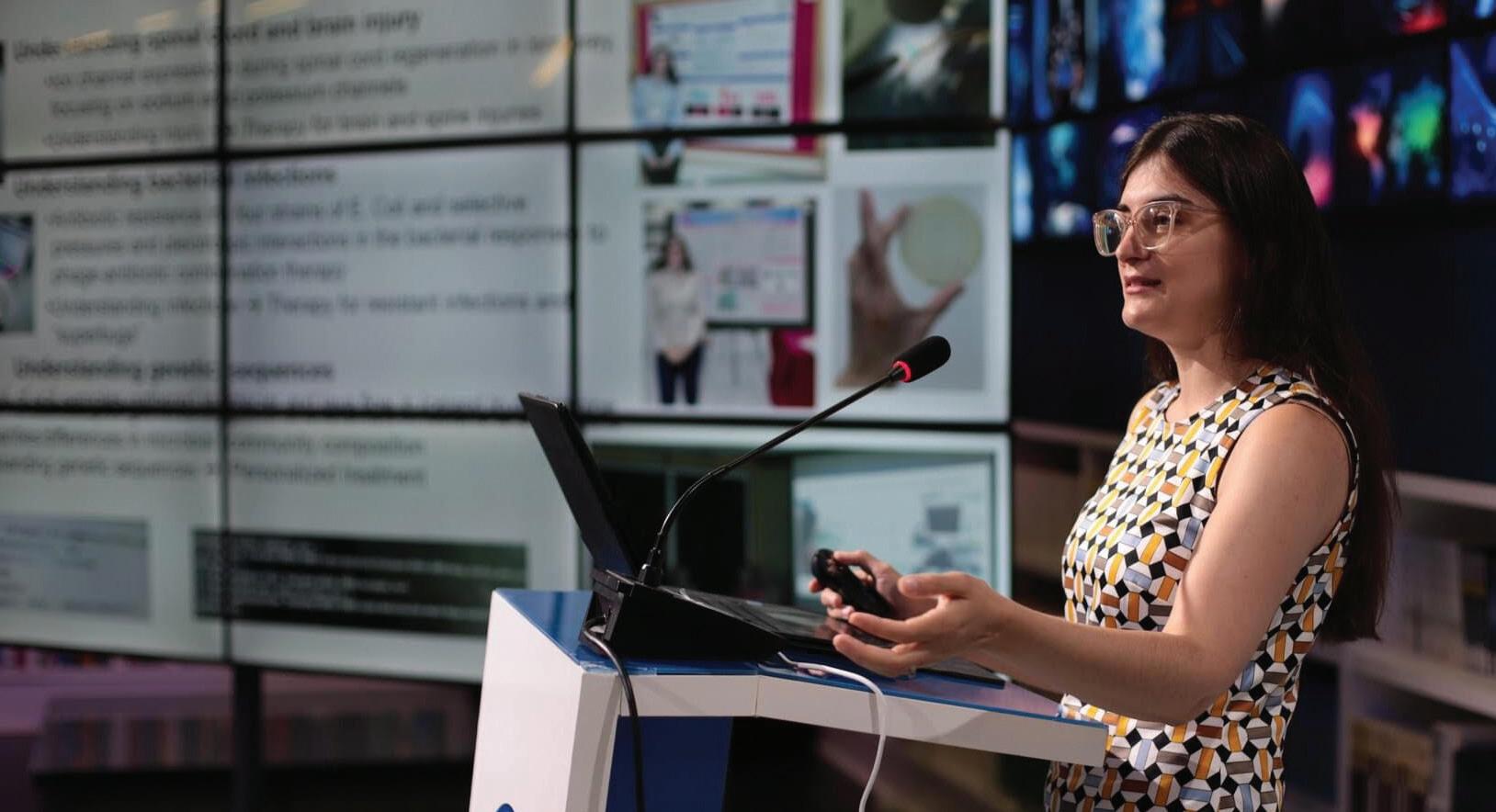
When Drenushe Krasniqi-Vanmeter ’21 thinks back on how an Earlham education helped her get into four prestigious medical schools, so many experiences and opportunities come to mind that there’s not a single factor in her success.
But one memory definitely sticks out. As a sophomore studying anatomy and physiology, she and her classmates had the rare opportunity to dissect a cadaver, translating what they were learning from their textbooks to the human body. Many undergraduate students don’t have the chance to see or touch a cadaver until they are a couple of years into medical school, especially those at liberal arts colleges, but at Earlham, they do.
Along with that opportunity comes another practice. Before the students touched their scalpels, they spent time in quiet contemplation to become grounded in the moment and thank the person who gave their body so that students could learn.
“For us to get to do that as sophomores in college, that was amazing. That taught me a lot,” said Krasniqi-Vanmeter, who will start medical school this fall at the Cleveland Clinic Lerner College of Medicine, one of the top medical schools in the country. “I think it not only motivated and inspired people, but also it prepared you for what it would mean to have a life in medicine.”
Experiences like these, and many others, set Earlham apart when it comes to preparing students for the study and practice of medicine. Graduates of the college have an 82 percent acceptance rate for medical school, which is nearly twice the national average.
Drenushe Krasniqi-Vanmeter presents at the University for Business and Technology conference.
Photo courtesy of Drenushe Krasniqi-Vanmeter.
The Earlham difference can be attributed to a combination of factors, including its strong curriculum in the natural sciences, unique local and global volunteer experiences and internships that provide a first-hand look at medicine, a network of involved alums who offer mentorship, and a dedicated advising team that has years of experience helping students navigate through the process of preparing for a career in the field.
But there’s something else that Earlham brings to the table, a common thread that connects the college’s ethos and values with the study of medicine. It’s not enough for a student to be academically prepared and do well on their MCATs, if they only have a vague idea of what a career in medicine will look like or why they want to be a doctor, nurse or other professional in the first place, according to chemistry professor and longtime pre-health advisor Mike Deibel.
“We also have this wonderful medical humanities program, and what that really does is bring home the human side of medicine,” Deibel said. “We want students to be successful getting to the career that fits them. But we also want them to start to think deeply about how they want to practice and how they want to be as a health professional. What kinds of relationships do they want to have with their patients and how do they want to influence their community? They can think about all that as they craft where they’re going.”
82 %
acceptance rate for medical school, which is nearly twice the national average.
A truly ‘Epic Advantage’
Some Earlham students start college already knowing that they want to go into the sciences or medicine, while others discover an aptitude and interest as undergraduates. Either way, they are able to participate in a broad range of medical opportunities while still enjoying thoughtful teaching and personalized advising. It’s a winning combination that prepares them well for medical school and beyond.
“We want to create health professionals who are people centered and have taken advantage of the liberal arts education, who understand empathy and compassion, and what it takes to interact with people who are unlike them,” said Peter Blair, professor of biology and director of the Center for Global Health. “And so we’ve been intentional as we have developed programs.”
One of those is the Center for Global Health, which is part of Earlham’s Epic Journey, the intentionally-designed and student-driven experience that combines bestin-class advising and experiential learning opportunities. Students also benefit from the college’s Epic Advantage, which guarantees that they will all have access to a funded experience that will help them figure out their careers. Thanks to donors, these experiences are free to students up to $5,000.
Epic Advantage makes it possible for many students to have a global health experience, such as summer trips to Peru and Costa Rica. Faculty lead these trips, which connect students with medical teams doing campaigns in underserved areas through carefully vetted partner programs. Students stay with families so they can practice language skills and learn about other cultures.
“We want to make sure that our students are getting authentic, real and trusted experiences with the local communities there,” Blair said. “We’re going there and learning from others.”
“We want to create health professionals who are people centered and have taken advantage of the liberal arts education, who understand empathy and compassion, and what it takes to interact with people who are unlike them.”
– Peter Blair
Other experiences available to students include robust health externship and community medicine programs, through which pre-health students can gain practical experience volunteering, job shadowing and training. A student interested in physical therapy might, for example, spend eight weeks working with physical therapists at the NCAA Sport Science Institute in Indianapolis.
“And they say, ‘Oh, you don’t have to pay me. My college will pay me a stipend that covers my living expenses,’” Blair said. “That’s one of those unicorns that we have right now that every student at Earlham can take advantage of.”

Discovering a calling
Sarah Dickman ’22 just finished her first year at the University of Cincinnati Medical School. The idea of a future in medicine didn’t occur to her until she was a college sophomore. That’s something that is not that unusual at Earlham.
“I don’t think I’m the only one who has had this experience of being almost converted into a pre-med student,” she said. “I think it’s just because the professors do such a great job of presenting really difficult material in the sciences in a really digestible way, and they make it exciting. I think it has more of a drawing-in effect, rather than scaring people off.”
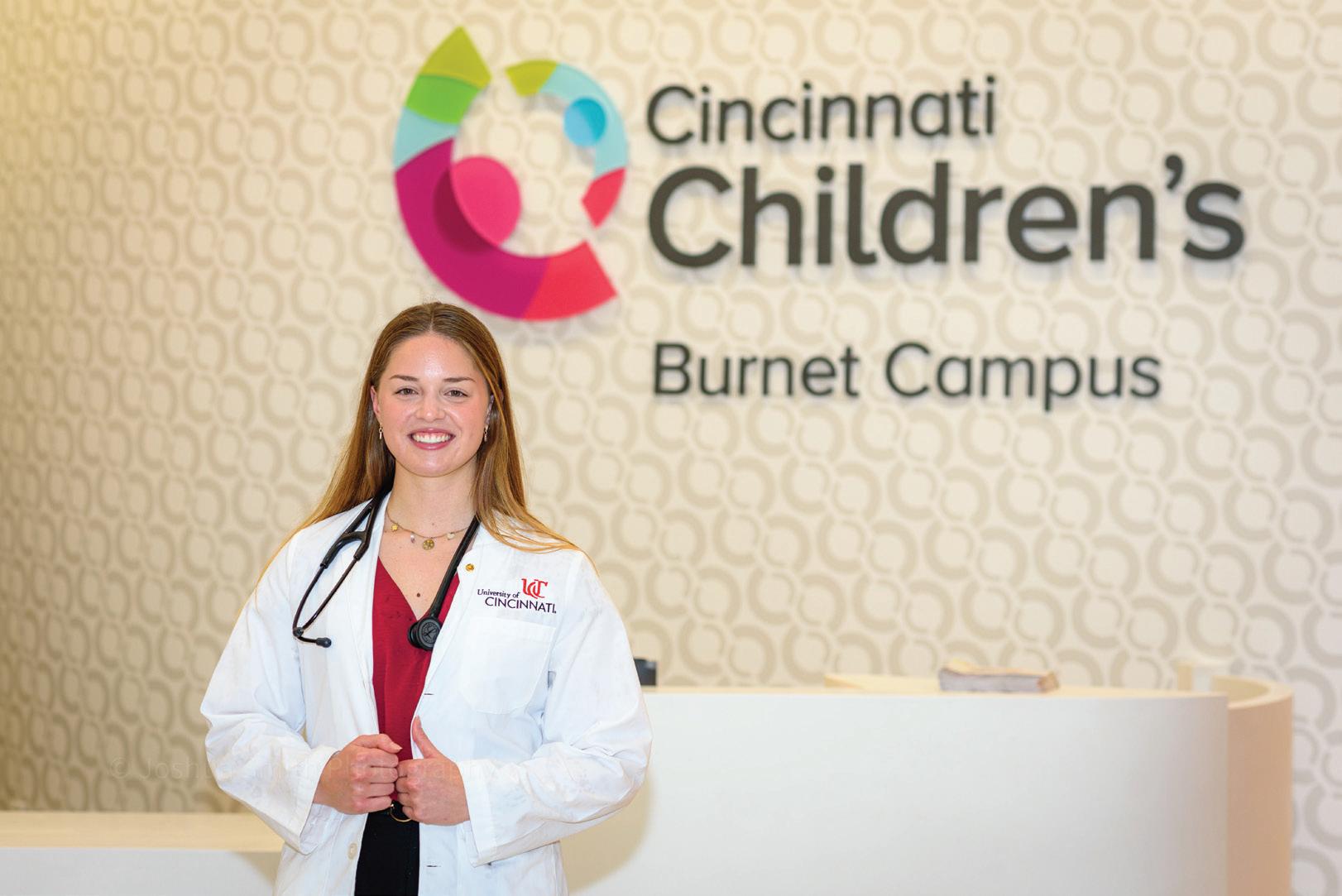
Dickman, a biochemistry major and student-athlete from Richmond, was captivated by her science courses. At first, she considered going into animal or ecological biology, but her experiences working as a pharmacy technician in a local hospital and participating in a community health coach program where she was able to do home visits with an emergency medical services provider helped change her direction to medicine.
“Everything was tailored to me. All of my experiences, all of my advising, it was all tailored towards my passions while also setting me up for success.”
rigorous coursework with sports, continuing to play volleyball and run track for the College. She also got to know her community better through the home visit program, which aims to check up on people in the Richmond community who are frequent users of the emergency room.
– Sarah Dickman ‘22
“I really enjoyed feeling when I finished for the day that I had done something meaningful in someone else’s life,” she said.
She learned more about how Earlham is special once she did get on the pre-health track.
“At a lot of other schools, it seems that there’s a checklist, and it’s what you do to get into medical schools, whereas I never felt like that at Earlham. They really encourage you to explore your passions and the things that you love,” she said. “Everything was tailored to me. All of my experiences, all of my advising, it was all tailored towards my passions while also setting me up for success in the application process.”
That meant she felt supported as she juggled
“It was a unique experience because I got to go into people’s homes in my own community and the surrounding communities and sit with them and talk with them about their health concerns,” Dickman said. “We wanted to make sure they were doing OK and see if we could help make their lives easier in some way. I really do think that experience opened my eyes to my own community even more.”
Global and local perspectives
Cyrus Buckman ’18 recently finished his medical and MBA studies at Stanford University in California, where he is a Knight-Hennessy Scholar. He plans to do his medical residency in the U.S., likely in the field of psychiatry, and hopes to return to practice one day to his home country, Ghana.
At Earlham, Buckman participated in several experiences that helped him get a clearer sense of his own path. In one, he and other students traveled abroad to explore safe medication delivery and needle exchange

programs. They started with a visit to needle exchange programs in Chicago, then went to the U.K. and Iceland to understand ways that those countries supported people at risk for drug misuse and addiction.
He went on an Epic Advantage-funded global health trip to Peru, where he assisted medical practitioners as they provided free health care services such as blood sugar tests, blood pressure checks and physician referrals to people living in rural areas.
Buckman also did an externship at Reid Health, where he shadowed several different doctors with varying specialties. Earlham did a good job organizing the program, he said, helping him get placements and free transportation to and from the hospital — which he has heard from medical school classmates is not a universal expectation.
“Those were all experiences that I thought helped me get a better sense of what medicine looks like, not just in the U.S. but also in other countries,” Buckman said. “There are lessons from other locations we could implement in the U.S., and things in the U.S. that we could take to other places, all with the goal of ensuring that all people everywhere are getting good access to health care resources.”
He believes that all those experiences helped him stand out on his medical school applications. The Stanford Medical School, one of the country’s top medical schools, has an acceptance rate of just over 1 percent.
“On applications, people are looking for experiences where you’ve had a chance to be in a hospital, you’ve had a chance to work with physicians, and you’ve gotten a preview for life as a physician,” he said. “I felt prepared while going into the application process, and a large part of that is thanks to the support that I received as an undergraduate.” ■ Photos of Sarah Dickman by Josh Smith. Photo of Cyrus Buckman courtesy of Stanford University.
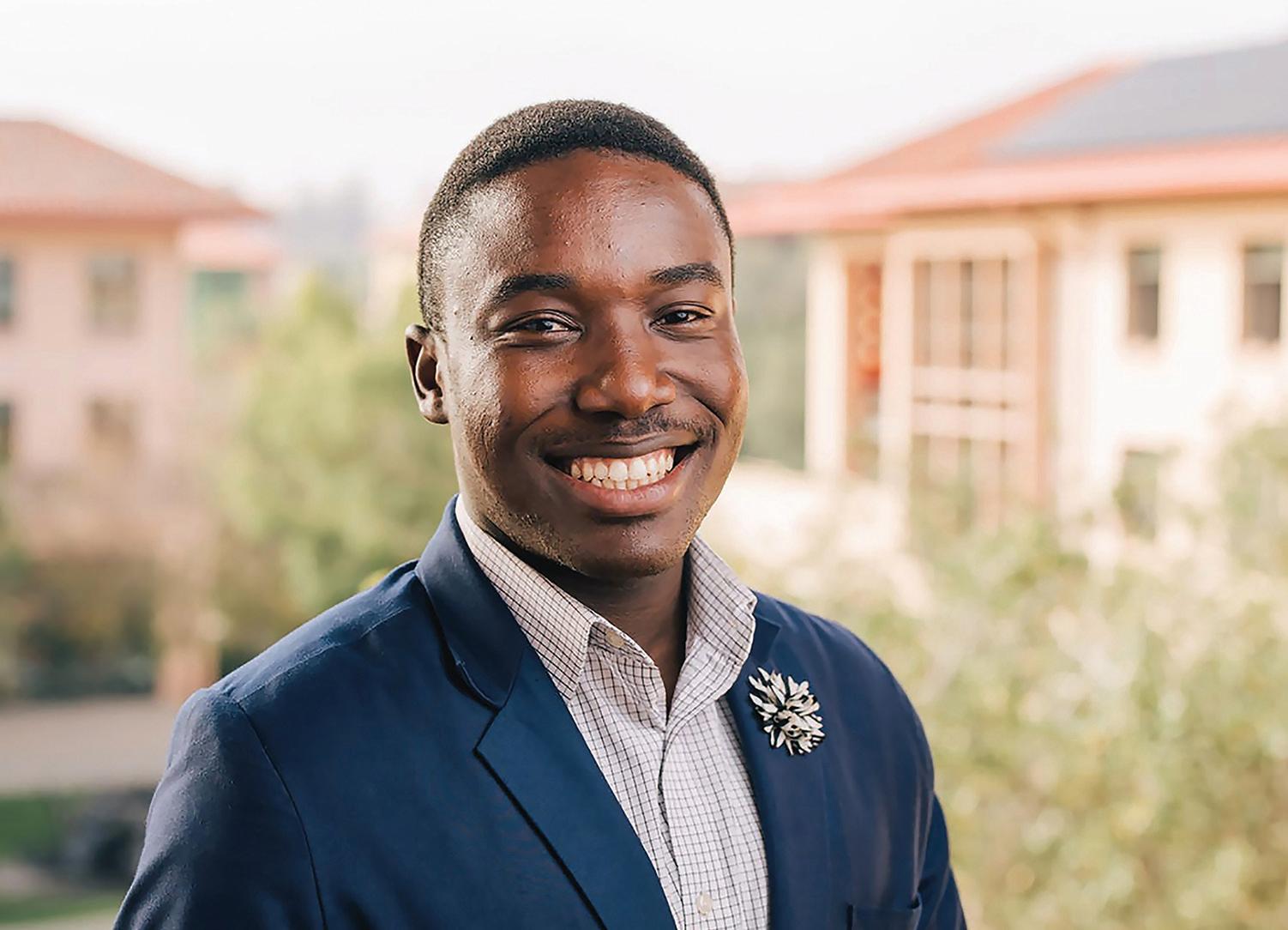
Alums who care
The Earlham alumni network makes a difference, too. Philadelphia pediatrician Hans Kersten ’86, a member of the Alumni Council, often offers summer internships to Earlham students. They help him do important work that undergirds good health outcomes, including providing healthy food to patients in need through a summer meals program, a community refrigerator and a program which writes prescriptions for boxes of food.
For Kersten, who has seen first-hand how food insecurity negatively affects people’s health, alleviating food insecurity is a passion he’s glad to share with the students. They read and serve meals to children, help with health screenings, stock the refrigerator, and observe how providers interact with families and connect them with resources.
“Our families have a lot of resiliency, but they face a lot of challenges,” the doctor said. “I think that Earlham teaches you to think about problems and also solutions to problems.”
Another Earlham alum who is working to help current students is William R. McFarlane ’65. He has worked for 50 years as a doctor, teacher and researcher who developed new treatments for schizophrenia and has led efforts to prevent the onset of psychotic disorders.
For McFarlane, his Earlham education was so fundamental for his success at medical school and then during his career in medicine that he recently established the Earlham College Future Physicians Scholarship.
“Earlham fosters not only skilled doctors but compassionate ones,” he wrote. “Today, cost often dictates who becomes a doctor and what kind of doctor. Too many students are pushed toward high-paying specialties to manage debt, rather than choosing public service, psychiatry or research.”
McFarlane has committed $100,000 as a dollar-for-dollar matching challenge for the scholarship fund, and is encouraging all fellow Earlham physician graduates to rise to the challenge.
“Earlham shaped us into the doctors we are today, and now we have the chance to pay it forward,” he wrote in a letter to the Earlham physicians. “Your gift, no matter the size, will directly support talented students who might otherwise be unable to pursue a career in medicine.”


Competition, Collaboration, and the Quaker Spirit
BY AUBREY EVERETT
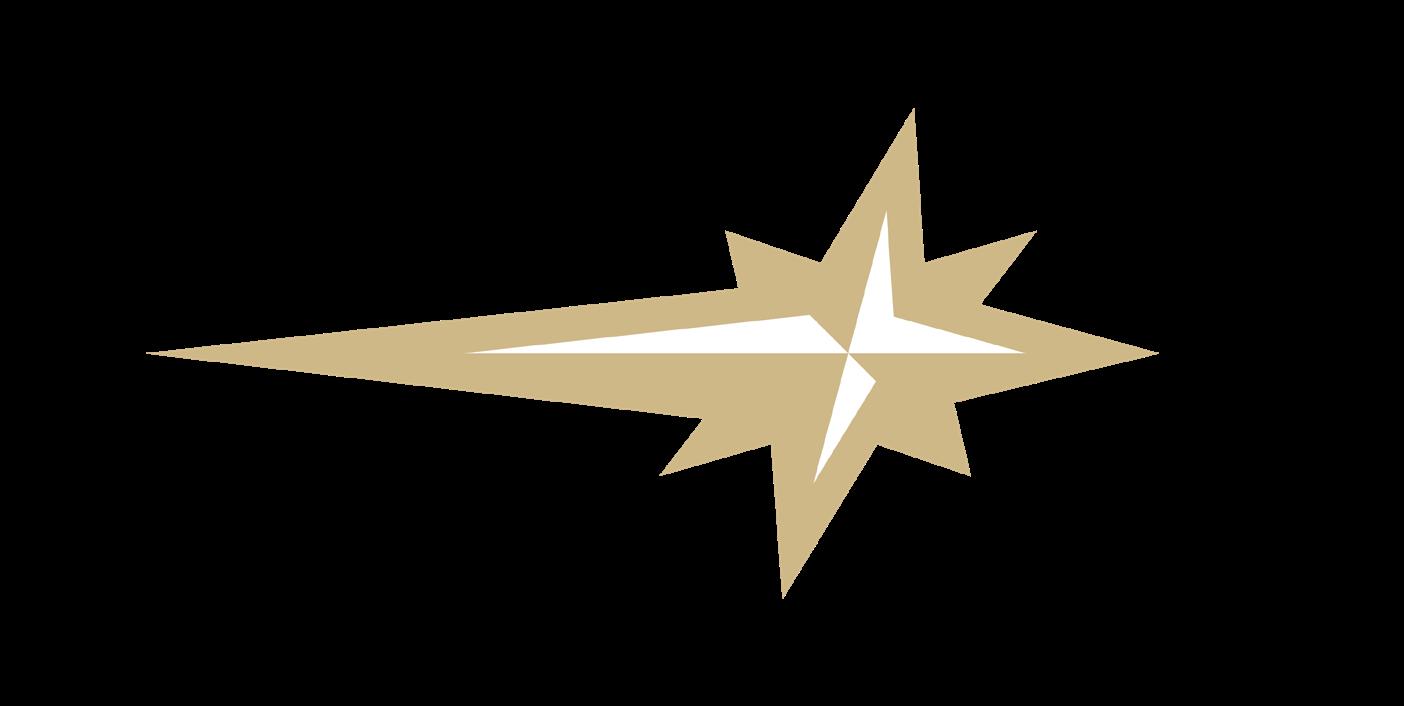
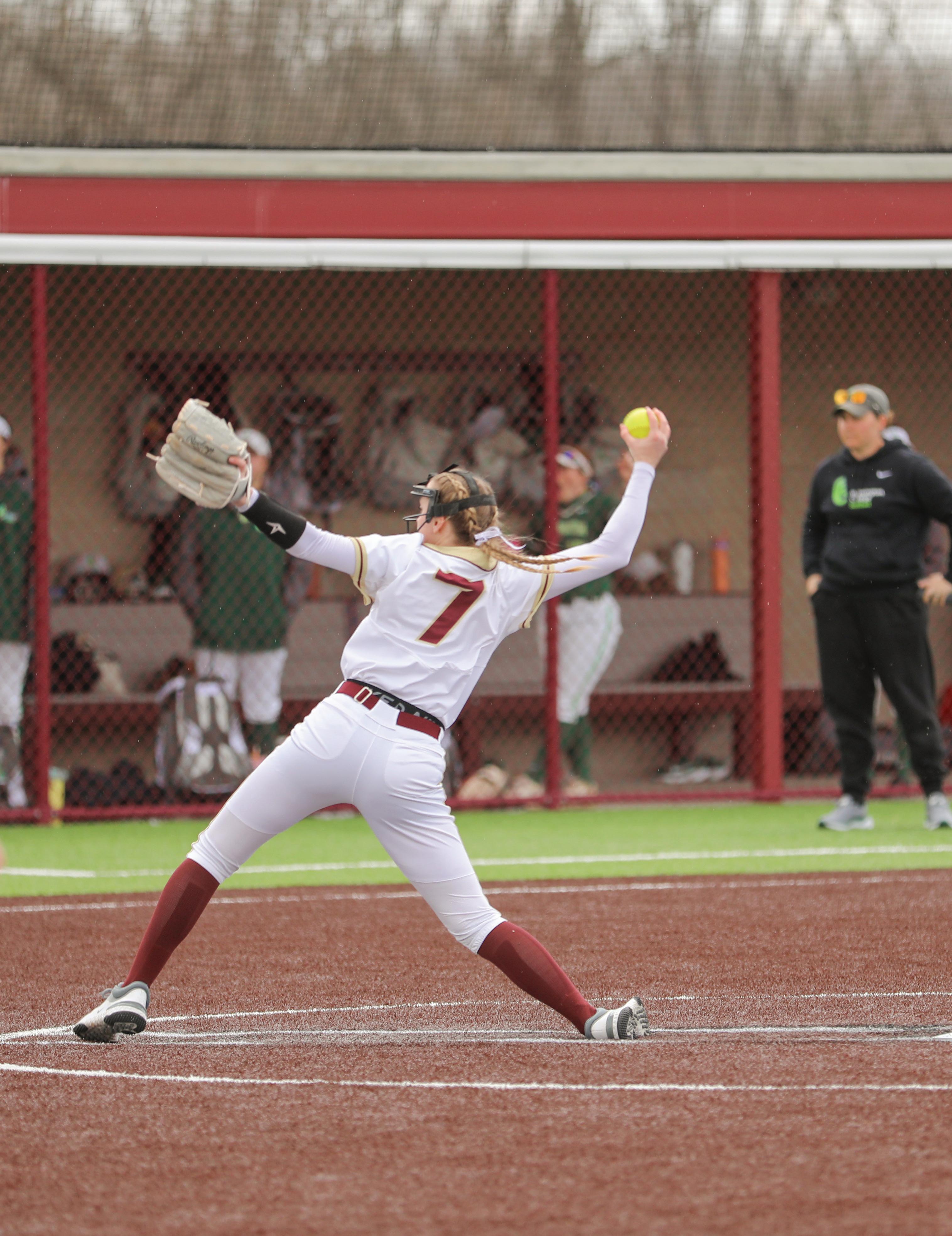

Job well done!
The goal was to have a breakout season, and the Earlham women’s softball team did just that. In only their second year, they have proven themselves to be one of the school’s most competitive programs.
Behind the leadership of head coach Stacey Goyette, the softball program’s goal was to build with intention. Year one was for learning, and this second year was to build upon that knowledge and break through. Goyette said she hoped for a win-loss record above .500 and to qualify for the postseason as a seed higher than six.
Goyette and her squad blew both of those goals out of the water, finishing the season with a 25-16 overall record, qualifying for the Heartland Collegiate Athletic Conference tournament as a three seed, and finishing third place overall. “I am proud of the players, their efforts and their commitment to raise the bar of expectation,” Goyette said. “Satisfaction in a job well done.”
As a young team — all 23 members of the roster were first-years or sophomores — there is a certain amount of culture-building that must take place to achieve that level of success. Goyette said a spring break trip to Florida presented the first challenge, as the team lost their first three games. They took a moment, regrouped and went on to win the next five.
“The chemistry to ‘play for each other’ takes time to cultivate. It doesn’t happen overnight or come with an instruction manual. We focus on being the best human possible and take it from there,” said Goyette, who had two sophomore pitchers land on the Heartland Collegiate Athletics Conference all-conference lists, Tatum Rickert ’27 and Morgan Cooksey ’27. “Team camaraderie is an ongoing process. The players grow and mature individually, and the team culture has to adapt with them.”
“Seeing how much progress we made as a team was exciting and motivating. Everyone bought in, worked hard and pushed each other to be better,” said Ariel Clarkston ’27. “There was a strong sense of unity and trust, and I think that showed up in how we played.”
In late March the Quakers won both games of a double-header against Franklin College, who placed second in the conference last season. “After those wins, we knew we were for real,” said Goyette.
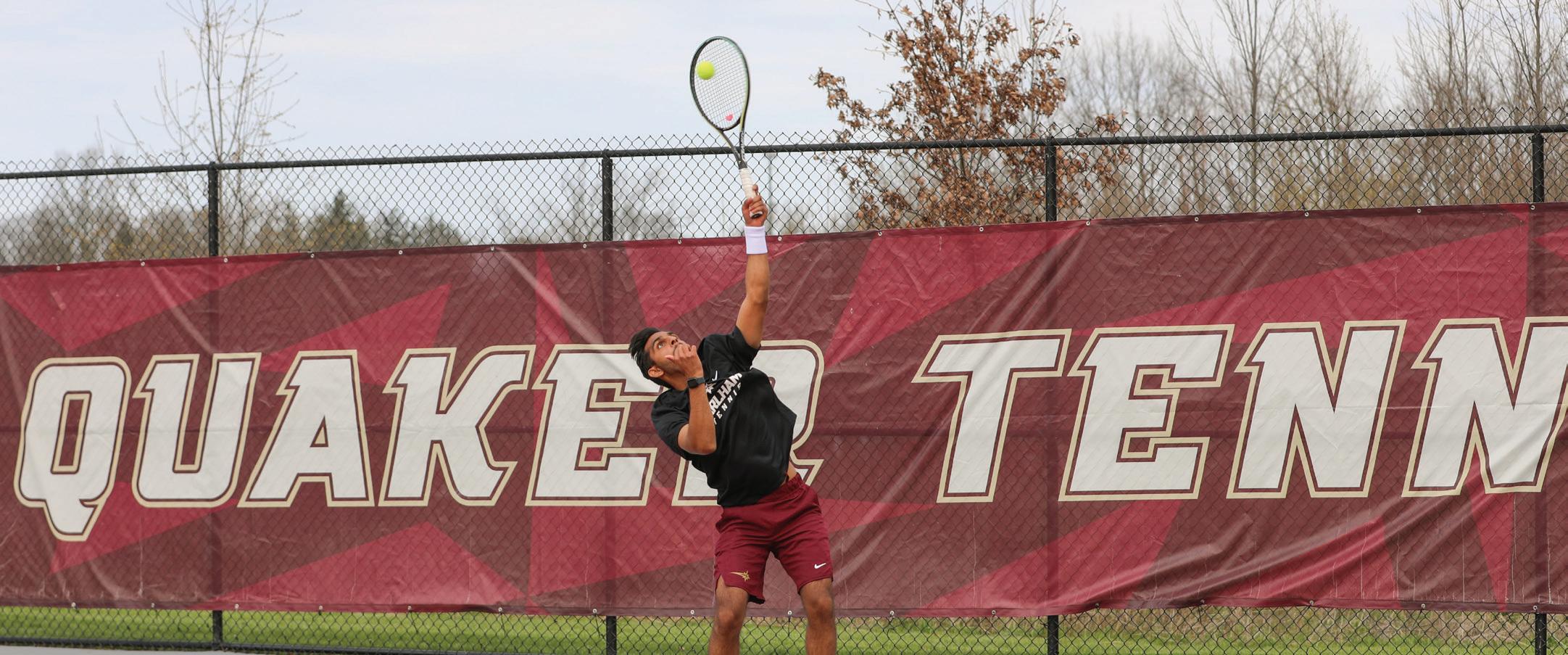
Match Point
The men’s and women’s tennis teams concluded dual successful seasons, playing off each other’s strengths and achievements to end their strongest seasons since the programs returned to Earlham in 2022.
The women’s squad made it to the conference championship match, finishing second to Transylvania, while the men qualified for the tournament and had an improved conference showing. The addition of three mid-year transfers, all of whom made the Heartland Collegiate Athletic Conference first-team all-conference list, injected a boost of momentum into both lineups.
Jack Lunn, head coach for the men’s team, who finished the season 11-11, said this season was particularly
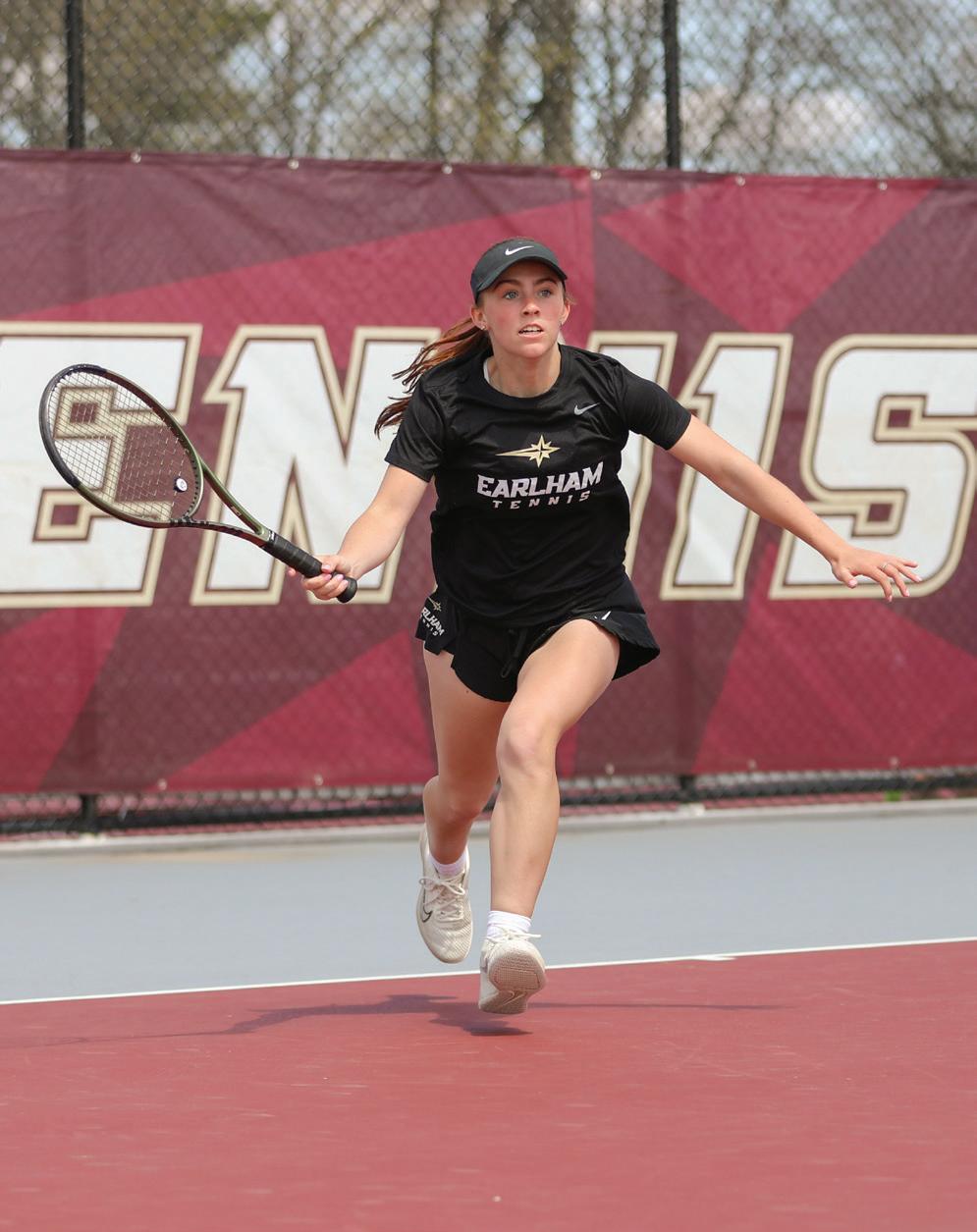
rewarding because they achieved success with a group of players who came to Earlham with the direct intention of playing tennis.
“It was the start of a new chapter for the program in terms of the level of player and the level of commitment,” said Lunn. “They were really enthusiastic about being that first team that was able to come out and have competitive success in this iteration of the program.”
The women’s team finished 11-9 overall, and 5-1 in conference play. “More than our successes this season, what was more enjoyable for me was to see how we all interacted with each other,” said women’s head coach Jacob Freeland.
The two squads spent a significant amount of time together off the court. Team bonding activities included roller skating, dinners off campus and a Halloween bonfire. There was also a mixed doubles competition and Earlham Wimbledon, an alum event during homecoming weekend.
“We often hit with some of the guys on the men’s team, and I think in doing so we developed a bond with them,” said Mackenzie Davis ’28. “We simultaneously helped each other improve.”
This solidarity was on display when Transylvania came to play the men’s team mid-season. That Saturday the women’s team happened to have the day off, so they showed up to support their fellow athletes. Even though Earlham lost, it was an extremely close match against a previously dominant foe.
“I have never heard anybody yell louder,” Freeland said. “I’m not trying to take credit for that, but I think the women’s team deserves a tiny sliver.”
Davis described a nurturing environment for student-athletes, one that allows for excellence both on the court and in the classroom.
“I love how Coach Freeland is understanding of our academics, and how the professors are understanding of athletics,” said Davis. “Earlham fosters a good environment where there is a perfect opportunity to mix achieving an education, while being able to improve in sports.”
Freeland said next year they aim to schedule more individual tournaments in the fall, followed by team matches in the spring, typical for Division I and II programs. The team also expects new recruits, while the current slate of young players continues to improve.
“We had team members who lost to a certain player in the fall and then played them again in the spring and won. When that happens, to see that player light up after the match, it’s really, really nice,” said Freeland.
For the men, the top eight players will be returning this fall, and the ultimate goal is to compete for a conference championship. With four different continents represented, Lunn is proud of the multicultural environment they have fostered within the program.
“We’re set up in a place where we have the talent and the mental cohesion within the program,” said Lunn. “We’re really confident that we can go out and accomplish that next year.”
Stick with it
After some offseason changes and a year marked with confidence-boosting wins, the Earlham men’s lacrosse team recorded a successful season, earning a number three seed in the Heartland Collegiate Lacrosse Conference postseason tournament. For his role in leading the team and setting strong expectations, head coach Taylor Lanzillo was named HCLC Coach of the Year.
“The award means a lot to me in regard to the program and where we are headed. I cannot do my job and passion without the people who are a part of our program,” said Lanzillo. “The Coach of the Year Award in my eyes has always been a team-based award, and I’m happy for the team.”
Lanzillo, who has been with Earlham since 2022, takes a holistic and intentional approach to coaching, evaluating each player as an individual with a unique set of needs.
“Each of my guys has a different way they need to be approached and coached on and off the field,” said Lanzillo. “That’s what makes coaching fun. You really get to connect with the players and build those relationships.”
Seven Quakers earned HCLC all-conference nods, including Ethan Upton ’26 , who earned a place on the first team after causing 34 turnovers this season.
That’s what makes coaching fun. You really get to connect with the players and build those relationships.”
– TAYLOR LANZILLO, HEAD LACROSSE COACH
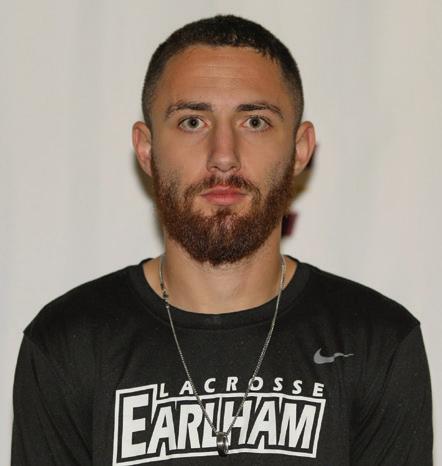

“Without Coach Lanzillo, I wouldn’t be where I am right now,” Upton said. “He celebrates progression even if it’s something small, such as making the correct slide on defense after messing up the first time.”
Lanzillo and Upton both acknowledged early season growing pains, but after an exhilarating win over Anderson University toward the end of the season, and 12 returning players, Lanzillo sees the program going in a positive and consistent direction. His goal is to get the team over a .500 average and shoot for the number two seed heading into conference play.
“The outlook for next year is simple: Be better,” said Lanzillo. “Be better in how we approach the game, how we approach the classroom and how we approach life. You do these things, the outcomes take care of themselves.” ■ Story by Aubrey Everett/Photos courtesy of Earlham Athletics
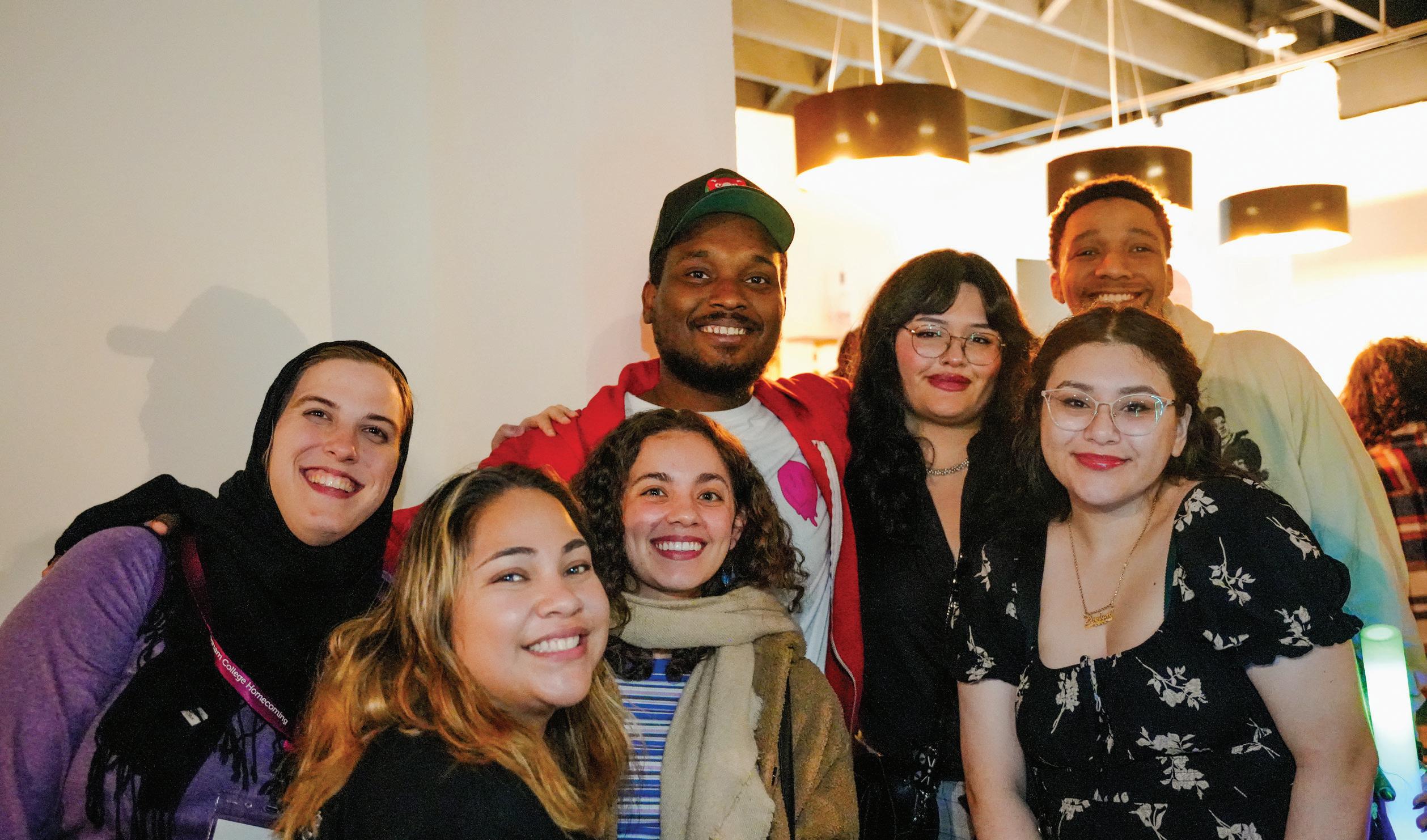
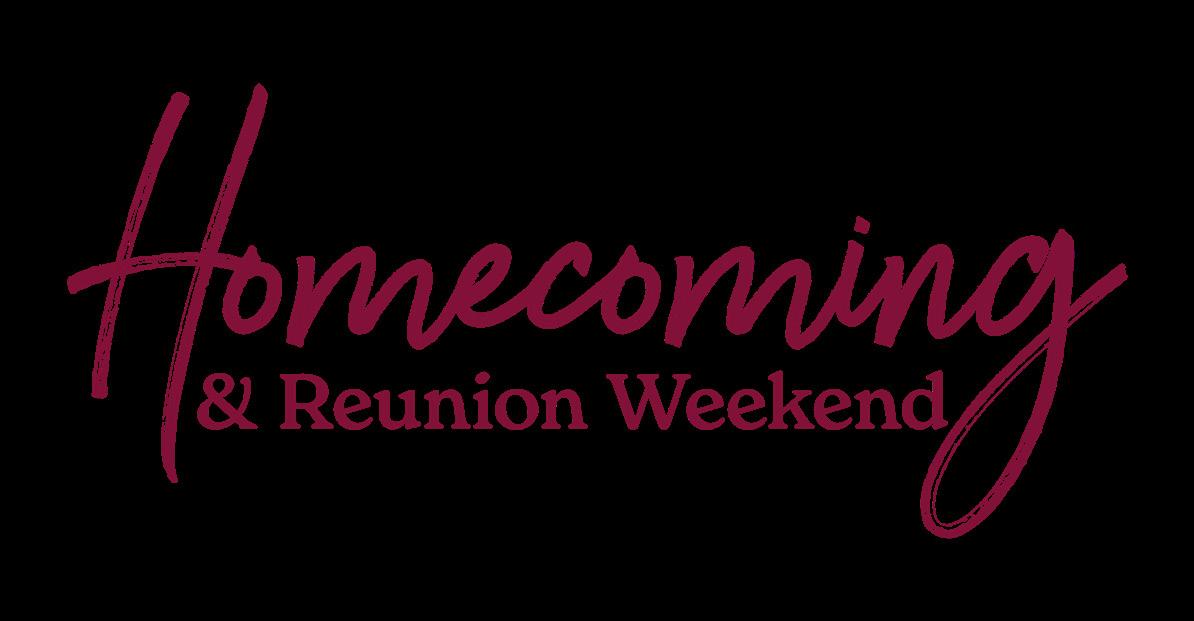
• Special celebrations for baseball alumni, Dance Alloy, Gospel Revs, and Black alumni
• Alumni Awards
• Homecoming Bash
• Student-led tours and mini-classes
• Home athletics games
• Reunions for classes ending in “0” and “5” And so much more!
Can’t make this year’s event? Join us next year Oct. 15–18, 2026 OCT. 9-12, 2025


Congratulations to our 2025 Alumni Award winners and Hall of Fame inductees!
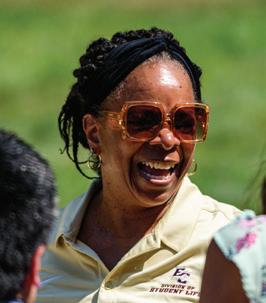
Distinguished Service Award
Bonita Washington-Lacey ’78
Bonita has dedicated over 40 years to Earlham in roles across admissions, student life, and academic affairs. Now serving as vice president of student life and dean of students, she is deeply committed to enhancing the student experience and values the daily opportunity to learn from and support students.
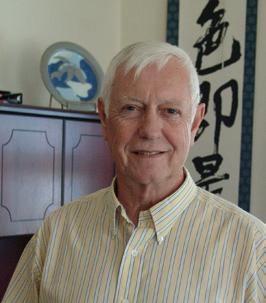
Distinguished Service Award
Len Clark
Len taught in Earlham’s philosophy department from 1967 to 1981 before serving as provost and academic dean for an extraordinary 26 years under six presidents. During his tenure, he chaired numerous academic and community organizations, directed Earlham’s Program for Integral Education, and consulted at colleges nationwide. After retiring, he returned briefly in 2021 as interim dean of the Earlham School of Religion and co-authored Explanation: An Introduction to the Philosophy of Science with Jerry Bakker.
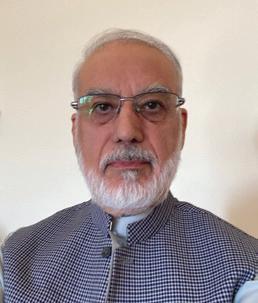
Outstanding Alumni Award
Faizullah
Kakar ’75
Dr. Faizullah Kakar, born on a wheat farm in Afghanistan, came to the U.S. through the American Friends Service Committee, earned his B.A. from Earlham, and later completed a Ph.D. in epidemiology. He left cancer research to lead a university for Afghan refugees in Pakistan, later working with the World Health Organization to establish a disease early warning system and returning to Afghanistan as deputy minister of public health. From 2016 to 2019, he served as ambassador to Qatar and chief of staff to former Afghan President Ashraf Ghani.
Earlham College Athletics Hall of Fame
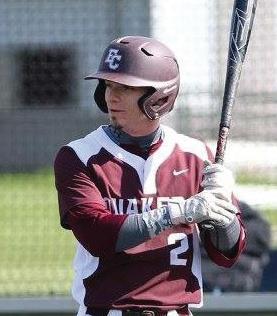
Nate Lynch ’17: Nate currently works in the finance sector of the lending industry as a treasury analyst. Nate graduated from Earlham with a B.A. in business and non-profit management and later went on to graduate from Miami University with an MBA in 2021.

Kevin L. Handley Sr. ’98: Kevin is a dedicated educational leader with over 20 years of experience and currently serves as CEO of the Impact Youth Center in Richmond, offering programs that support youth development and engagement. A Gary, Indiana native, Kevin was a four-year football starter and team captain, later returning to Earlham as an assistant coach and director of multicultural recruitment.
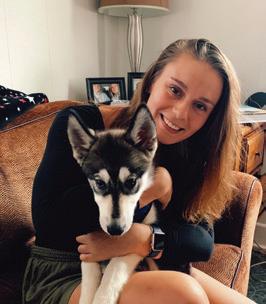
Megan Hut ’16: Megan fulfilled her dream of playing field hockey in the U.S. when she was recruited from the Netherlands to Earlham College, where she played field hockey, studied abroad in Spain, and double-majored in psychology and Spanish and Hispanic studies. She continued her academic and athletic pursuits through Earlham’s Master of Arts in Teaching program, later coaching at The Catholic University of America while earning a master’s in psychological science.
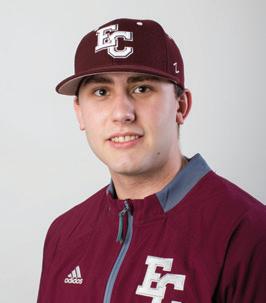
Howie Smith ’17: In 2017, Howie Smith led Earlham College baseball to a historic season, earning Heartland Collegiate Athletics Association Pitcher of the Year honors and helping secure the program’s first-ever conference championship. Howie played a pivotal role in guiding Earlham to its first NCAA Tournament appearance and victory.

Joe Rosner ’74: A standout basketball player, Joe scored 1,432 career points in 114 games, ranking fifth in school history at the time of graduation. He was named All-HBCC, All-District 21, and NAIA Honorable Mention All-America in 1974. As a key starter on the 1970–71 team, he helped lead the squad to a #12 national ranking and a District 21 championship. After 33 years, Joe retired as manager in the maintenance department of an automotive glass fabrication plant in Shelbyville, Indiana.
CLASS NOTES
Send us your news > The deadline to submit entries for the next issue is December 1, 2025. Go to earlham.edu/classnotes to submit yours, or write to alums@earlham.edu. Submissions may be edited for length of other editorial considerations. This issue of Earlhamite magazine includes notes and obituaries received by June 1, 2025.
2012
August Chiarella: I spent the first decade after graduating in fine dining in Manhattan, transitioning slowly out of the kitchen and into more project management roles. My partner and I are celebrating our child’s third birthday this year. We have been living in Seattle for five years. I am the director of operations for the largest doughnut company on the west coast and I smell like doughnuts all of the time. In 2022, I completed my first Ironman with guidance and encouragement from Mark Van Buskirk and will hopefully be completing my second in Cozumel this fall.
1991
Cheryl Price Ochoa: I am very happy to be teaching pre-k and kindergarten in a mixed-age classroom in the first public New York City Montessori school. It is located in Brooklyn and opened in September of 2024. I had been teaching at my previous (traditional) public school for over 17 years, and the change has made a world of difference. I love everything about my new school! My husband (Jose) and I traveled to Ecuador in February and Spain in April. We plan to return to Ecuador this summer with our three adult sons to celebrate my husband’s 60th birthday. We also spend time in Delaware
whenever possible, soaking in the peacefulness. I would be delighted to hear from classmates at jckbilingual@yahoo.com.
1988
DeDe Wohlfarth: I am not good at keeping in touch, but I do recall fondly my close friendships, memorable times and values crystallized at Earlham. Thank you for these! I am a full professor at Spalding University in Louisville, Kentucky, where I have been teaching clinical psychology for 30 years. I love teaching even more than the day I began. I wanted to share the news that the third edition of our textbook Case Studies in Child and Adolescent Psychopathology (Wohlfarth and Morgan) was just published by Waveland Press. Unusual for a textbook, our book is actually interesting and readable. My husband, Terry Scott ’85, and I have four delightful mostly-adults who love international travel (same!) and live with us between trips in an “elastic nest” instead of the theoretically “empty nest.” Keep being filled with radical love, my friends, to counteract the hate in the world.
1985
Elizabeth Groppe: In March, John Sniegocki ’85 received the 2025 Roger A. Fortin Award for Outstanding Teaching and Scholarship in the
Humanities at Xavier University in Cincinnati. John is professor of theology and director of Xavier’s Peace and Justice Studies Minor and co-director of Xavier’s Institute for Spirituality and Social Justice. The award announcement stated: “His students overwhelmingly describe his courses as transformative, even life-changing, praising his teaching for changing the way they understand the world and for giving them the confidence to confront the root causes of human suffering and inequities. As one student wrote, ‘I am grateful not only for the space to learn about and explore these issues, but [for] the fire and compassion that has grown inside me.’ Sniegocki is also a prize-winning, interdisciplinary scholar, recognized for his many essays and articles and for his 2009 book, Catholic Social Teaching and Economic Globalization: The Quest for Alternatives (Marquette University Press).”
1981
Thomas Epps: After working for 41+ years, I finally retired in April 2024. I still marvel how, somehow, I managed to parlay my fine arts with a concentration in theater into a job in software, but as it turns out, when you know how to research and follow up and look for tidbits of info, you’re a very good fit to be a business analyst. In December, we took a trip down
the Rhine. Now that my mom has moved out of Indiana, I am not back home again in Indiana anymore, but still head west to see my mom and sister in Cleveland.
1973
Jim Long: I have been retired for over six years from 35 years of family practice medicine in Beloit and Madison, Wisconsin. While in Beloit I was a team physician for the Beloit College football team for 24 years. My wife and I have three boys, all married, and two grandchildren. We travel (Turkey, Germany and the Netherlands this spring) and bicycle when the weather permits. I keep up on my Spanish fluency, and I audit classes every semester at the University of Wisconsin.
1968
Jo-Martha Alpern Glushko: So glad we have been “tickled” to send updates to classmates/friends. I am seven years retired and sometimes wonder how I got anything personal accomplished during my working years! The quieter life has allowed me to grow unexpectedly in two areas: personally, and by contributing to the town where I live. I have taken up painting in gouache and have enjoyed filling the art education I had never been able to include in my working years. (Sometimes the results are pretty good.) I retired from the town planning department and began participating in clerking for elections; one doesn’t realize all that must go on behind the scenes before, during and after balloting for local, state, federal and “special” elections. Summer and fall have become my favorite times for baking and jamming! Life stays fun and busy.
Barbara Short Sharp: As of May this year, a group of 12 Earlham alumni will be exploring Turkey together as members of a small group tour departing on Oct. 14, 2025. The
tour is 15 days in length, including five days in Istanbul and a trip to the southern coast of Turkey and Antalya. From the class of 1968, the following folks will be on the tour: Gary Kramer, Melinda Gamble Kramer (Mimi), Richard Nakamura, Lyn Splitgaber Kratz, Joel Rabb, Beth Francis Rabb, Lynette Robinson (Lucky), and I, Barbara Short Sharp. In addition, we will be joined by Sandy Butler Nakamura ’67, David Kratz ’67 and Pete Berliner ’69, and his wife Melinda Leonard. Turkey was selected as the destination due to its historic importance and a place where the well-traveled members of the group have not previously visited. We are excited to have this adventure together. Doing group travel by Earlham alums arranged by an alum is unique and shows how some of us have stayed connected over more than a half century!
Lucky Robinson & Randall Shrock: We continue to enjoy our roles as chairs of our amazing class of 1968 and would welcome anyone who would like to join us in this role. We love hearing from and about our classmates. We also want to report that on Earlham Day our class raised $20,900, more than ever before on that day! And it is never too early to begin thinking of how we want to celebrate our 60th reunion in 2028!
Lisl Peterson Stanley Fuson: On July 14, 2024, family and friends of Jeff Fuson ’68 gathered in Farmington, Maine, to celebrate his rich and fulfilling life. He passed on May 19, 2023. It was a lovely gathering of family, including me; sons Josh ’01 and his wife, Sarah Tyson ’02, and Gabe ’04, and his wife Amanda, along with their families; Jeff’s sister, Frances Fuson McQuail ’74 and husband Tony McQuail; brother Michael and his wife Vanessa and their daughters Laurel and Hannah
and their families; brother Douglas’s daughters (Doug had died earlier that year) Adrienne and daughter, and Erica and daughter; and Lisl’s brother Eric Peterson. Long time friends, Jane ’68 and James Parker ’67 were there along with many of Jeff’s friends and former colleagues and patients. The celebration was filled with flowers, instrumental and vocal music, tributes, loving messages, silence, rich memories, funny stories and peace, and was followed by conversation, laughter and goodies! Jeff had had an aortic valve replaced in 2004, and again in 2014, and had been doing well, practicing Family Medicine for 32 years in an independent office with a like-minded partner. Patients loved Jeff’s clear, compassionate style and appreciated the extensive time he comfortably spent with each of them, listening to their concerns, medical and otherwise, and reflecting with them on their healing. He worked four days a week (plus being on call) so he could have a balanced life spending more time with family and other interests, which was a blessing for us all. After moving from his private practice he became the medical director of three nursing homes in Farmington for three years before retiring on his 75th birthday. Jeff thoroughly enjoyed retirement, continuing to work in the woods and area around the house; fixing various cantankerous vehicles; “messing around” in his shop; doing home projects; reading; hiking, camping and traveling with family; singing in a variety of groups with me; and meditating (Transcendental Meditation) which he had started in 1971, and which I started in 1972 and have been teaching over a period of 50 years. During those years in the late 90s and early 2000s we built a home using the building principles of Maharishi Sthapatya Veda, (which predates Feng Shui) and
which comes from the same tradition as Transcendental Meditation, and Maharishi Ayurveda (related to health). Jeff helped design the house with an architect who was trained in Vedic architecture, and, in addition to the crew’s hours, spent hundreds of hours himself building, sanding, painting the house and making the kitchen cabinets. The house took about eight years to complete and is truly a labor of love. I’ll probably spend more time here (the house is redolent of Jeff’s grace and spirit) and then move out west to be closer to Josh and family (Denver, Colorado) and Gabe and family (Oakland, California). My beautiful and lively grandkids are growing rapidly and I want to experience more of their joy in close proximity. I’m beginning to sing more after a long hiatus due to Covid, and to do Tai Chi. I’m also spending significant time meditating each day and clearing out excess items, “collections” of favorite items like marbles, round beach rocks, wooden bowls, antiques, cut glass, silver and items from my mother’s numerous international trips with peace groups, with an eye towards simplifying (sound familiar?!) I would love to have visitors. I have numerous bedrooms. There are lots of beautiful trails and mountains in this part of Western Maine; Portland is less than two hours away, and I would enjoy any contact anyone feels like creating or refreshing. I am grateful for many experiences past, present and yet to come, and am working towards helping create a time of greater understanding, love and peace.
Evelyn Schulte DeOliveira: What’s new? Not much! We’re getting old. I still keep in touch with Kristina Munson ’68 and receive her feng shui newsletter. I enjoy her tips on
decorating, especially the decluttering advice! That’s what I’m up to these days as my English Language students faded away after Covid and online teaching. I still live in Brazil, São Paulo state, with my husband and two cats. Our two sons live in Ohio and Georgia. We saw them and our two grandsons last October at a small family gathering in Ohio. More recently we have visited our Brazilian relatives, in-laws, nieces, nephews and grandnephews. Most are doing fine but some need our help. I was reminded of the week I spent in ’68 training as a VISTA volunteer, when I saw how it was/is to be really poor in America. I quit the program, met my husband who was studying at Purdue, and here we are 53 years later, and the problems of poverty are still the same, everywhere. God bless us all and especially those who help!
Russell and Vicki Poe: Russell and I have done much traveling in Europe via Viking Cruises. We really have enjoyed all of the educational excursions. Vicki has become quite politically active with the local county Democratic party. Just started working as a precinct captain for our area and organized a “Conversation with the Congressman, Mike Kelly” a Republican to take place in August. The format is not contentious or polarizing in contrast to the recent town halls taking place across the country. Russell who retired from his dental practice in 2020 has been working as a part-time (two days per week) faculty member at Lake Erie Dental College. He supervises fourth-year Dental students. It has been a perfect fit for a retired dentist. Russell absolutely loves this position and being able to help new, young professionals become more proficient in their chosen health profession. We also spend lots of time visiting our two
daughters in Chicago and New York and our two grandsons in Chicago. We live a very blessed life and are extremely grateful. Small world tidbit: One of our couple friends in our hometown, Greenville, Pennsylvania, have a child who is a math professor at Earlham!
Alice Almond Shrock and Randall Shrock: We continue to take great joy in our only grandchild, Mira, whose mother is Rachel Shrock ’05. Born February 2023 at 26 weeks gestation and weighing only 1 pound, 4 ounces, she spent her first six months in a neonatal intensive care unit. She is now 26 pounds, healthy, happy, curious, very sociable — and she loves books. We continue to live in our home in Richmond, where we hosted 100 of you for our 50th reunion and 55 of you for our 55th reunion. We hope to welcome you all here for our 60th in 2028!
Priscilla Baker: Greetings from Middlebury, Vermont, where my resistance and protest training at Earlham in 1968 is being put to good use, once again, as I continue to work for universal justice, now through a local Indivisible group. How many of us remember a bus trip to Washington, D.C., in support of the Poor Peoples Campaign, and to visit congressional representatives and Resurrection City? In my local sphere are Earlhamites, Marty Potter ’66 and Don Dewees ’64, Martha Wells Foster ’68, Dee Goldman ’68 and I keep in touch via monthly Zoom visits. Always grateful when my path crosses with other Earlhamites, locally and afar.
Suzanne Johnson: We have downsized to an apartment. So relieved not to take care of a house. Finally minimizing! My greatest joy outside of family is birding.
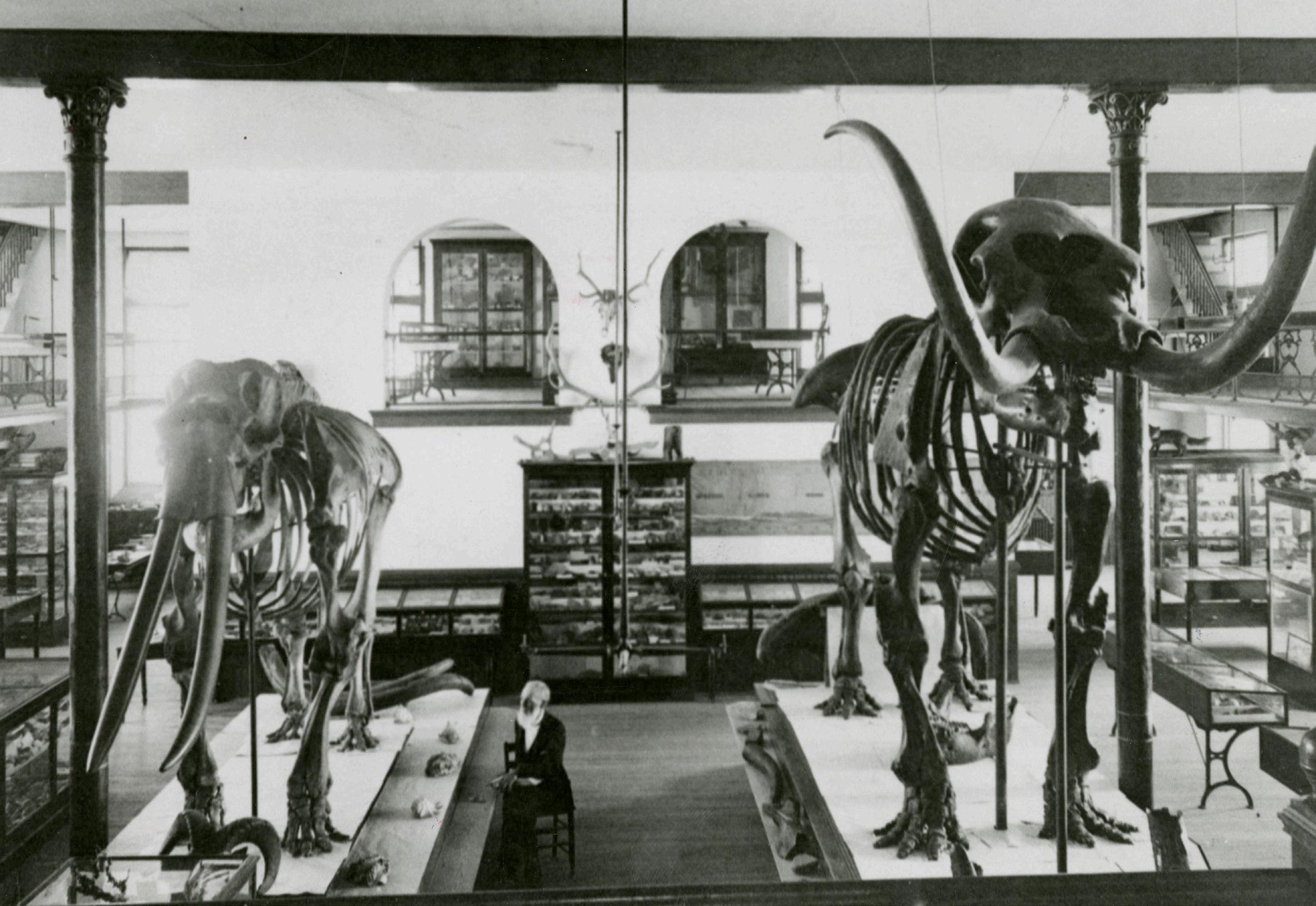
LOOKING BACK
Joseph Moore in the Museum, 1900
Former Earlham President Joseph Moore sits beside the elephant skeleton that was lost when Lindley Hall burned in 1924. The repaired mastodon still demands attention at the rebuilt Joseph Moore Museum today.
Frank Pierson: Since I finished my book about my community organizing career with the Industrial Areas Foundation, I’ve continued to write. My format of choice these days is publishing on Substack at frankpierson.substack.com. It’s all about the Arizona town I live in with my wife Mary Ellen Kazda. In my Substack, I try to capture stories that reflect the politics, institutions and personalities of Oracle, Arizona locals.
Angela Farrow: My Earlham education and ethos have been fundamental through careers as a teacher, nurse and doula, and most importantly as a parent and community volunteer. We are blessed with four grown children and our 12th grandchild is due in June. Plymouth,
Michigan, has been our beloved home for 47 years.
Doreen Dimick Peterson: After a wonderful Christmas with all of our family at our home in Wisconsin followed by a nondescript winter, Bruce ’68 and I were lucky enough to get away the first week in March. Bruce, who has always enjoyed woodworking, wanted to visit Colonial Williamsburg — the Anthony Hay Cabinet Shop in particular but also some of the other working shops. Fortunately, our daughter, Sarah Dimick Gray ’94, had that week for spring break and offered to come along and organize the trip. Since Bruce has some mobility issues, the extra help was more than welcome. We packed in a few family visits on somewhat of a circle tour, first visiting Bruce’s
brothers in Ohio on the way. After two days exploring Williamsburg, we spent a cold day in Washington, D.C., visiting the Vietnam Memorial and warming up in the Smithsonian. The day was capped off with dinner with two of our grandsons, Alex Eastman ’23, and Flynn Gray, a junior at American University. Alex is working as Great Lakes Program Manager for the Northeast-Midwest Institute in Washington, D.C. On the way back we went through Richmond, giving us an opportunity to visit our daughter and son-in-law, Becky ’97 and Eric Dimick Eastman ’96. Even their son, Ted ’27, a busy sophomore in engineering at Earlham, had a moment to say hi. We welcome any Earlhamites passing through central Wisconsin to come visit us at Camp Dimick.
1957
Alan Wanderer: I would like to announce publication of my new book on Amazon:
ATRIAL FIBRILLATION: How a Physician Converted His Atrial Fibrillation to Normal Heart Rhythm with a Low-Risk, Low-Cost Protocol. The book journals data over two years documenting conversion of my atrial fibrillation with development of a protocol supported by underappreciated scientific observations. In essence it describes an alternative therapeutic intervention with scientific based administration of select ideal supplements (magnesium and potassium) and includes emphasis on self-monitoring my electrocardiograms three to four times daily to detect conversion of AF or recurrence of AF. Other important features include maintaining hydration and potassium balance. The book is written to describe my heart history as a resource and to encourage individuals with AF about my success with a low-risk therapeutic option, AF is the most common heart rhythm abnormality with serious medical consequences including strokes, heart failure and dementia. It was also written with citations for the medical profession. Lastly it emphasizes if AF individuals are interested in implementing my protocol, they need to involve their health care professional for guidance.
The Office of Institutional Advancement needs your help finding information for several alums not currently in our records. Visit earlham.edu/lost-classmates to see if any of your friends are on the list.
Alumni
Alison Patton
1982
Steven Fricke
1979
Stephen Joseph
1975
Daniel Liston
1973
Frank Robbins
Laura Sessions Stepp
1972
Anne Ward
1971
Mary Link
John Ohlrogge
1967
Charles Fuglister
1966
Hugh Shirato
Tom Fourman
Anne Ogren
1964
Marilyn Holmes
1963
James Mills
1962
Joan Sakalas
Stephen Comar
Suzanne Ruch Jenkins
1961
Philip Catey
1960
Jean Forshe Datta
Mark Zola Segal
1958
Idelle Weierbach
James Paton
Grace Chawner Bowles
1957
Joseph Rhoads
1956
Stanley Gaw
1955
Shirley Castelluccio
1953
Marilyn Williams
Buford Jones
Delores Richards
more online
Obituaries are available online at earlham.edu/obits.
UNLOCK A $1,000-A-YEAR SCHOLARSHIP FOR FUTURE EARLHAMITES
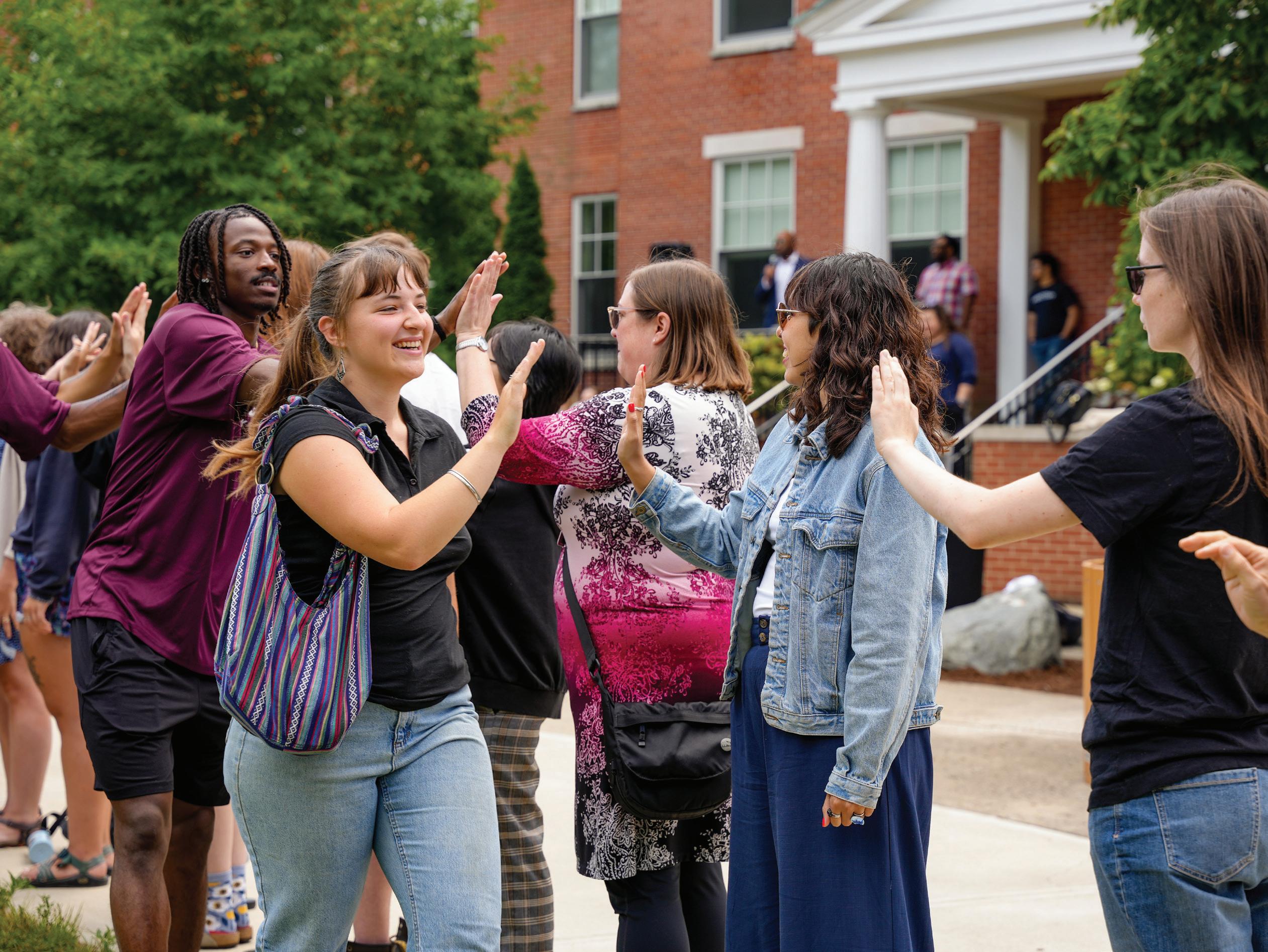
Know any students who’d thrive at Earlham?
Nominate them for the Alumni Referral Scholarship, and they’ll receive $1,000 per year if they choose Earlham! Nominations are open for students in grades 7-12. High school seniors must be nominated by Nov. 15 before their fall entry term.
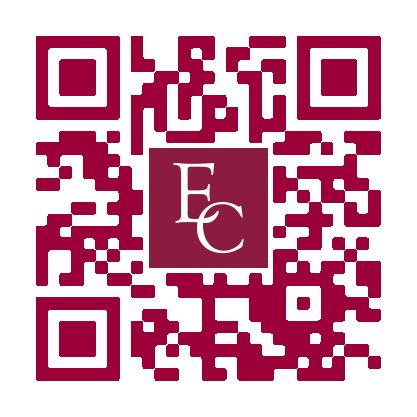
Nominate today! Submit your nomination at earlham.edu/alumni/ referral-scholarship
I’ve carried a lot from Earlham, but one thing that has never left me was a talk by Earlham School of Religion founder Elton Trueblood at my freshman convocation. He spoke about ‘love of the difficult’ and how anyone can have easy conversations. Howard Richards, another professor whose teaching had an influence on me, challenged us to ‘engage the problematic.’ You don’t just ride along. You lead. You confront. That’s stuck with me through every hard conversation about some contentious matter, every tough moment in life. That’s what I think about when I think of Earlham excellence.
–
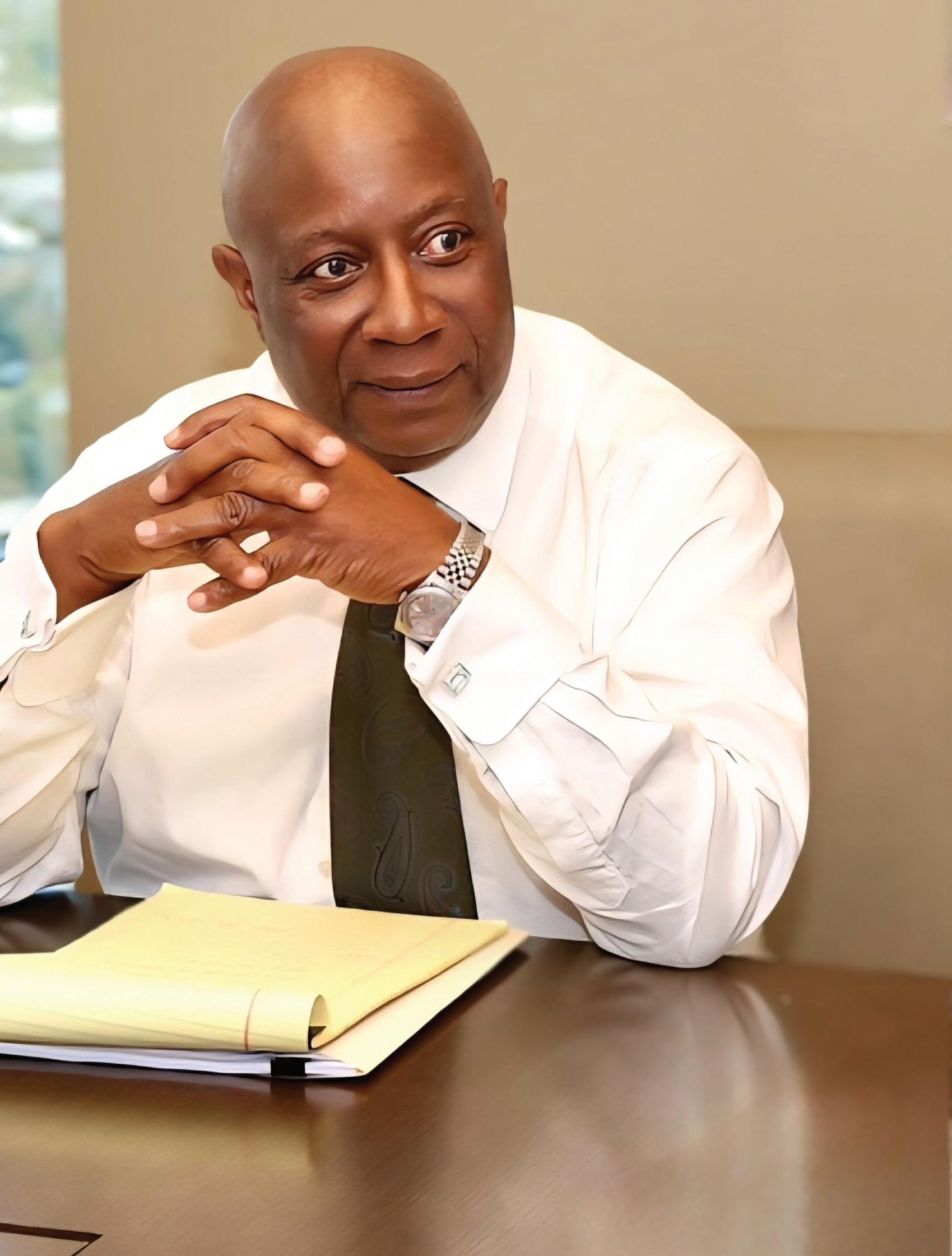
Fred McClure ’84 is a shareholder at Trenam Law, one of Florida’s largest law firms. He is an experienced single plaintiff and class action defense trial lawyer with a concentration in complex product liability, consumer protection, employment, commercial law, insurance coverage and bad faith litigation. McClure is also a certified Florida Supreme Court Circuit Mediator; a U.S. District Court, Middle District of Florida Mediator; and Qualified Court Appointed Mediator. He serves as Vice-Chair of the Earlham Board of Trustees.

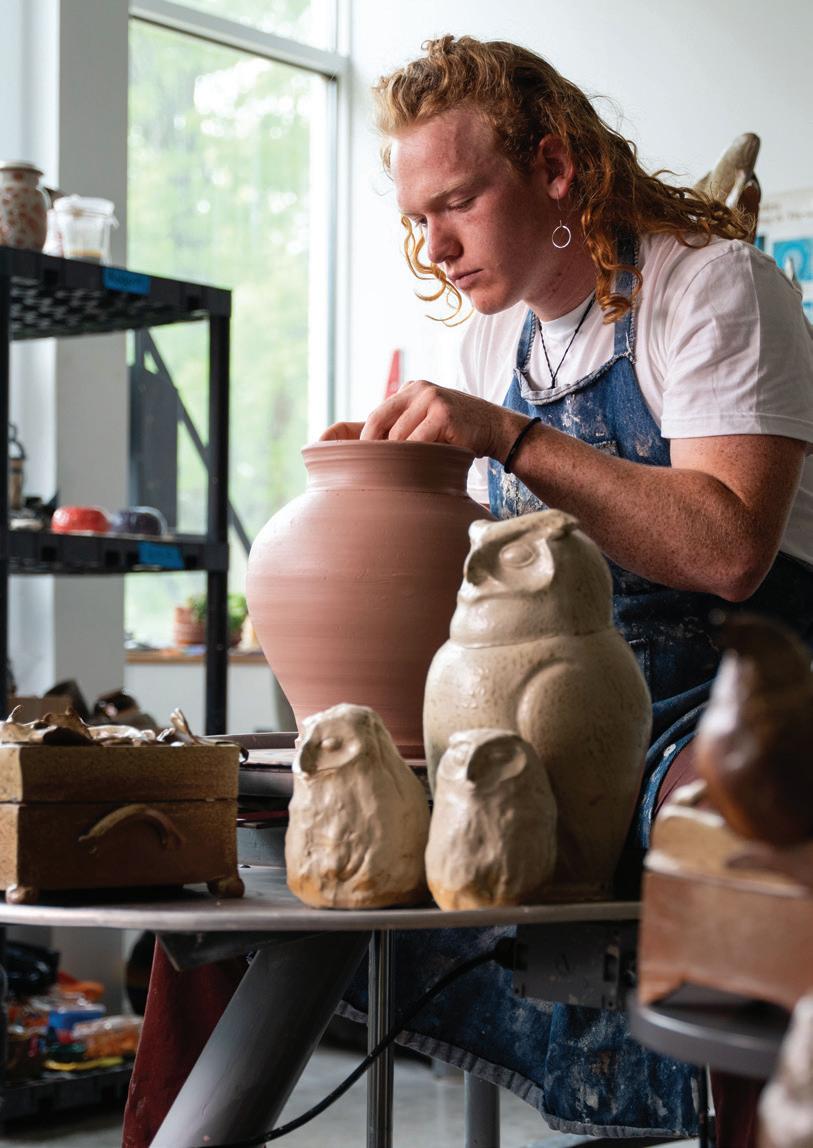

801 National Road West
Richmond, Indiana 47374
